

Safari vs. Chrome: Which browser is better for iPhone and Mac?
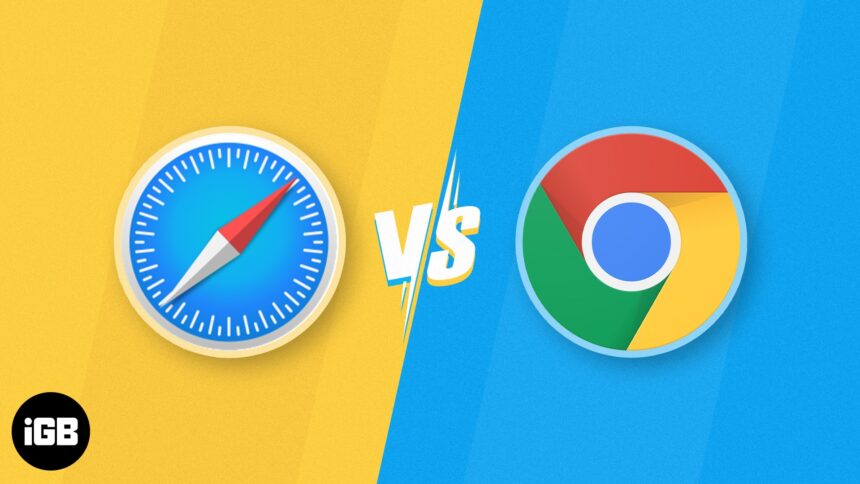
Choosing the right web browser for our devices is essential for productivity and efficiency. Safari and Chrome are two popular choices on Apple devices, each with strengths and weaknesses. In this blog, I will compare Safari vs. Chrome to help you decide which browser is better for your iPhone and Mac. Let’s dive into the differences!
Safari vs. Chrome – User Interface
Safari is designed to blend seamlessly with Apple’s ecosystem. Its sleek and intuitive user interface ensures a clutter-free browsing experience. Besides, it offers group tabs management for organizing your browsing. So you can easily focus on the content.
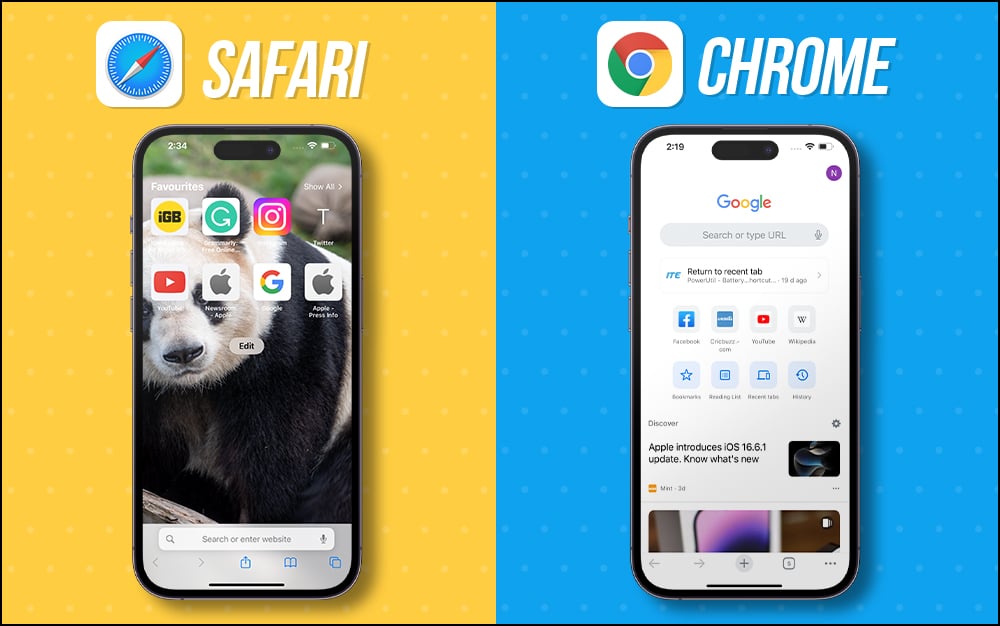
Chrome’s UI is user-friendly, with a familiar interface across devices. It lets you personalize your browsing experience with various themes, extensions, and add-ons. Nonetheless, this added flexibility might come at the cost of a more cluttered than Safari.
Therefore, both Safari and Chrome have strong UI aspects. But the winner depends on your preference for minimalism (Safari) or customization options (Chrome).
Safari vs. Chrome – Ease of use
Safari is the default browser on Apple devices. So, it offers seamless integration and synchronization with other Apple services. The intuitive gestures make it easy to navigate and use the browser effortlessly. With Smart Search, you get more relevant results without going through multiple websites. Additionally, you can quickly autofill your passwords and verification codes, saving time and effort.
With its widespread popularity, Chrome ensures a consistent experience across different platforms. The synchronization with Google accounts, bookmarks, and history is convenient for users already within the Google ecosystem.
If you own both Apple, Android, and Windows systems, Chrome will be your go-to browser. However, I only have Apple devices, so I prefer Safari to take up the work where I left it. Also, Safari allows me to create profiles to keep my personal and professional browsing separate.
Safari vs. Chrome – Performance and speed
As Apple optimizes Safari for its devices, it often outperforms Chrome regarding speed and battery efficiency. Safari’s performance is particularly notable on iPhones and Mac devices. I have experienced smoother browsing and longer battery life using Safari.
Chrome has made significant improvements in performance over time. However, it can still be resource-intensive, especially on older devices. While it performs well on Mac, it might not be as efficient on iPhones as Safari.
Safari vs. Chrome – Security
Apple strongly emphasizes user privacy and security. So Safari has built-in Intelligent Tracking Prevention and strong sandboxing. It also warns against unsafe websites, ensuring a secure browsing environment. Moreover, you may hide your IP address for data protection. With iOS 17, Safari automatically removes tracking parameters from URLs .
Google’s Chrome also focuses on security, with features like Safe Browsing and automatic updates. Besides, you may save your passwords securely and access them on any device using Chrome Password Manager . However, its ties to Google’s services raise data collection and privacy concerns.
Safari vs. Chrome – Privacy
As mentioned earlier, Safari prioritizes user privacy by blocking cross-site tracking and preventing advertisers from collecting user data. It also includes a “ Privacy Report ” feature to get insights into trackers blocked on visited websites. Besides, you can lock your incognito tabs for more privacy.
You can use Hide My Email to create unique, random email addresses that will forward messages to your inbox without revealing your actual email address. Also, you may create or delete as many addresses as needed to enjoy greater control over who can contact you.
While Chrome offers some privacy controls, it cannot match Safari’s level of privacy protection. As part of Google’s business model, Chrome collects user data to improve its services, raising concerns for privacy-conscious users.
Safari vs. Chrome – Customization
Safari’s customization options are relatively limited compared to Chrome. You can only customize the Safari start page and a few website settings. While you can install some Safari extensions , the selection is not as extensive as in Chrome’s Web Store.
Chrome’s extensive Web Store offers a vast collection of extensions, themes, and add-ons that allow users to tailor their browsing experience to their preferences.
Additional features
Safari offers Reading List , Listen to Page, PiP mode , and Handoff features to enhance the browsing experience. Also, it has a built-in PDF conversion tool to convert any webpage into a PDF. This is pretty convenient to save web pages. Besides, you can quickly share your password with family members without explicitly sharing them.
Chrome’s additional features include Google Assistant integration, cross-device synchronization with non-Apple devices, and easy access to Google Workspace. Another standout feature is the feature to do a reverse Google search on any image instantly.
Which browser is better for iPhone and Mac?
Choosing the better browser between Safari and Chrome for your iPhone and Mac depends on your priorities and preferences. Safari is ideal if you value seamless integration within the Apple ecosystem, strong privacy protection, and optimized performance. However, Safari is only limited to Apple devices.
On the other hand, you may prefer Chrome if customization options, a wide range of extensions, and additional features are more important to you. Therefore, if you want to use Chrome on your Apple devices, you may change it on your iPhone and Mac .
Ultimately, whatever you choose, both browsers will provide a satisfying browsing experience on your Apple devices. Which browser is your favorite? Let me know in the comments below!
Explore more…
- Best web browsers for Mac
- 40+ Safari tips and tricks for iPhone
- Safari crashing on Mac? Easy ways to fix it!
🗣️ Our site is supported by our readers like you. When you purchase through our links, we earn a small commission. Read Disclaimer .
Leave a Reply Cancel reply
Your email address will not be published. Required fields are marked *
Save my name, email, and website in this browser for the next time I comment.
- Online Security
- Safari vs Chrome in 2024: Performance, Speed and Features Compared
Cloudwards.net may earn a small commission from some purchases made through our site. However, any earnings do not affect how we review services. Learn more about our editorial integrity and research process .
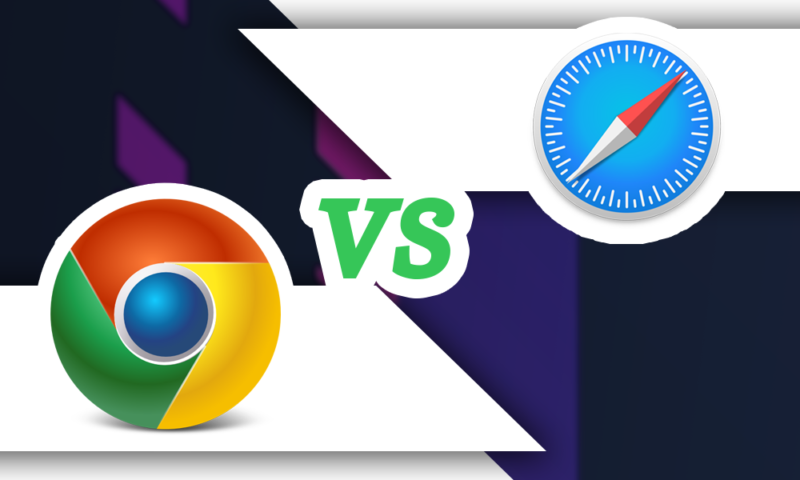
Safari and Chrome are two of the biggest players in the browser world. While Safari comes ready-to-go on Apple devices, that doesn’t mean it’s the best option — especially as Chrome is often touted as the best browser out there. See who wins in our Safari vs Chrome comparison.

Last Updated: 01 Feb'24 2024-02-01T09:54:22+00:00
All our content is written fully by humans; we do not publish AI writing. Learn more here.
It’s that time of year again where we put two of the most famous browsers in our virtual boxing ring for the battle of Safari vs Chrome. All Mac users will be familiar with Safari; it’s the default browser for Mac devices and iPhones.
However, just because Safari comes pre-installed by default, that doesn’t mean it’s necessarily the best. With applications available for the Google Chrome browser on both Apple desktops and iOS, you might be wondering if you should make the switch.
Key Takeaways:
- While Safari and Chrome are both decent browsers, Chrome’s vast library of extensions and customization capabilities means it’s a slightly better choice
- In the battle of performance, Chrome also comes up tops, offering better speed and graphics execution
- The only round where Chrome lags a little is privacy and browsing data collection, which is why we advise using this browser in conjunction with a VPN
To help you decide, we’ve done a bit of research for you, comparing Safari and Google Chrome across Mac and iOS to see which one is better. If you’re not a Mac user, then this article won’t be one for you, so we suggest you check out our Microsoft Edge vs Chrome review for Windows devices instead.
Cloudwards completed a fresh comparison of Safari vs Chrome. Since our last review, Chrome and Safari have remained relatively unchanged, making for a neck-and-neck race.
Safari vs Chrome: Rounds & Criteria
Our showdown between Safari and Google Chrome will take the form of five rounds, each focused on a different strength: features, ease of use, performance, security and privacy.
At the end of each round, one browser will come up tops and earn a point. Whichever of the two browsers scores three points overall will be the final winner. Is Chrome better than Safari? Let’s find out.

1. Features
First up in our Google Chrome vs Safari showdown, we’ll explore each of the browser’s features. It’s fair to say that Safari and Google both cover the basics of a good browsing experience pretty well but, in this day and age, most of us want more than basic functionality. Native tools, customization and extensions were all things we considered in this round.
Customization
Safari is pretty minimalist in design and functionality. While you can customize the look and feel of the browser on Mac, your options are limited. For example, you can change the background of the Safari home screen, but not the overarching color and theme of the desktop.
By contrast, Google Chrome gives you a lot more options. You can choose from over 24 color themes, or even customize your background with an image of your choice. It’s a similar story over on the mobile applications for both.
Safari’s home screen feels minimalist and static, while the Google Chrome mobile device app offers higher levels of customization. You can, for example, set your homepage to show you the latest trending news from Google News.
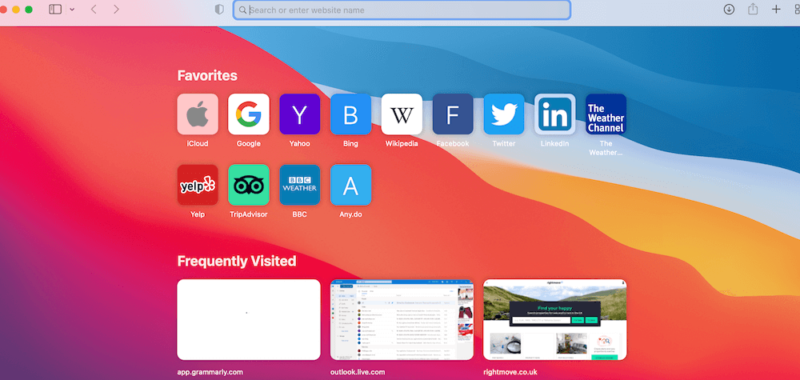
Google Extensions vs the Apple Ecosystem
Google Chrome also leads when it comes to extensions. Like Firefox, the Chrome extensions library is huge, varied and offers lots of applications for free. Read our Chrome vs Firefox review here .
Safari’s library of extensions, in comparison, feels relatively limited. While you can access big names like Honey and 1Password, you’ll also find that a lot of applications aren’t compatible with Safari.
This is especially true for VPNs. Right now, none of the top VPN providers offer a browser extension for the latest version of Safari, but they do for Google Chrome. In essence, Chrome offers much more expandability and customization than Safari.
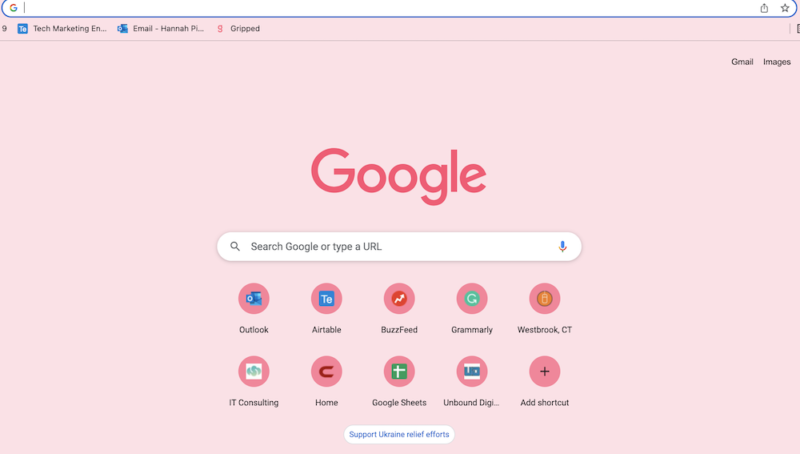
Syncing
Both web browsers offer solid syncing features. We like how Safari works in conjunction with a range of Apple features to offer a seamless browsing experience across all Apple products.
Combined with iCloud sync and Apple’s iCloud keychain software, you can move from your iPhone to your iPad to your Mac laptop without your browsing experience being interrupted, and your browsing history will also save automatically. Here’s the lowdown on how to get started with iCloud .
Safari also integrates into Mac’s other applications by default. So, if you use Mac apps like Apple Mail, Apple Calendar and iMessage, you’ll experience excellent continuity. We also like how, with compatible websites, you can use Apple Pay to pay for online shopping.
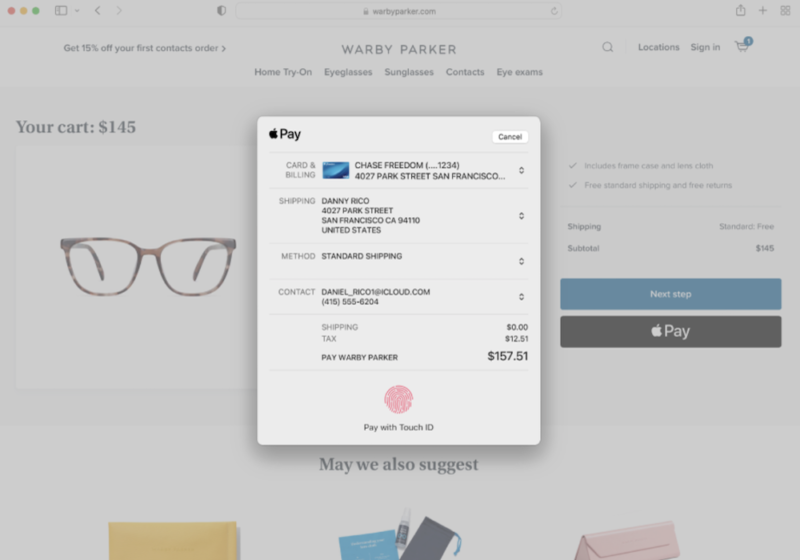
Google Chrome, though, also performs well on the continuity front. If you have a Google account, you can also sync your browsing experience across your other devices. While Google Chrome doesn’t enable Apple Pay, it has its own option — Google Pay — which you can enable for a faster payment experience.
So, Google Chrome and Safari are pretty much neck and neck when it comes to features but, with its greater levels of customization and vast library of web extensions, Google Chrome takes the lead in this round.
2. Ease of Use
Both Safari and Google Chrome are straightforward to use on desktop and mobile devices, so in this round, we analyzed which user interface felt more pleasant to use. Across iPhone and Mac, Chrome takes a slight lead here.
Safari’s user interface is minimalist and easy to get your head around. The search bar is at the top of the screen on both desktop and mobile. The home screen is then decorated with widgets showing frequently visited websites, favorite websites and suggested reading based on your browsing experience.
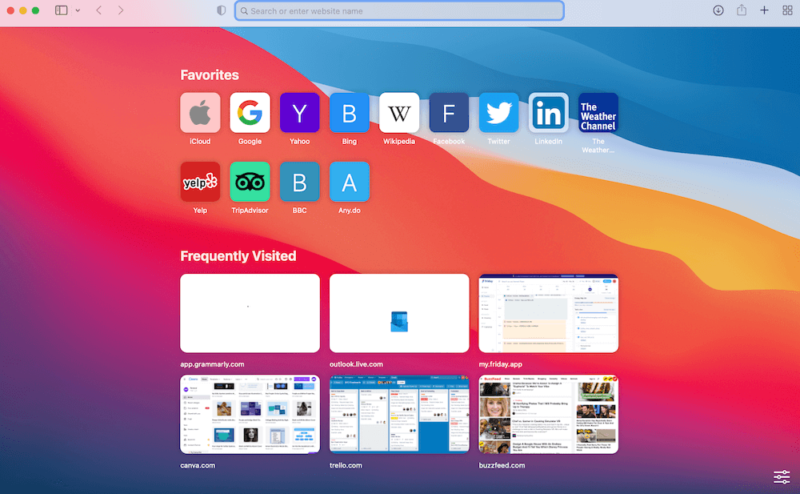
The experience is satisfactory and we also like how, if you open multiple tabs, you can click the four-square icon in the top right-hand corner of the browser to zoom out of all your open web pages, so it’s easy to find what you need.
Chrome is also really easy to use. The homepage — unless you change it — features the famous Google search bar, along with frequently visited websites below it. There’s also widgets in the top right-hand corner of the page, which give you quick access to Google applications like Gmail, Google Drive, Google Photos, Google Translate and YouTube.
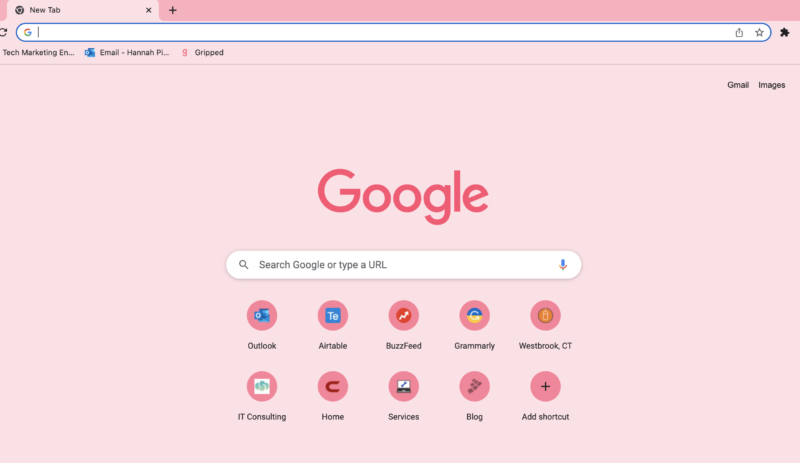
In terms of finding bookmarks, Google Chrome’s bookmarks are more seamlessly integrated into the browser, showing as small widgets below the search bar at the top of the page. To show bookmarks in Safari, you have to either manually click the bookmark tab in the control panel or enable the bookmark pane, which is quite big and invasive.
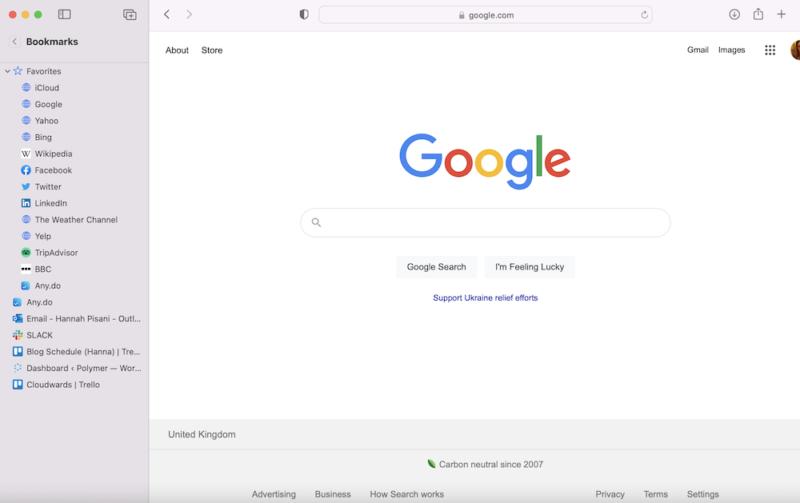
Overall, while both are easy to use, the Google Chrome browser feels a bit more dynamic and user-friendly than Apple’s browser.
3. Performance
We’ve come to what is arguably the most important round: the Safari vs Chrome speed test. We performed a benchmark test using Speedometer 2.0, JetStream 2 and MotionMark to compare Safari vs Chrome performance.
We used a MacBook Pro with 16GB of RAM and an Intel Core i5 CPU running at 2 GHz to run these tests.
Benchmark Test Results
When it comes to speed, Chrome is the clear winner, reading 122.5 compared to 113.8 on Safari. While both are respectable scores, Chrome is undoubtedly the faster option.
On JetStream, the tables turned. Safari’s reading was 125.705, putting it in the lead as Chrome’s score was 118.675. JetStream tests a browser’s ability to deal with complex JavaScript workloads. This indicates that Safari will perform better when executing complex applications — but only marginally.
The last test we performed was MotionMark, which analyzes how the browser handles complex graphics. Chrome really shone in this test, coming in at 403.6 to Safari’s 356.31. This means that Chrome’s user experience and responsiveness outperforms Safari.
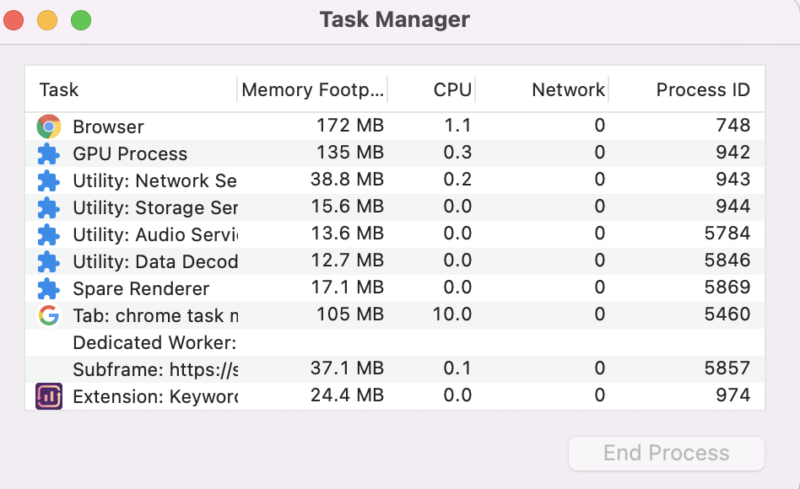
One thing worth noting is that Safari is a more lightweight browser than Chrome. While it might not be as quick, Safari is more economical for iOS and Mac performance than Chrome in terms of battery life, especially with multiple tabs open.
Despite this, with Chrome winning on two out of three of these mini rounds in the Safari vs Chrome benchmark test, it’s fair to say that Chrome is the overall winner when it comes to performance.
4. Security
Both Safari and Chrome use Google’s Safe Browsing database to keep users safe from phishing and malware. They also both offer password management functionality.
If you use Google’s password manager or Safari’s iCloud keychain, you’ll also benefit from dark web monitoring, a feature that uses data analytics to alert you to the exposure of your passwords and email addresses in data leaks and breaches.
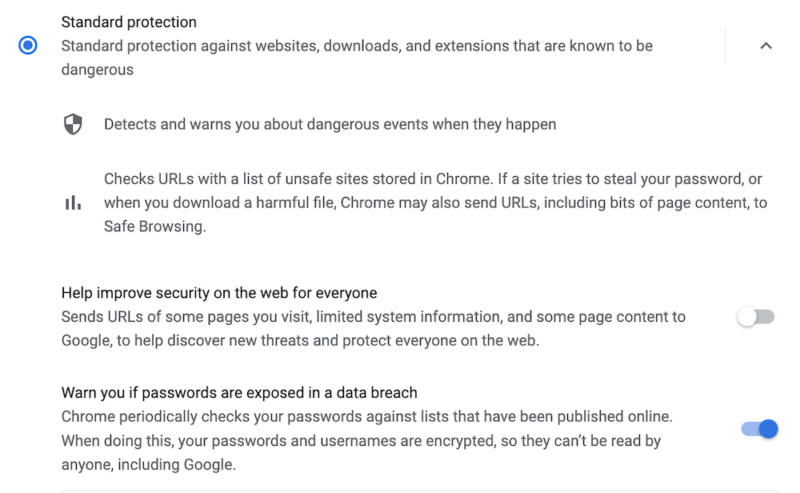
Despite these similarities, Chrome slightly takes the lead in terms of security features. We like that Google sends out frequent browser updates for Chrome, ensuring regular patching from potential vulnerabilities. Safari’s updates, by contrast, are much more infrequent.
Over the last few years, Google has gotten in trouble with data privacy regulators numerous times for its use of cookies and improper collection of personal data. Apple, by contrast, has managed to stay out of the headlines for these reasons.
We’ve taken an in-depth look at the best browsers for your privacy , which you can take a look at here.
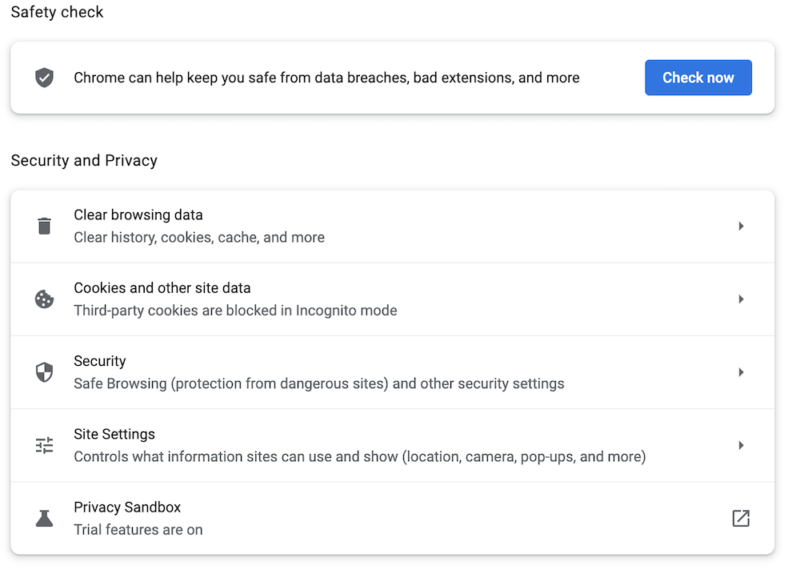
While Google appears to have learned from its mistakes and is taking steps to bolster user privacy, Apple takes the lead in this round. We like that Safari features a dedicated “privacy report” feature, which shows how the browser is protecting you from online profiling and cross-site tracking through its intelligent tracking prevention software.
Chrome also offers a “privacy checkup” function, but it’s far less granular than Safari. Also, by default, your privacy isn’t prioritized. Google automatically enables personalized ads, as opposed to blocking them. Incognito mode, as always, doesn’t do much do actually protect your privacy.
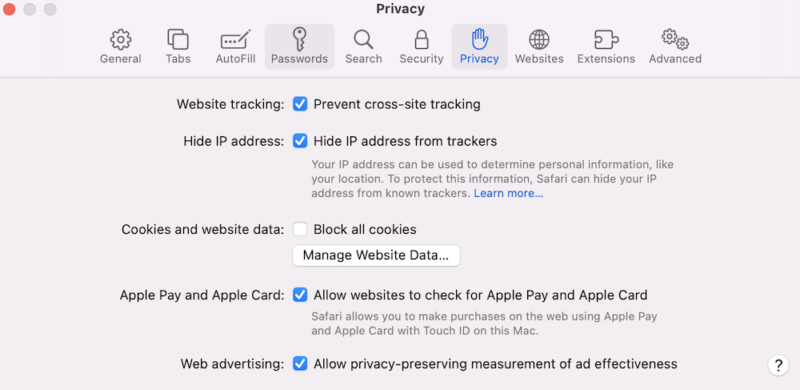
This makes sense, as advertising is such a huge part of Google’s business model, but it means that you should probably use a VPN in conjunction with Chrome. For this reason, Safari wins this round.
The Verdict
Ultimately, Safari and Chrome are both solid browser choices. For iPhone, iPad and Mac users looking for simplicity and deep integration across the Apple ecosystem, Safari is a good choice — and comes ready to go.
However, it’s also well worth downloading Chrome and setting up a Google account if you haven’t already. Chrome is a leading browser for a reason. It’s fast, easy to use and comes with unparalleled customization options.
Because of this, Chrome is our ultimate winner, but we do recommend you use it in conjunction with a VPN to ensure your online privacy.
What are your thoughts on the battle between Chrome vs Safari? Do you agree that Chrome is the better browser overall, and why or why not? Let us know in the comments. Thanks for reading!
Both Safari and Chrome are good browser choices for Apple users. However, Chrome takes the lead over Safari in terms of performance, ease of use and customization, making it a better all-round browser choice.
Safari and Chrome are both secure, and Safari actually uses Google’s Safe Browsing database. They are pretty much neck and neck when it comes to privacy and security, but if you’re concerned about your online privacy, we’d advise using a VPN.
Probably not. If you’re using Chrome, then Safari won’t offer you anything that you haven’t got already.
Great comparison, and I agree chrome wins in most everything. Review is missing a critical comparison, power consumption.
You mean on mobile?
I have win but I haven’t received any thing
I am pretty sure he means you didn’t include power consumption for desktop and mobile.
I use Safari because of the battery life and performance being pretty good. It does lack a robust extension store and isn’t cross platform outside of Apple’s OS ecosystem. Chrome has a significant market share on Mac OS because its cross platform and updates better if security is a priority for you. Safari lags in updates due to being tied to OS updates. WebKit is open sourced but mostly developed by Apple and is a fork of Chromium/Blink which Google and most other browsers use. Firefox is an option as well, but its always been slow and battery hungry as well.
Blink is actually a fork of WebKit, not the other way around.
fyi chrome uses safari’s rendering engine on iOS (as they’re not allowed to do otherwise) so speed is the same on iOS.
Firefox is much better nowadays in terms of performance and battery consumption (on MacBooks).
I Think Chrome is the browser with more day to day security and updates, for years I was a fan of Google Apps, but the fact that all of its apps are so resources’ hungry is annoying, I recently upgraded to 12GB RAM on my MacBook and the more RAM I add to my system the more RAM it uses, it’s incredibly annoying, when Safari handles everything faster with its simpler yet powerful and tidy design, using about 1/4 or less of the RAM used by Chrome, using the same websites, and the same amount of tabs open at the same time. Once I finish transferring my files from Google Drive I’ll switch everything to iCloud, it’s the way to go on a MacOS System.
Antonio, Please explain your like of Icloud. It’s the biggest annoyance.
It’s syncs seamlessly across all your devices – you can access them anywhere you can connect to the internet. It’s smart and even anticipates your needs, based on your file/folder usage behaviour.
If you’re finding it a massive annoyance then I imagine you’re *expecting* it to behave like Dropbox or Google Drive when that’s not what it was ever designed for.
Most people who find it frustrating do so because they don’t understand its purpose – I admit I fell in this camp for several years myself!
Took me years to realise that if you’re a Mac user, it’s pointless paying for eg 2TB of iCloud storage, if you don’t have 2TB of storage locally on your Mac. It’s not a storage extender like an external HD. It essentially replicates what’s on your Mac.
Not an ad, and am no way connected to him, but the ‘MacMost’ YT channel is an excellent free resource for both newcomers to Mac and experienced hands. Gary, the chap who runs it, has been around forever and watching his tutorial videos is like being taught by a friendly uncle. He has a rich, searchable back catalogue (with several on understanding iCloud!)
Regarding Chrome, I still love it – chiefly because of the vast library of extensions. I have 105 installed, but I’ve become far stricter about not keeping them all switched on all the time. I generally have about 12-15 on constantly; the rest I toggle on and off just when I need them. Seems the best of both worlds to me.
Chrome on iOS is more performant by safari. That is because, if you can choose safari, you have iOS. On iOS, chrome is always faster because it uses the same browser engine, webkit, with its own code to make it faster.
If you are on an Android phone with Google sync all across Google & Android products, Chrome is the winner!
The security on safari seems a little more liable other wise both are best but customisation wise chrome is a bit good
Liable to whom, and for what exactly? Or do you mean reliable? I’m unsure… Liable means legally responsible – do you mean Safari is run in a more legally compliant way? Please can you elaborate? Thanks
I reverted to Safari after I found that I couldn’t get a reader mode with Chrome for my iPhone and iPad.
Insert/edit link
Enter the destination URL
Or link to existing content
- The Best iPhone VPN in 2022: Protect Your iOS Mobile Device
- Kape Technologies Buys ExpressVPN: What You Need to Know in 2024
- 2024 VPN Speed Comparison: 7 VPNs Tested for Upload, Download and Latency
- What Is ExpressVPN Aircove Router & How Does It Work in 2024?
- 10 Reasons Why Parental Control Is Important in 2024 and Reasonable Ways to Guard Your Child’s Online Activity
- The 7 Best Parental Control App Options for 2024
VPNoverview.com Internet Safety Secure Browsing Safari vs. Chrome in 2024: Which is the Safest Web Browser for Mac?
Safari vs. Chrome in 2024: Which is the Safest Web Browser for Mac?
Safari vs. Chrome are two of the most popular browsers in use today. The question is: which one values your privacy more ? To understand where each browser stands, our review team at VPNOverview tested both, specifically focusing on four key areas:
- Performance
- Ease of use
- Data privacy
The results were tighter than you may have thought. While there’s obviously a very subjective element to this, we put each browser through its paces and tried to be as objective as possible.
Whether you prefer Safari or Chrome for daily use, using a VPN can make your browsing experience safer and more private. We recommend NordVPN as the best VPN, and it works just as well with both Safari and Chrome.
For a full understanding of the tests we performed and the features we looked at, check out our Safari vs. Chrome comparison below!
In the age of digital warfare, where your every click and scroll can be a battleground, choosing the right web browser is more crucial than ever. Safari and Chrome are two of the most commonly used browsers today.
As privacy concerns mount and data breaches become increasingly common, we pit these two titans of the browsing world against each other, examining their strengths and weaknesses to help you confidently navigate the treacherous online landscape.
Which is the best browser for Mac? Which is the safest web browser between the two? The results might just surprise you.
Safari vs. Chrome: Functionality and Feature Comparison
Safari vs. chrome: which browser is more secure.
It’s important to have a browser that keeps you secure online. An unsecured browser can expose you to keyloggers, malware, and other online threats.
With this in mind, the first stop in our Safari vs. Chrome comparison was to look at security. We considered points including:
- The frequency with which both Google and Apple fixed security flaws
- Whether each browser can help you to detect and avoid security risks
- How each browser managers your passwords and other credentials
- Any other added functionality, such as dark web monitoring
So, let’s look at how each browser can help to keep you secure.
1. Malicious website detection
Safari and Chrome both make use of Google’s Safe Browsing database . Think of this database as a dictionary of malicious web resources. Safari and Chrome reference the database to check whether you visit a safe website.
If you navigate to a website listed in the database, you’ll see a warning . While you can choose to continue, we recommend you follow the recommendations and steer clear. These websites can use social engineering tactics, like phishing, or install keyloggers and other malware onto your device.
Both Safari and Chrome also indicate when a website is HTTPS secured. Look for the little padlock icon in your browser’s URL bar. With all of the above in mind, Safari and Chrome are essentially tied to security at this point .
2. Password management
Dedicated password managers are a great solution because they can be used on multiple devices. But both Safari and Chrome have a built-in way to manage your passwords. On Safari, you can access Apple’s Keychain, while on Chrome, you can use Google Password Manager.
Like the best password managers , Safari’s Keychain integration remembers and stores your passwords so that you don’t have to remember them all.
When you visit a website or app, Keychain suggests and auto-fills your credentials. Google Password Manager effectively has the same functionality offered by Keychain, so we’re still at a tie between Safari and Chrome .
3. Security and vulnerability updates
While browsers are designed to be secure, hackers routinely exploit security vulnerabilities that make it through the QA process while releasing a new update.
Thankfully, security researchers are usually quick to identify these issues and flag them to Apple or Google. Both Apple and Google also offer generous bug bounty programs, rewarding users for identifying security flaws.
While both Apple and Google regularly patch security vulnerabilities and update their browsers, Chrome tends to do so more frequently. Chrome pushes out updates, on average, every couple of weeks.
Meanwhile, Safari’s updates tend to come bundled with macOS or iOS updates, making them more infrequent. So, it’s Google Chrome that takes the crown here .
This is subjective because pushing out fewer security updates doesn’t always indicate better security. In some cases, it also reflects the overall security stack of Safari.
4. Support for security-focused extensions
Web extensions can completely personalize your experience with a browser. The best extensions for privacy and security significantly boost your privacy. These include VPN extensions, ad-blockers, anti-tracker tools, and cookie auto-delete software.
Bear in mind that certain extensions are only available on certain browsers. Thanks to the less-stringent rules around third-party applications, Chrome tends to have a broader selection of extensions, which may expose you to certain privacy risks of browser extensions .
Safari is the winner here , as Apple supports Safari extensions to iOS on mobile. Remember, we’re talking about using Chrome on iOS or macOS, and Apple doesn’t support Chrome extensions for its products.
5. Private browsing modes
Private browsing modes in internet browsers offer increased security compared to “regular” browser windows. Both Safari and Chrome offer a private browsing function, but you should know about the data collection policies between normal and private mode .
Safari Private Browsing is Apple’s private mode, which will not save your search or browsing history . That said, it has its limitations. Websites can still see your IP address , and your ISP (internet service provider) can still see your search history .
Chrome offers Incognito Mode , which has the same benefits and drawbacks as Safari’s private mode. Chrome sees your IP address, even in Incognito Mode.
However, even if you’re using a VPN , Chrome will also let web services see your activity and your identity if signed into a web service like an email account. Chrome also remembers your location .
In effect, if you want true privacy, you need to be using one of the best VPN services — but remember our warning about Chrome. While this was a close competition, Safari wins here owing to Chrome’s increased scrutiny of your online actions, even in private mode.
What is the most secure browser?
In terms of security and privacy, Safari tends to offer the most secure experience. This is partly why macOS users typically suffer fewer malware infections than their Windows counterparts.
Safari picked up an additional win over Chrome, with better private browsing, but Apple also generally ensures a pretty watertight product all-around due to development restrictions.
However, Safari and Chrome are both very much everyday consumer products. If you want maximum security, check out our list of the best web browsers for privacy .

Safari vs. Chrome: Which Browser is Faster?
Speed is important when it comes to browsing. We compared Safari vs. Chrome in a speed and general performance test. This included looking at aspects like:
- How each browser responds under heavy use
- How each browser handles graphics-intensive websites
To test the performance between Safari and Chrome, we used three applications: JetStream 2, MotionMark, and Speedometer. We ran these applications on a MacBook Air with 8GB of RAM and a 1.8 GHz Dual Core Intel Core i5 CPU. Our results are below.
1. Javascript performance testing with JetStream
Javascript is a programming language that handles most script processing behind the scenes on most webpages. This includes content changes, user interactions, mouse pointer movements, and more.
JetStream runs a suite of tests to see how well a browser performs during periods of high Javascript activity. In the JetStream test, a larger score means better performance. Here’s how the two tests measured up:
Chrome’s score of 96.774 puts it just slightly ahead of Safari, scoring 93.217. This suggests that Chrome should perform better when running sites or apps with complex Javascript functions, though the gap is only marginal.
2. Graphics performance with MotionMark
The more complex a webpage, the slower it loads, as your browser has to render every element on the page. MotionMark is a tool that checks how well your browser handles intense tasks that use your browser and the device’s graphics capabilities.
Chrome scored 357.01 in the graphics performance tests. Meanwhile, Safari managed to surprise us, scoring 425.67. Regarding user experience and the responsiveness of complex applications, Safari should provide a smoother experience.
3. Responsiveness with Speedometer
Speedometer simply measures the responsiveness of web applications. The tool simulates user interactions, timing how long these actions take to complete. In these tests, which cycle 480 times, the tool creates a to-do list, adds multiple items, checks them off, and loops back to the beginning.
We started with Chrome, which scored 91.4 with Speedometer. But when we moved over to Safari, it was immediately obvious that the test was struggling. Safari scored just 66.7 by comparison, with Chrome coming out on top.
Memory Saver in Chrome
If you’re running a lot of tabs, you may have noticed a performance dip. The browser consumes more RAM, eating more memory and slowing down your computer. In Google Chrome, a feature called Memory Saver can help you avoid this sluggish performance, even though Chrome is notorious for hogging RAM.

If you leave a tab open but don’t interact with it for a while, Chrome puts it in a rest state. This frees up CPU memory to perform other tasks. But you can still return to that tab later and continue where you left off.
What is the fastest browser?
The results of our Safari vs. Chrome performance and speed tests speak for themselves. Chrome performed better than Safari when it came to performing complex, fast-paced actions and general responsiveness. Moreover, with features like Memory Saver, Chrome can help keep you working faster.
While Safari outshones Chrome with graphics performance, Chrome is the overall winner . This is why power users who use multiple different Google apps will often choose it over Safari.

Safari vs. Chrome: Which Delivers the Better User Experience?
Ease of use is difficult to analyze and compare, as it’s often quite subjective. Die-hard Apple fans will probably get on well with Safari, as it’s more familiar. The same applies to Chrome and Google fans.
To gauge user experience, we looked at the following points:
- Multiple tab and window management
- Cross-platform support from desktop to mobile
- User settings and customizations
1. Working in multiple tabs
Opening multiple tabs is common when you need to do research or work. The problem is it can be easy to get lost when you’re using multiple windows. So, we looked at how tab management works in Safari and Chrome .
Tab management in Chrome using Tab Groups
When opening multiple tabs in Chrome, we found that things can get a bit messy . The more tabs you have open, the harder it becomes to find your place. Everything gets sort of squished together until you can only see the site’s logo.

However, you can add tabs to groups for better organization , which lets you cluster related tabs together. You can easily switch between groups to focus on one particular task simultaneously. This works differently depending on whether you’re using a computer or a mobile device.
On Chrome for desktop, set up tab groups by following the below steps:
- Hold “ Ctrl ” and right-click on a tab.
- Hover over “ Add tab to group ” and click “ New group .”
- Name the group and choose a color.
- Click “ Enter ” to save the group.
- Click on the group to collapse or expand all tabs.

If you want to group tabs on Chrome mobile , tap on the “Tabs” button in the upper-right corner of your screen. Long-press one tab and drag it on top of another to group them.
Tab management in Safari
Safari isn’t getting left behind by Chrome here. You can also group tabs on Safari for desktop — but only if you’re up to date with your operating system software.
This feature was introduced by macOS Monterey and released at the end of 2021. Upgrading to this version isn’t always possible for people with older devices or low memory .
- Open Safari on a computer.
- Click on “ File ” while you have Safari open.
- Click “ New Tab Group with X Tabs ,” where X represents the number you currently have open.
You can follow the same logic on iPhones. On mobile, the latest version of iOS sees Safari stack all tabs like a deck of cards. Unless you set up Tab Groups, you’ll have to scroll through them all to find what you’re looking for.
- Open Safari on the app.
- Long-press a tab until a menu appears.
- Select “ New Tab Group .”

- Now, you can click the Tab Group name at the bottom to swap between groups .
Navigating between tabs
Both Safari and Chrome offer additional options for keeping on top of your tabs. In Safari, you can search through tabs by clicking “ View ” and then Tab Overview for a grid view with a search bar. In Chrome, type “@tabs” into your URL bar, click the “Search tabs” button and run your search.
All in all, both browsers offer useful ways to manage your various browser windows. So, we really had to look closely to pick a winner or draw a tie. In the end, Chrome takes the lead here .
Apple’s tab grouping functionality relies on you having the latest iOS software, plus you can’t set them up as quickly by simply Ctrl-clicking on a tab.
2. Working across multiple devices
Integration between devices is continuously improving, making it extremely easy to switch from your desktop to mobile and carry your work along. This is more evident when using other products in the Apple or Google ecosystems. With multiple Apple devices, you can quickly pick up and continue work on one device from another.
If you’re an iPhone user, then you’ll be right at home with Safari , as it integrates with the Apple ecosystem. If you’ve got an iPhone or iPad, you can easily pass your desktop Safari tabs to your mobile device and continue browsing.
Apple Pay can also be used cross-platform, and you can verify purchases made on a desktop with your mobile phone’s biometrics.
When you have multiple tabs open, passing tabs between devices is simple. Enable Handoff on your Mac and mobile device first to make sure this works:
- Open “ Settings ,” then “ General ” on your mobile device.
- Click “ Handoff ” and ensure it’s switched on.
- Now, go to “ System Preferences ” and then “ General ” on your Mac.
- Again, find the checkbox to “ Enable Handoff .”

- You’ll see an option to pull the tabs from your Mac.
- If you want to move tabs in the other direction, look for the mobile icon on the Safari app in your dock.
That said, there are benefits to Chrome that are lacking in Safari. While iPhones are hugely popular, more people own Google Home devices — and streaming devices like the Google Chromecast — than those who own Apple’s smart home device. Apple’s foray into the smart home market never really took off in the same way.
This is where Google Chrome shines. If you have a Chromecast or Google Nest, you can cast videos or entire webpages to your big screen by simply right-clicking anywhere within the window.

And it’s for all of these reasons that we have to declare a tie for this section . The best browser for Mac in this particular situation comes down to your existing devices or the ecosystem you use.
If you have an iPhone or iPad, you’ll find the experience on Safari far more seamless. If you use an Android smartphone or want to make the most of your Chromecast, Google Chrome is excellent.
3. Support for multiple languages
Sometimes, you might want or need to visit a website not intended for your country. Aside from potentially needing a VPN, there may well be a language barrier in these cases.
This is common among people who like to stream online with a VPN but can’t work out what anything on the website says. Remember, do check if streaming is legal or not before you access different sites.
We’re just going to say it outright: Google Chrome is generally superior in supporting multiple languages, thanks to the power of Google Translate. Both Safari and Chrome can translate webpages from one language to another. But Google is miles ahead in the translation space.

To put this to the test, we got a Chinese IP address with Intego Privacy Protection, one of the best VPNs for Mac . We then loaded up several popular Chinese shopping websites we had no hope of understanding. While Google Chrome offered to translate the page, Safari did not.
4. Pop-up advert blockers
Pop-ups are not just annoying, but sometimes they can be malicious, too. Safari has native pop-up blocking built into the software. You can enable it by opening Settings or Preferences and then blocking some or all pop-up adverts.
Chrome is configured to block pop-up adverts by default. It’ll indicate when this happens with a small icon in the address bar. If, for any reason, you want to enable pop-up adverts, you can simply go into Settings , Permissions , then Pop-ups and redirects .
This is a fairly simple and standard feature, but it’s good to see that each developer has included it natively. So, it’s a tie in this section .
What is the most user-friendly browser?
For general ease of use, Chrome won over Safari in more sections . But as we mentioned, usability is subjective and largely influenced by the other devices you already own.
People who use Apple’s products may find Safari easier to get on with. Not to mention, you could miss out on features by using Chrome, including Handoff and Apple Pay integration.

Safari vs. Chrome: Which Offers Better Data Privacy?
There’s big money in data, so companies will often collect as much user information as they can get away with. But giving away your data can come with privacy risks, which is why we’re huge advocates of using a VPN to encrypt your data .
With this in mind, we wanted to understand the following:
- How much data Safari and Chrome gather
- How they protect your data
1. Personal information collected by Chrome and Safari
Under the guise of “improving your future browsing experience,” Safari has been known to gather certain information about you and your habits. This includes:
- Browsing history
- Browser cache
- Download history
- Login credentials via cookies
Safari also offers a feature known as Privacy Preserving Ad Measurement. When enabled, this feature essentially supports advertising. Marketing agencies will be sent data relating to adverts you’ve interacted with, but all identifiable information is stripped out.
Chrome also has Do Not Track for tracking protection. But while Apple gathers limited data, we found Google tends to gather more specific data . Google is well-known for gathering a lot of data through its various services, and Chrome is one of its most prolific apps. Some of the data gathered by Chrome includes:
- Your IP and location
- Search and browsing history
- User identifiers
- Product interaction data
What’s more, unlike Safari, Firefox, and Edge, Chrome is said to tie this data to individuals and devices . As a result, we have to declare Safari the winner on this front .
2. Protection of your personal data
While Safari can see your IP address, even in Private Browsing mode, it isn’t shared. Safari has built-in Intelligent Tracking Prevention that uses machine learning to prevent trackers.
It also has a feature that prevents cross-site tracking and limits ad trackers from working. In their privacy policy, Apple says that they may share your personal data with Apple-affiliated companies, partners, developers, and publishers.
According to their privacy policy, Apple has never allowed government agency access to personal data and never will.
While Google follows data privacy legislation, your data does tend to be used more freely for advertising purposes. According to Google’s Safety Center, your data might be anonymized and used to drive targeted ads. This is partly why you’ll often see many online adverts for products you’ve recently discussed or looked at.
As a result, Safari wins here , though it’s partly a question of user experience and the annoyance that can come with ad bombardment.
What is the most private browser?
Both Google and Apple typically fight to retain user privacy. There have been numerous high-profile instances of these companies resisting requests for data from government and law enforcement agencies.
However, owing to Google’s reputation for data gathering and its use in targeted advertising, Safari wins overall on data privacy .

Safari vs. Chrome: Final Thoughts
We looked at four main comparison areas in our Safari vs. Chrome review. In conclusion, each browser won on two sections, making for an overall tie.
This is reflective of our experience with Safari and Chrome. Both are good web browsers that offer a great user experience and strong privacy and security features.
That said, the caveat is that this is a highly subjective area . It also heavily depends on what devices you’re already using .
If you’ve got a Google Pixel, the full suite of Google smart home products, and a Chromecast, you might find Safari tough to get used to.
Similarly, if you’re a die-hard Apple fan with numerous Apple devices like a Mac, iPhone, and iPad, you’ll miss out on a load of cool features if you use Chrome as your main browser.
So, to summarize, we’ll leave you with this quick reference table that should help you make a choice. The table contains our browser recommendations depending on your situation.
Key Takeaways
- Chrome generally performed better in our tests
- Chrome offers superior multi-language support and device casting
- Cross-platform use feels more seamless with Safari
- Apple fans who use Chrome miss out on cool cross-platform features
- Overall, Chrome beat Safari in more categories, making it the best browser for Mac in most scenarios
If you have questions about whether to choose Safari vs. Chrome, check out some of our previous answers below!
In our Safari vs. Chrome testing, Safari excelled in certain areas compared to Chrome. For example, Safari was better for general data privacy and processing activities with a high demand on graphics.
However, Chrome excelled in other areas, including user experience and overall performance.
You can use either browser on iPhone, but we recommend using Safari . One of the main reasons people choose Chrome is for its extensive extensions support.
However, Apple doesn’t allow you to install Chrome extensions on iOS . So, for an iPhone or iPad, Safari works best. There are other privacy-focused browsers you can pick too!
Safari and Chrome deliver a similar experience, with many shared features that lead to there being little different. Most of the differences come in the form of integrations with other Apple or Google products.
For example, if you use Safari, you can “Handoff” Safari tabs, passing them from one device to another. If you use Chrome, you can cast almost anything to a Chromecast.

Chris Bluvshtein Author
Senior journalist.
Chris is a tech journalist with many years’ experience covering online privacy and cybersecurity. He’s also a published author and works as a Product Manager for some of the most innovative software development companies.
Share this article
More articles from the secure browsing section.

How to Avoid Online Scams in 2024

The Best Internet Security Suites in 2024: Our Top 10 Picks

Digital Legacy: What Happens to My Data After I Die?
Nothing against Safari other then its solely tied to Apple devices only. I am a multi-platform user so Chrome makes more sense seeing it can run on many different non Apple operating systems. WebKit is also going the way of Gecko with its own browser engine vs Chromium which is now the most used browser engine. If Apple didn't force IOS browsers to use WebKit and allow Chromium engine WebKit would be way less popular.
Hi John! Thank you for sharing. It's completely understandable that cross-platform users like yourself would choose Chrome over Safari. As you say, Safari is definitely great for Apple fans, but harder to use elsewhere.
Looking for a VPN?
Take a look at our overview of the most trustworthy, fast, and safe VPN services. Extensively tested by our experts.

You are using an outdated browser. Please upgrade your browser to improve your experience.
Compared: Safari vs. Chrome vs. Firefox vs. Edge on macOS in 2022

Safari vs. Chrome vs. Firefox vs. Edge on macOS, compared.
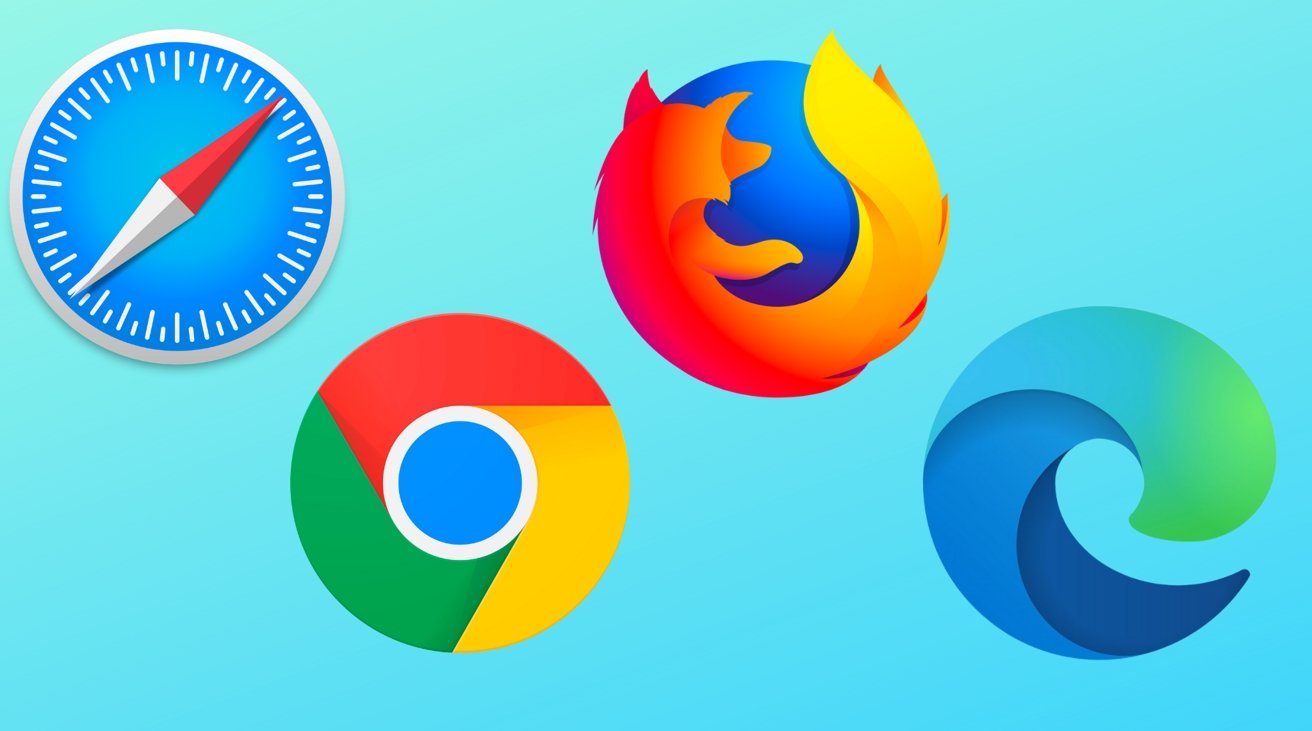
The truth is, the perfect browser doesn't exist. Each of the four most popular macOS browsers has its own set of strengths and weaknesses, just based on the engine that's used for web rendering, and what the developers of the big-four have prioritized.
While the best browser for the individual varies on use case, and which websites behave the best on any given browser, there are a series of benchmarking tools that can measure performance on synthetic tasks.
Browser benchmarks
We tested each browser on three different testing platforms: JetStream 2, Speedometer, and MotionMark.
JetStream 2 is a JavaScript-benchmark that scores browsers based on how quickly they can start and execute code, which translates to faster JavaScript performance. Since JavaScript is used on most web browsers, it's a good test of snappiness for code-intensive sites.
MotionMark is a graphical browser testing suite that measures the ability to render complex web pages. Think a page that has complicated graphics and animations. A higher score results in smoother transitions and animations.
Speedometer 2.0 determines the responsiveness of a browser when running web applications. Among the three, it's the truest option for testing real-world performance across many popular websites and online services. A good example is adding tasks to a to-do list in a web app.
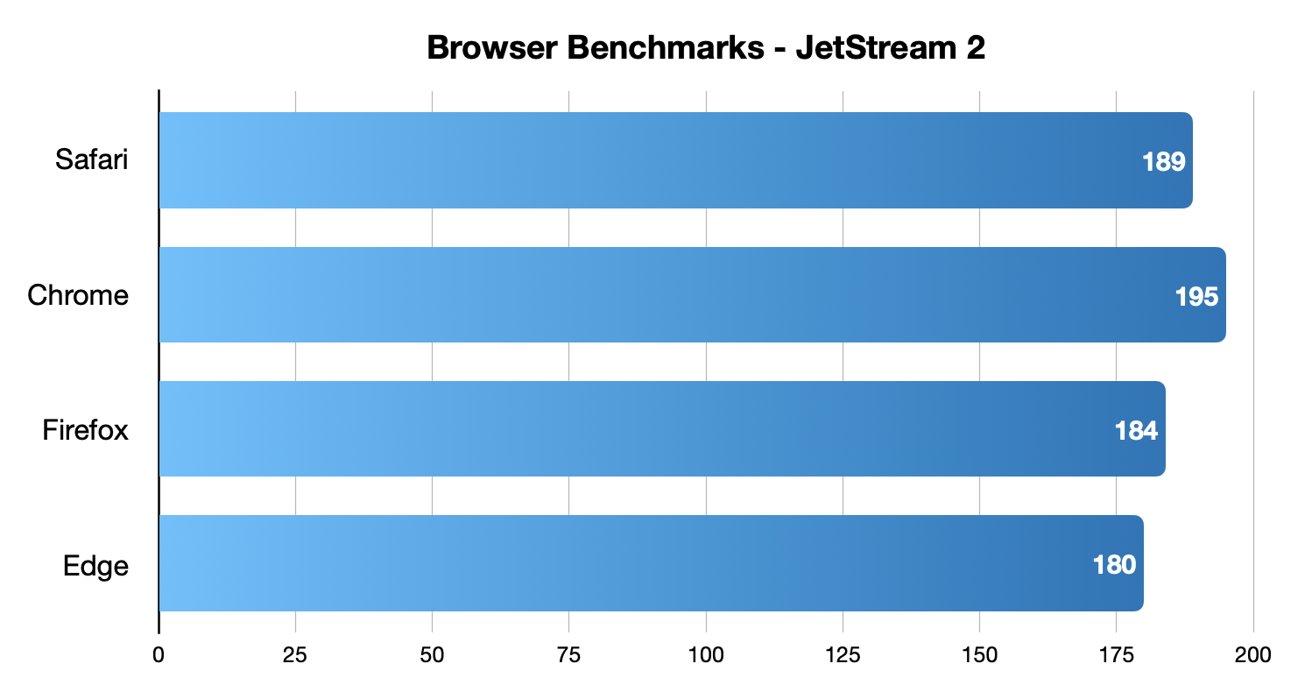
Chrome came out on top in JetStream 2 testing, while Safari took second place.
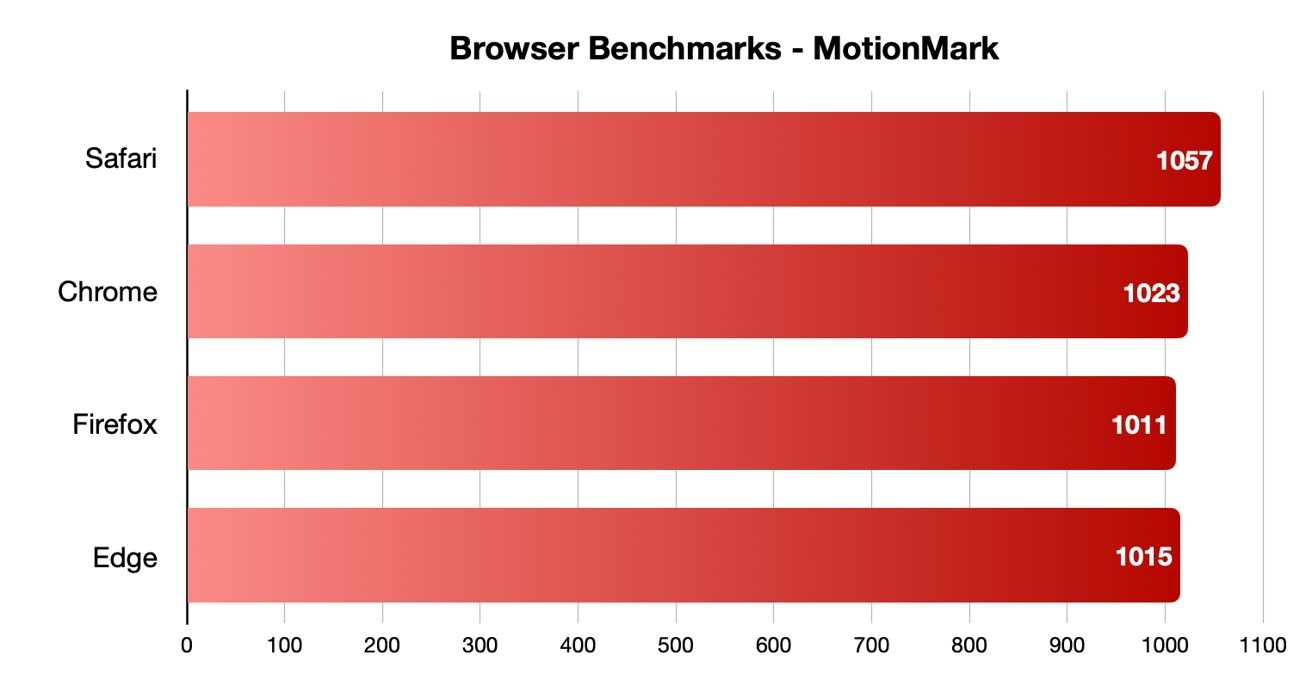
Safari was the fastest in MotionMark benchmark testing.
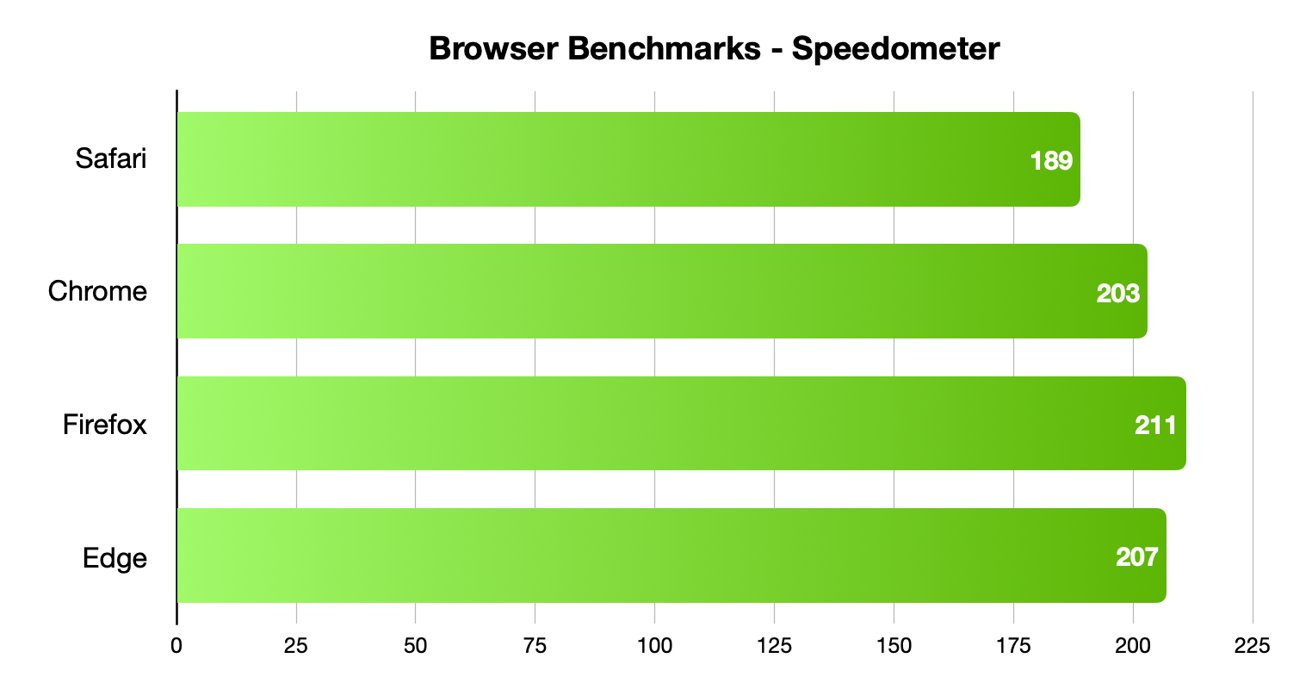
Speedometer testing showed off interesting results, with Firefox and Edge coming in first and second, and Safari in last place.
Different testing platforms result in different scores, so your own mileage may vary. Safari was the best for graphical performance, for example, but its responsiveness lagged behind others. Choose what specific metrics are most important to you.
For Mac users, Safari is an institution. It's the default browser on Apple platforms and is generally lightweight and efficient. As you'd expect for an Apple product, Safari also emphasizing privacy while you browser online.
From the very first boot on a new Mac, Safari is instantly available and configured for easy, private browsing. That makes it the best choice for the most non-technical among us, since you won't need to download and install anything. Safari "just works" out of the box.
It also features the tighest integration across Apple's other devices and systems. You can use Continuity to easy hand-off your browsing between your Mac and any iPhone or iPad you have around. If you need to buy something with Apple Pay , you can authenticate purchases with Face ID or Touch ID.
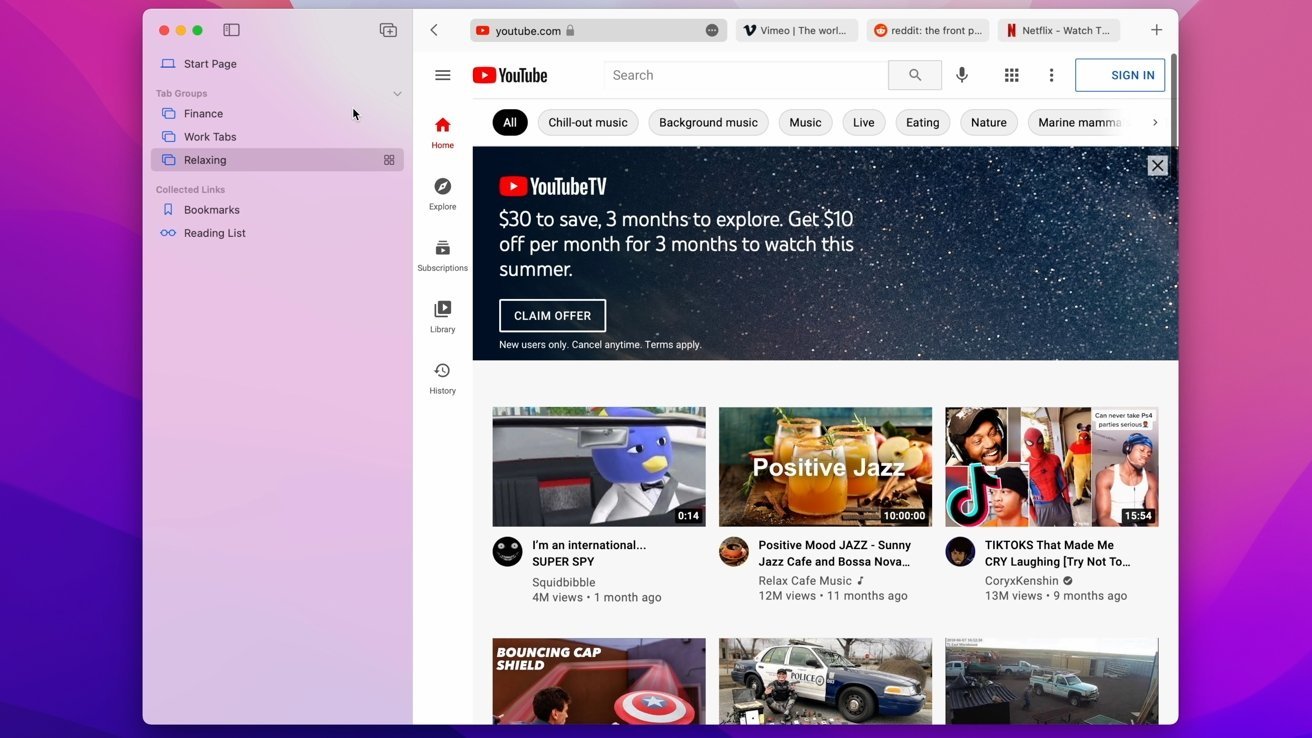
Safari also features some strong privacy protections, including mechanisms aimed at mitigating cross-site tracking and ad targeting. It features a built-in password manager that allows you to save and store passwords — with easy autofill options — across your Apple devices.
As an Apple-made product, Safari is the most convenient option on this list for Mac users — particularly those who own multiple Apple devices. It's also a good choice for the privacy conscious, though it isn't the fastest and it doesn't yet have a strong extension marketplace.
- Default Mac browser with effortless setup
- Strong privacy protections
- Integration with other Apple products
- Not the fastest or most responsive browser in some testing
- Lackluster support for add-ons and extensions
Google Chrome
Google Chrome is a massively popular browser, and a particular favorite of those who routinely use extensions to customize their web experience. It's the most-used web browser in the world, and it's faster and more RAM-efficient than it used to be. Chrome is even currently speedier than Safari on macOS.
The browser also has one of the world's most extensive list of add-ons, plug-ins, and extensions. From plugins focused on online privacy or to video content downloaders, there are around 190,000 extensions in total to choose from. You can also choose from a number of different themes and customization options.
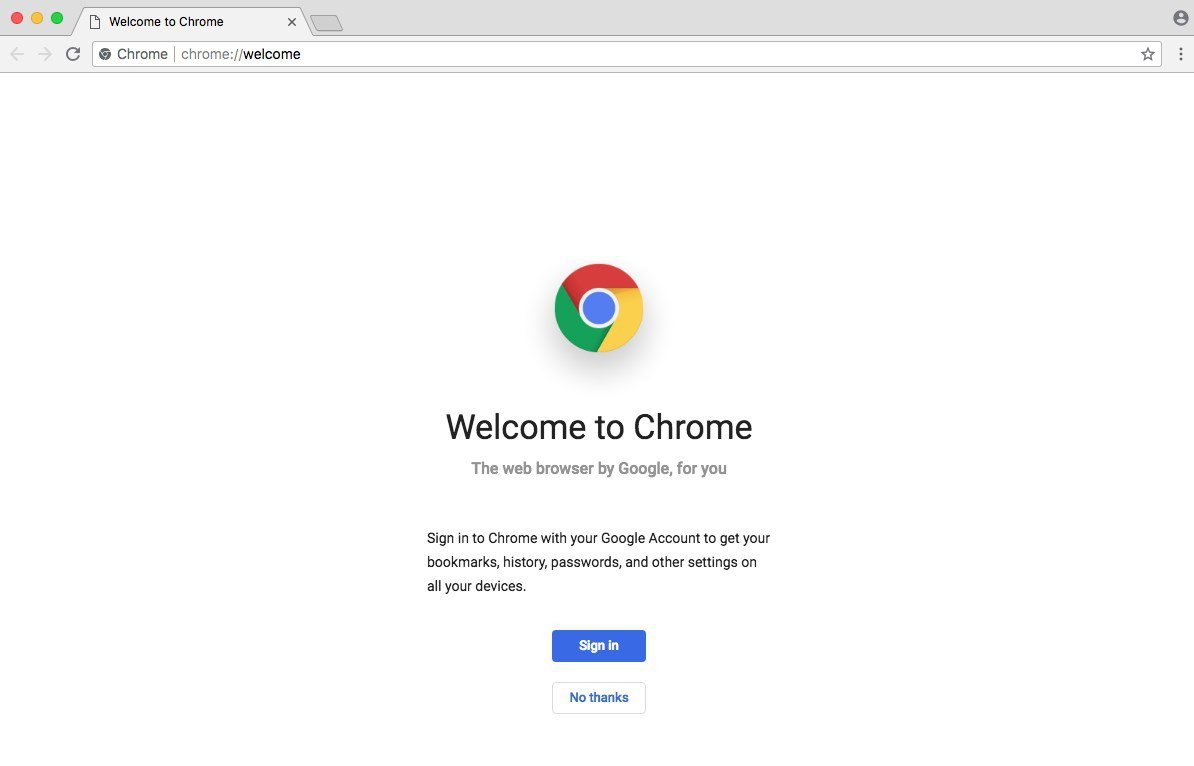
Intelligent Google-made features include automatic site translations and deep integration with the company's online tools and services — so it's great for those who rely on Gmail, Google Docs, or another Google service. Syncing between Google apps on different devices is also top-notch.
However, Google is a data company that relies on collecting information about its users. While the company has taken steps to bolster its privacy reputation, it's still a company that makes money on harvesting data. Those who are particularly privacy-conscious will probably want to look elsewhere.
It's hard to go wrong with the world's most popular web browser, particularly with its seamless workflow features and customization options. However, if you are even slightly concerned about online privacy, you may want to go with another option.
- Simple to learn, fastest option in some cases
- Syncs your Google account across other devices
- Extensive list of extensions and add-ons
- It's Google — so not that private
- Is a RAM and CPU hog
Mozilla Firefox is one of the only popular and mainstream browsers to have started life as an open source project. It's still a free and open source browser with a hefty focus on privacy and security, which could make it a good fit for those who want a Google Chrome alternative.
Because of its open source nature, users are free to explore Firefox's code — and they do. The browser doesn't have any hidden secrets or data-harvesters. It also features some excellent built-in privacy and security protections, including Enhanced Tracking Protection and an extensive list of customizable permissions.
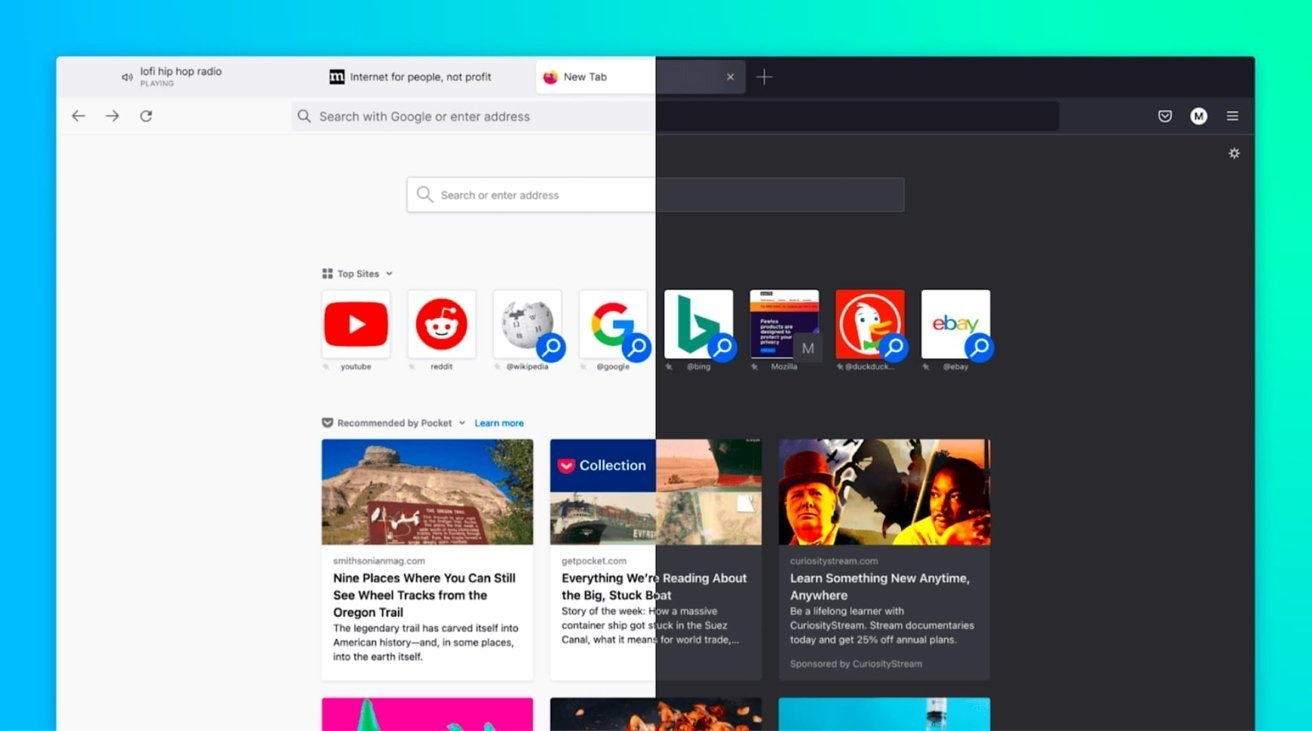
Firefox was also the first browser to actually offer third-party extensions and add-ons. Although it might not have as many extensions as Google Chrome, you'll still find a hefty list of options ranging from privacy add-ons to customizable themes for your browser.
Although Firefox has some cross-platform integration between its app and built-in Pocket support, it isn't as seamless as Chrome or Safari. If speed if your primary concern, it's also important to note that Firefox isn't the fastest browser by most metrics.
Users who want an open source browser or are committed to Mozilla's mission of keeping the internet open and free will find a browser after their own hearts here. For the average user, however, another browser on this list might be a better fit.
- Completely free and open source
- Extremely customizable with extensions, themes, etc.
- The best option for hardcore privacy
- Not the fastest or most RAM efficient
- Synchronicity isn't as robust
Microsoft Edge is the spiritual successor to Internet Explorer that was first released in 2015. Originally HTML-based, Microsoft overhauled the browser to be based on Chromium, which is the same underlying software used to make Google Chrome.
As such, Microsoft Edge is now much more competitive than it used to be. It's far from a Google Chrome clone, but you should expect a similar level of performance from it. Some users believe that Microsoft Edge even feels snappier than Chrome on a Mac.
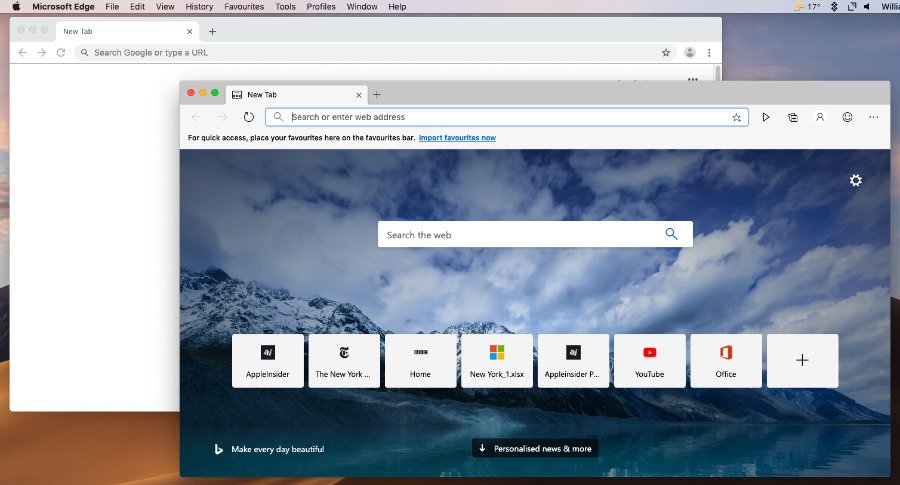
Because it's Chromium-based, Microsoft Edge also has a list of extensions similar to Chrome. It also sports a number of unique features, such as a "Collections" ability that lets you save information like text or webpages to a built-in notebook. There's also a vertical tab bar, a built-in read aloud feature, and an easy native screenshot tool.
It's a solid option for anyone that doesn't like Safari and wants an alternative to Google Chrome because of privacy reasons. If you use a Microsoft account like some use a Google account, then Edge might also be a solid option.
- Snappy, lower RAM and CPU usage
- Unique features like Read Aloud and Collections
- Good performance in most metrics
- Can be slower than Chrome in terms of pure performance
- Syncing isn't as strong as Safari or Chrome
The perfect browser doesn't exist, but you can pick and choose what you need
There's no clear answer for what the "best" browser on macOS is. However, some browsers are better suited to specific tasks than others.
When it comes to smooth JavaScript execution, Chrome is in the top spot with Safari a close second. Safari, according to the MotionMark testing, handles complex web pages better than any other browser.
Firefox, interestingly enough, may be the fastest when it comes to general everyday web apps.
Of course, there's also the issues of extension support, privacy, and synchronization across other devices. Many of the browsers are evenly matched on these metrics, but some excel in specific areas like privacy or cross-platform integration.
But, unlike on iOS, you aren't effectively stuck with one browser core technology. These four browsers, and several more, are available on macOS, and can be run in parallel.
While we don't recommend running all four unless you're a web developer or unit case tester, two or three different browsers can be run at-will, if any given browser doesn't handle your work case well.
Sponsored Content

Clean junk files from your Mac with Intego Washing Machine X9
Top stories.

Apple Notes in iOS 18 looks to up the ante with Microsoft OneNote

Game emulator Delta arrives on App Store after controversies

Apple's iOS 18 AI will be on-device preserving privacy, and not server-side

Apple wants to make grooved keys to stop nasty finger oil transfer to MacBook Pro screens

When to expect every Mac to get the AI-based M4 processor
Featured deals.

Deals: Sam's Club membership drops to $14, the lowest price ever
Latest comparisons.

M3 15-inch MacBook Air vs M3 14-inch MacBook Pro — Ultimate buyer's guide

M3 MacBook Air vs M1 MacBook Air — Compared

M3 MacBook Air vs M2 MacBook Air — Compared
Latest news.

How to shoot 3D video for Apple Vision Pro on iPhone 15 Pro
Apple added the ability to record Spatial Video to the iPhone 15 Pro and iPhone 15 Pro Max as part of iOS 17.2. Here's how to record video to be viewed on the Apple Vision Pro.

Sam's Club membership drops to $14, the best price ever
Get a 1-year Sam's Club membership for just $14, the lowest price on record, for affordable access to warehouse deals.

iPhone 17 Plus display might be a hair smaller than the iPhone 16 Plus
Apple may make a controversial change, with a new rumor claiming that the size of the iPhone 17 Plus screen could shrink a bit, when compared to iPhone 16 Plus.

First third party App Store in the EU is live
Following changes in iOS 17.4 and legislation allowing them, the first new alternative app store has launched in the EU, that promises to help distribute "indie" apps at a low-cost yearly fee.

Following controversy over the weekend, the Delta game emulator has been made available in the App Store, for potential users outside of the European Union.
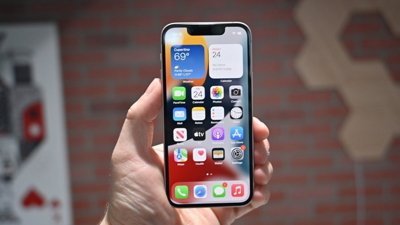
All of the specs of the iPhone SE 4 may have just been leaked
A leak that is chiefly rounding up previous rumors about the iPhone SE 4 has added that it will have AI-based camera features, and contrary to expectations, will resemble the iPhone 13 more than the iPhone 14.

The 'For All Mankind' universe is about to get a whole lot bigger
Apple TV+ hit "For All Mankind" has been renewed for a fifth season, and a spin-off is also going back to the beginning for a new look at the Soviet space race.
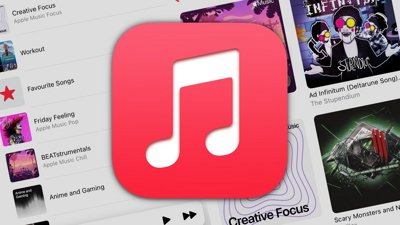
How to make Apple Music more private by turning off 'Discoverable by Nearby Contacts'
Apple Music has a setting that automatically opts users into sharing your musical tastes with contacts by default. Here's what the problem is, and how to keep what you listen to a bit more private.
Exclusive: One of Apple's most inconspicuously popular apps, Notes, is bound to become even more powerful when the company unveils its next generation operating systems in June, AppleInsider has learned.
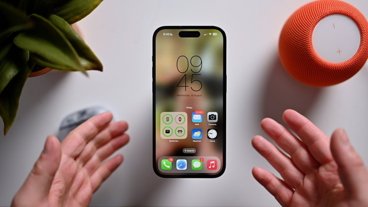
Apple rolls out second beta round, including EU Web Distribution in iOS 17.5
Apple has shifted onto the second round of developer betas, with the latest iteration of iOS 17.5 including Apple's Web Distribution system.
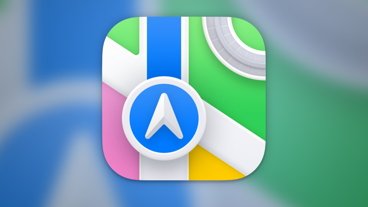
How to add a Quick Link for locations in Apple Maps in macOS
Apple Maps on macOS allows you to add Quick Links to locations in the sidebar for easier access. Here's how to add the shortcuts.
Latest Videos

The best game controllers for iPhone, iPad, Mac, and Apple TV
Latest reviews.

Ugreen DXP8800 Plus network attached storage review: Good hardware, beta software

Espresso 17 Pro review: Magnetic & modular portable Mac monitor

Journey Loc8 MagSafe Finder Wallet review: an all-in-one Find My wallet

{{ title }}
{{ summary }}
- GTA 5 Cheats
- What is Discord?
- Find a Lost Phone
- Upcoming Movies
- Nintendo Switch 2
- Best YouTube TV Alternatives
- How to Recall an Email in Outlook
The best web browsers for 2023
All web browsers have the same basic function, and yet, the choice between them has always been one of the most contentious in tech history. You have more options these days than ever before, whether you’re looking for the best web browser for privacy , the best for speed, or perhaps something a bit more adventurous.
To help you decide on the best web browser, we grabbed the latest browsers and put them through their paces. Even if some could use a complete overhaul, these options are your best chance for a great online experience.
The best web browser: Google Chrome
Chrome is ubiquitous — and for good reason. With a robust feature set, full Google Account integration, a thriving extension ecosystem (available through the Chrome Web Store), and a reliable suite of mobile apps, it’s easy to see why Chrome is the most popular and the best web browser.
- The best PDF editors for 2024
- The best Chrome VPN extensions for 2022
Chrome boasts some of the most extensive mobile integration available. Served up on every major platform, keeping data in sync is easy, making browsing between multiple devices a breeze. Sign in to your Google account on one device, and all Chrome bookmarks, saved data, and preferences come right along. Even active extensions stay synchronized across devices.
Chrome’s Password Manager can automatically generate and recommend strong passwords when a user creates a new account on a webpage. Managing saved passwords and adding notes to passwords is even easier. The search bar, or Omnibox, provides “rich results” comprised of useful answers, and it now supports generative AI capabilities. Favorites are more accessible as well, and they’re manageable on the New Tab page. And it’s now easier to mute tabs to avoid unwanted sounds.
Other updates have included a Dark Mode for Windows and MacOS , better New Tab customization and tab group creation, tab hover cards, and an in-browser warning if your password was discovered in a data breach. There’s a price tracking feature that can help locate the best deals. Android users will appreciate the Phone Hub for linking and monitoring their phones. There’s also the ability to quiet notifications, so websites don’t bombard you with requests to enable in-browser notifications.
What’s the bottom line? The Google Chrome browser is fast, free, and even better looking than before. With a thriving extension ecosystem, it’s as fully featured or as pared-down as you want it to be. Everything is right where it belongs, privacy and security controls are laid out in plain English, and the browser just gets out of your way. While it can be a little RAM-hungry at times , Google is working to make it more efficient — like Microsoft’s Edge, Google can now hibernate tabs in the background to stop them from using too many resources.
Overall, Chrome remains the best web browser download for the average user.
And, things are looking to get even better. Google announced some significant upgrades to the browser that haven’t gone live yet, to celebrate Chrome’s 15th birthday . A Material You design language will allow users to customize Chrome’s look and feel and attach themes to profiles to make it easy to tell them apart. The menu system will be revamped to provide easier access to a variety of settings and features including Extensions, Password Manager, Translate, and others. The Chrome Web Store will be redesigned using Material You to be easier to use, and AI will help identify useful extensions. And finally, Safe Browsing will now work in real time to protect against threats.
The best Chrome alternative: Microsoft Edge
In response to the market’s rejection of its original home-grown Edge browser, Microsoft rewrote Edge using the open-source Chromium web browser engine. The new Edge launched on February 5, 2020 , as a separate, stand-alone browser that replaced the integrated version. It became part of Windows 10 with the May 2020 update, although you can still download it for Windows 10 builds prior to version 2004. Of course, it’s the default web browser for Windows 11.
At first glance, the new Edge browser looks and feels like Google Chrome. It prompts you to import Chrome’s bookmarks toolbar and other settings. This is great if you hated the old Edge browser and want to give Microsoft’s new browser another shot. It also supports Chrome extensions , though the browser leads you to the Microsoft Store for add-ons. You must manually load the Chrome Web Store to install anything not listed in Microsoft’s repository.
However, it’s not Chrome with a Windows 11 theme. Microsoft reportedly disabled many features, including Google’s Safe Browsing API, ad blocking, speech input, Google-centric services, and more. In return, the company worked to optimize Edge and reduce its footprint while continuing to add new, Microsoft-oriented features. As of January 2023, Edge is the most efficient browser in terms of memory usage. It also allows sleeping tabs, to let tabs release their resources when they haven’t been used for some time.
Features launched since its release have included the new Edge Sidebar that provides easy access to various tools, more flexibility in managing how Edge starts up, Citations to make it easier for students to cite sources, and various other updates to make the browser more productive. Edge Workspaces lets users organize tasks into dedicated windows, and Microsoft has continuously tweaked various features, like the Edge Sidebar, to make them more user-friendly.
Microsoft Edge also provides simpler privacy settings and security updates. Microsoft Edge uses a graphically friendly interface that displays three security levels: Basic, Balanced, and Strict. With Balanced set as the default, many sites request you to disable your pop-up blocker even though one isn’t manually installed. All in all, we’re very optimistic that Edge is on its way to challenging Chrome as the best web browser.
The best Chromium alternative: Mozilla Firefox
Firefox is the best browser that’s not based on the Chromium browser engine. Mozilla has taken real strides to make its browser a truly modern way to surf from site to site, thanks to efforts like its upgrade to Firefox Quantum , its VR alternative Firefox Reality , and password-free browsing .
It wasn’t too long ago that Mozilla rebuilt the browser’s interface, offering a cleaner, more modern take on what a web browser should be. The changes weren’t just skin-deep, however. There’s some impressive engineering going on behind the scenes.
For example, Firefox Quantum is designed to leverage multicore processors in ways that its competitors just aren’t doing. It was not designed to make a huge difference in your day-to-day browsing, but Mozilla hopes this design will give Firefox Quantum an edge moving forward. By engineering for the future now, Firefox Quantum is in a better position to take advantage of quicker processors as they emerge.
Some Firefox strengths include privacy protections with SmartBlock anti-tracker support, improved password syncing across devices, enhanced readability, integrated breach alerts, and a Protections Dashboard that provides a summary of how Firefox protects your privacy behind the scenes. WebRender improves the graphics performance on Windows PCs with Intel and AMD CPUs.
Recent updates include easier download management, captions, and subtitle support on YouTube, Prime Video, and Netflix videos watched in picture-in-picture mode, HDR support in MacOS, and the ability to edit PDFs with text, drawings, and signatures. Firefox can also recognize text from an image, which is copied to the clipboard when selected. Finally, Firefox Colorways provides new options for optimizing how Firefox looks on-screen.
Beneath those changes, Firefox remains a comfortable, familiar standby. It’s a capable browser with a deep catalog of extensions and user interface customization. While managing settings across platforms isn’t as seamless as Google Chrome , the mobile browser app lets you share bookmarks between devices when using a free Firefox account.
There’s a bit of a fringe benefit, too. Since it’s been around longer than Chrome, some older web apps — the likes of which you might encounter at your university or workplace — work better on Firefox than they do on Chrome. For that reason, it never hurts to keep it around.
Overall, Firefox is more privacy-centric than Chrome and comparably fast, but its feature set isn’t quite as expansive elsewhere. If you like the sound of this, download the Firefox browser today.
The most innovative web browser: Opera
Another venerable browser and popular alternative, the Opera browser shares much of Chrome’s DNA and deserves its place as one of the best web browsers. Like both Edge and Chrome, Opera is built on Google’s open-source Chromium engine and, as a result, they all have a very similar user experience. Both feature a hybrid URL/search bar, and both are relatively light and fast.
The differences appear when you look at Opera’s built-in features. Where Chrome relies on an extension ecosystem to provide functionality users might want, Opera has a few more features baked right into the browser itself. It introduced a predictive website preload ability, and an Instant Search feature isolates search results in their separate window while the current page fades into the background, letting users more easily focus on the research task at hand.
You can install extensions from the Opera Add-ons store , which are just like Chrome extensions. Similar to Google’s browser, you’ll find useful tools like Giphy, Amazon Assistant, Avast Online Security, Facebook Messenger, WhatsApp, and more. If Chrome’s wide variety of extensions is important to you, then Opera becomes an intriguing alternative. It might just be one of the best browsers for quickly navigating web pages.
Opera also features a built-in “Stash” for saving pages to read later. There’s no need to sign up for a Pocket or Evernote account to save a page for later reading. Similarly, Opera features a speed-dial menu that puts all your most frequently visited pages in one place. Google Chrome also does this, but only on a blank new tab. Finally, Opera has a built-in unlimited VPN service, making it a more secure browser option.
The biggest changes came with Opera 60 and Reborn 3, a complete revamp that brought a new borderless design, Web 3 support, and a Crypto Wallet, allowing users to prepare for blockchain-based sites. With version 69, Opera became the first browser with a built-in Twitter tool, and the company has added others as well including Instagram and TikTok. Just click the icon on the toolbar, log in to your account, and tweet away right from within the slide-out menu.
Other recent advancements include Lucid Mode, which sharpens video playing on a variety of platforms, supports emojis instead of web links, and other enhancements. The Opera Sidebar adds new functionality much like Edge’s Sidebar, allowing quick access to various Opera features. And Opera Aria adds new generative AI capabilities built right into the browser.
You can see that we’re well into hair-splitting territory, which is why it’s important to remember that your choice of browser is, more than any other service or app you use each day, entirely dependent on your personal preferences — what feels most right for you. The Opera web browser has a unique look and feel, and it combines some of the best features of Mozilla Firefox and Google Chrome.
Alternative browsers
While the preceding browsers will meet most users’ needs, other alternatives exist for anyone looking for something different. This section is for those who have a more niche preference in web browsers or want to try something new.
Apple Safari
If you use Apple devices exclusively, Safari is already your default browser. It’s also significantly faster than in the past, surpassing Chrome in its quickness. It’s integrated into iOS, iPadOS, and MacOS, and you’ll likely get better battery life thanks to Apple’s in-house optimizations and the underlying hardware.
Safari also focuses a great deal on privacy and security. If you want to minimize how you’re tracked and whether Big Brother is looking over your shoulder, then Safari is a good choice. If you also use an iPhone and/or an iPad, then using Safari on your Mac will make for the most seamless transition between platforms. Open websites on an iPad or iPhone are carried over to MacOS.
Safari is not offered outside the Apple ecosystem.
Vivaldi Browser
The Vivaldi browser is truly unique. No two Vivaldi users will have the same setup. When you run it for the first time, you’re guided through a setup process that lays out your browser in a way that makes sense for you. You choose where your tabs and address bar go and whether you want browser tabs displayed at the top of the page or in a separate side panel. This is a browser built from the ground up to deliver a unique user experience, and for the most part, it succeeds. Vivaldi 2.0 enhanced the customization features and made them easier to access.
This browser excels at customization, and you can choose from a variety of tasteful themes that don’t feel dated or out of place on a modern PC, in addition to the aforementioned UI choices. It also has some standout privacy-enhancing features, like its team-up with DuckDuckGo to make the non-tracking search tool the default option when in privacy mode.
Finally, recent updates added more powerful tab management, enhancements like Web Panels that make for smarter browsing, and (as mentioned) even more powerful customization options. Other new updates include a built-in ad blocker, a built-in tracker blocker, a clock in the Status Bar, a new Notes Manager, and a Break Mode for pausing the internet while keeping the browser open.
Brave Browser
One of the most unusual browsers around is Brave — or, perhaps, it’s Brave’s business model that’s the strangest. Brave blocks all ads on all web pages by default, which makes it arguably the fastest browser around. Ads are a huge portion of how many websites make money — block these ads, and suddenly the most important web financial tool is eliminated.
That’s where the Brave Rewards program comes in. Users receive Basic Attention Tokens (BATs) when they view alternative ads that Brave places in the browsing stream. Users can pass along a portion of their tokens to publishers. As of January 2021, there were over 70,000 websites that supported BAT-based transactions through the Brave browser, including Wikipedia, The Guardian, WikiHow, MacRumors, and more.
What’s in it for users? Simply put, if you’re not waiting for ads to download along with website content, then your web experience will feel much faster. Brave performs no user tracking, making it ideal for private browsing as well.
Tor Browser
The Tor Browser is a version of Firefox that serves one very specific purpose: A simple entry point for The Onion Router, or Tor .
Tor is software combined with an open network aimed at making you invisible by routing your traffic through several anonymous servers. While it’s not foolproof, it’s very difficult for someone to identify you when you’re properly configured and using something like the Tor Browser to surf the web — especially if combined with a VPN .
There are many legitimate uses of the Tor Browser and the Tor network. It’s a good choice for people who live in countries with repressive governments, as well as journalists and activists. The dark web is also one of the destinations for people using Tor, which includes many nefarious and illegal sites.
In any event, if you want to remain completely anonymous while surfing the web, the Tor Browser and network are for you. If you want a more mainstream alternative, Opera includes a VPN component, but it’s far less private.
Avast Secure Browser
Avast Secure Browser first arrived as the Opera-based Avast Safezone Browser in 2016 as part of the Avast Antivirus paid bundle. It was revised and rebranded in 2018 as a free stand-alone product based on Chromium. Originally the “SafeZone” aspect kicked in when users visited websites to make purchases or manage money.
Avast Secure Browser provides several built-in tools to protect your data and privacy. These include an anti-phishing module, fingerprinting and online tracking prevention, an ad blocker, and a Webcam Guard tool to control which websites can access your camera. The Hack Check tool will determine if your info was leaked in a data breach.
Avast Secure Browser is a stand-alone download for Windows, MacOS, Android, and iOS. The desktop version doesn’t include an integrated VPN but instead directs users to download the company’s separate SecureLine VPN software. The listed Bank Mode — part of the Avast Free Antivirus client — flips on when users load a banking website.
Best web browser features — what to look for
Benchmark tests.
Notice we don’t include Safari in our main comparison. Apple’s Safari web browser is unavailable on Windows, Android, or Chrome OS, so we removed it from our primary list.
Most browsers are compatible with web standards and handle performance with relative ease. A casual user probably won’t notice a difference in the rendering speed between today’s modern browsers, as all six are much faster and leaner than those of a few years ago.
We ran the following benchmarks on a desktop with an AMD Ryzen 7 5800X processor, 32GB of RAM, a 1TB M.2 PCIe NVMe solid-state drive, and Windows 11. All browsers were clean installs of the most current production versions as of January 2023, and all were run at their default settings.
First, JetStream 2 is a JavaScript and WebAssembly benchmark. It tests how quickly a web browser can start and execute code, and how smoothly it runs. Higher numbers are better.
Notice how all three Chromium-based browsers outperform Firefox. In fact, there’s very little difference between them, while Firefox’s performance is quite poor by comparison.
The next test we ran was Speedometer 2.0 . It measures how responsive a browser is to web applications by repeatedly adding a large number of items to a to-do list. Higher numbers are better.
Here, Opera led the pack, with Chrome and Edge running nearly neck to neck. Firefox came in last here with a relatively low score.
Finally, we tested how much RAM each browser uses, both with no tabs open and then with 10 tabs open accessing the same popular sites. We made sure that each browser had no extensions running, and we let each browser settle in before looking at its memory use. For the test with 10 tabs open, we averaged memory use when all the tabs were opened and then five minutes later to account for any variability.
It’s not a scientific test, but it should be sound enough to give you an idea of which browsers are the most and least efficient in terms of taking up your RAM. We found Opera to use the least amount of RAM when first opened, barely ahead of Edge, while Chrome used the most. Edge used the least with all 10 tabs loaded by a significant margin, a third or less than the other browsers. Chrome used the most with all 10 tabs open, and Firefox and Opera weren’t far behind.
Security and privacy
The most valuable tool for secure and private browsing is user discretion, especially when you consider that every web browser has encountered security breaches in the past. In particular, Internet Explorer and Chrome’s reputations for protecting users’ security and privacy credentials are spotty at best.
Chrome, Safari, Vivaldi, Opera, and Firefox all rely on Google’s Safe Browsing API to detect potentially dangerous sites. Thanks to constant updates, Mozilla, Chrome, and Opera all make constant security improvements. Microsoft disabled this API in Edge.
All browsers offer a private session option, too. Private sessions prevent the storage of browsing history, temporary internet files, and cookies. Browser support for Do Not Track remains spotty.
Mozilla made some strides in differentiating itself from others with a real focus on privacy in recent years. It even debuted a Facebook Container in 2018 to make it harder for the social network to harvest user information.
Frequently asked questions
Do you need to use a VPN when browsing the web?
You do not have to use a VPN when browsing the internet. However, a VPN can be a good tool to use as it protects your privacy and data by creating a secure and encrypted data tunnel between your browser and a VPN server. In turn, that server creates a secure and encrypted connection between it and the target website.
As a result, the website can’t identify you personally, nor can it see your true geological location or internet address. Not even your ISP knows where you’re surfing or the device you use with a VPN enabled. Some VPN services are free while others require a subscription. We have a list of the current best VPN services .
Which browser is most used in the world?
Google Chrome leads the web browser market with a 64.68% share, according to Statcounter . Apple Safari follows with 18.29%, Edge at 4.23%, Mozilla Firefox at 3.01%%, and Opera at 2.25%. Internet Explorer is still in use with 0.81%, while Microsoft Edge “Legacy” is fading out at 0.32%.
What are the best ad blockers to use for your browser?
We have a guide on the best ad blockers for Google Chrome , but here’s a short list:
- AdBlock and AdBlock Plus
- AdGuard (Chrome only)
- CyberSec by NordVPN
- Poper Blocker (Chrome only)
- Stands Fair AdBlocker (Chrome only)
- uBlock Origin (Chrome and Firefox only)
What is browser fingerprinting and how can you prevent it?
Websites want to know everything about you: Your tastes, your habits, and where you like to surf. When you load a website, it quietly runs scripts in the background that collect information about you and your device. The operating system, the web browser, all installed extensions, your time zone — all of this information is strung together to create a “fingerprint,” which in turn can be used to trace you across the internet via cross-site tracking.
Avast provides a detailed explanation and outlines various forms of fingerprinting. For example, the “canvas” method forces the browser to draw an image or text in the background, without the user knowing, to determine the operating system, web browser, graphics card, installed drivers, and the current font style. Device fingerprinting determines all internal and external device components.
As your fingerprint is tracked across the internet, this “profile” can be sold to data brokers, who then resell the data to advertisers. It’s a more silent means of gathering information about you versus using cookies that require your consent. The problem is, browser fingerprinting is still perfectly legal.
The best way to prevent browser fingerprinting is by randomizing and generalizing data. Third-party software like Avast AntiTrack does this by inserting “fake” data when website scripts try to collect your information. However, this tool allows scripts to continue running in the background so the website doesn’t “break.”
Many browsers offer some type of anti-fingerprinting protection. These include Avast Secure Browser (see above), Brave Browser (randomization), Mozilla Firefox (blocks fingerprinting scripts), and Tor Browser (generalization).
Editors' Recommendations
- The 23 best Google Chrome themes in 2024
- The best Chromebook for students for 2023
- Best Products
- Google Chrome

Mark has been a geek since MS-DOS gave way to Windows and the PalmPilot was a thing. He’s translated his love for technology into a marketing, consulting, and freelance writing career aimed at helping people use technology to enhance their lives. At Digital Trends, he reviews laptops and desktops, including the latest from HP, Dell, Lenovo, Apple, and more, and writes news and easy to understand how-to articles about the computing industry as a whole.
When he’s not writing, you’ll find him reading and watching science fiction, taking photos with his family, and obsessing over Indiana University basketball.
Laptop Reviews
Best Budget Laptops Best 2-in-1 Laptops Best Business Laptops Best Laptops Under $1,000
While Meta’s Quest Pro is one of the best VR headsets available, it never reached its full potential as a laptop replacement for spatial computing. Meta hasn’t given up on making a work-centric solution, and rumors suggest a Meta Quest Pro 2 is still in development. Here’s what we know so far about Meta's answer to Apple's Vision Pro. Meta Quest Pro 2 release date speculation It’s difficult to make a solid prediction on when Meta will launch the Quest Pro 2. Meta CTO Andrew “Boz” Bosworth made it clear in an Instagram AMA that Meta is continually prototyping new VR headsets to find out what’s possible with current technology. That gives Meta more flexibility than manufacturers that research for years before doing hardware testing.
If Meta is satisfied with the performance of the Snapdragon XR2+ Gen 2 and LG can deliver enough micro-OLED displays, the Quest Pro 2 could arrive as early as this October at Meta Connect 2024.
RAM is one of the primary components in a PC, and it's important that you have at least a certain amount of RAM depending on what you want to do with your PC. However, there are more things to RAM than just capacity: Frequency and latency are important considerations, too.
The question of whether RAM speed matters is especially important now that we have two generations of RAM available, both DDR4 and DDR5 -- and they have vastly different speeds. The official maximum clock speed for DDR4 was 3200MHz, while DDR5 starts at 4800MHz, an increase of 50%; however, you'll easily find RAM kits reaching above 7000MHz. Although latency significantly went up, from CL14 on most 3200MHz DDR4 kits to CL40 on most 4800MHz DDR5 kits, DDR5 is still found to be faster.
Whether you're a seasoned professional or enjoy drawing as a hobby, investing in a 2-in-1 laptop is a great idea for all sorts of artists. Drawing on a laptop makes it easy to quickly share your creation with others, which is especially useful if you're doing it as a professional–negating the need to upload your pen-and-paper sketch to the computer before sending it to a client. Moreover, working on a laptop lets you undo mistakes, zoom in to better handle small details, and quickly change utensils.
There are a lot of perks to drawing on a 2-in-1 laptop, but not all of them are great for creators. Some have unresponsive displays that can't register all your movements, while others might have a lackluster resolution or color spectrum that turns most images into a muddled mess. Because of that, it can be hard figuring out which laptop is best for your needs. And if you'll be spending a good chunk of change on the laptop, you'll want to make sure you get it right.
Safari vs. Chrome: Best Browser for Mac in 2024
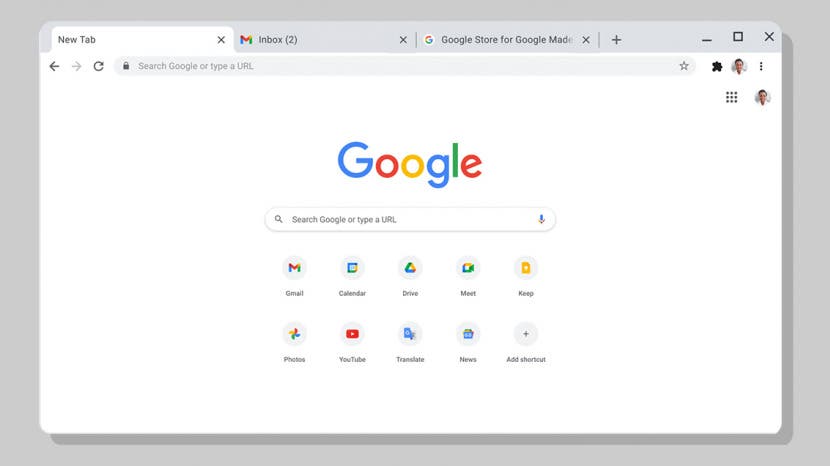
Does using Google Chrome for Mac computers make sense? Or should you go with the default Safari web browser? Since most of the time users spend on a Mac involves browsing, the Safari vs. Chrome debate is a big one! I’ll cover the pros and cons of each browser and I’ll teach you how to download Google Chrome on MacBook Pro, MacBook Air, and iMac!
What's in This Article?
- Best Browers for Mac Computers
- Safari vs Chrome: Pros & Cons
- How to Download Google Chrome on MacBook
Best Browsers for Mac Computers
Is Safari better than Chrome? It depends. The best browser for Mac depends a lot on your experience. Safari comes pre-installed on your Mac and on your other Apple products. Recently, it was completely upgraded with the macOS 12 Monterey update. Safari offers many great features, and it is the most power efficient browser for your Mac. However, Google Chrome is also an excellent option.
Google Chrome does not come pre-installed, and many users won't find it in their App store, which leads to questions like, "Can I download Google Chrome on MacBook Air, MacBook Pro, and iMac?" The answer is yes!

Google Chrome is a popular browser for Mac users because it has an abundance of powerful extensions and many ways to customize your browser. Additionally, Chrome is made for all kinds of devices, not just Apple. This comes in handy if you use Macs at home but PCs at work or vise versa.
Safari Browser Review
Safari is the default browser on all Apple devices, including on Macs. The recent updates make Safari a fantastic browser with lots of new customization options, security features, and so much more. One of the most exciting upgrades is iCloud Plus Private Relay , only available on Safari and gives the browser a notable privacy boost.
Since Apple designed Safari to work with its devices, it is obviously better integrated into the Apple ecosystem than a third-party browser. This has its perks, such as having the new Shared With You section built into the browser. Also, Safari is the more energy efficient browser, so using it instead of Chrome can help extend battery life and Mac performance in general.
Related: How Do I Upgrade My Browser on My Mac with macOS 12 Monterey
Chrome for Mac Review
Like many users, I have used Google Chrome as the default browser on my Mac for years. My favorite feature is having multiple profiles logged in to switch between work and leisure content with a click. Plus, Google Chrome offers invaluable extensions that are either not provided or have been discontinued on Safari, such as TubeBuddy.
On the other hand, Chrome uses ridiculous amounts of CPU, which can slow down your computer, make it overheat, and drain your battery faster. In fact, when I updated to macOS 12 Monterey, I couldn't use Google on my 2020 MacBook Air without experiencing frequent system crashes. So is Google Chrome worth it? Below are some pros and cons that can help you decide!
Safari vs Chrome: Pros and Cons
There is no clear to answer to which web browser is best, as this is highly subjective. The following pros and cons can help you device for yourself:
Pros: Google Chrome for Mac Computer
- Google Chrome has significantly more extensions than Safari; these can help improve privacy, save you money online shopping, and more.
- Google Chrome can run on all operating systems, while Safari is not an option for Linux users.
- Chromecast or Google TV users can enjoy direct casting from Google Chrome.
- It is fast, although not necessarily quicker than Safari. Both beat other third-party browsers such as Microsoft Edge.
- Google Chrome gets more frequent security and privacy updates than Safari to minimize security breaches.
- Many consider Google Chrome easier to navigate than Safari, although both browsers are relatively easy to use.
Cons: Using Google Chrome Browser for MacBook
- Google Chrome uses significantly more CPU than Safari and is less energy efficient to the point of causing issues on older or slower Macs.
- Google Chrome has openly stated that it collects and uses browsing data, while Apple has minimized app-tracking and improved users' overall privacy experience.
- Google Chrome doesn't support all macOS operating systems, only newer ones, so not all Mac users can download and use it.
- Although it has its own password management, Google Chrome can't be synced to the iCloud keychain.
- Google Chrome doesn't automatically offer the Hide my Email feature like Safari does, resulting in more spam and potentially dangerous emails.
- Google Chrome doesn't work in countries where Google is banned, such as China, so if you live there or are planning a trip, you'll have to use Safari or another browser.
In the past, Google Chrome was considered more customizable. However, with the new updates to Safari, including tab groups, Safari is now the more customizable of the two browsers, which complicates the Safari Chrome debate.
How to Download Google Chrome on MacBook Pro, MacBook Air, or iMac
Even though Safari is a great browser, there are many reasons why you may consider trying a different browser. Some, like Google Chrome, may not be available in the App Store, but you can still download it. Here's how to download a new browser on Mac:
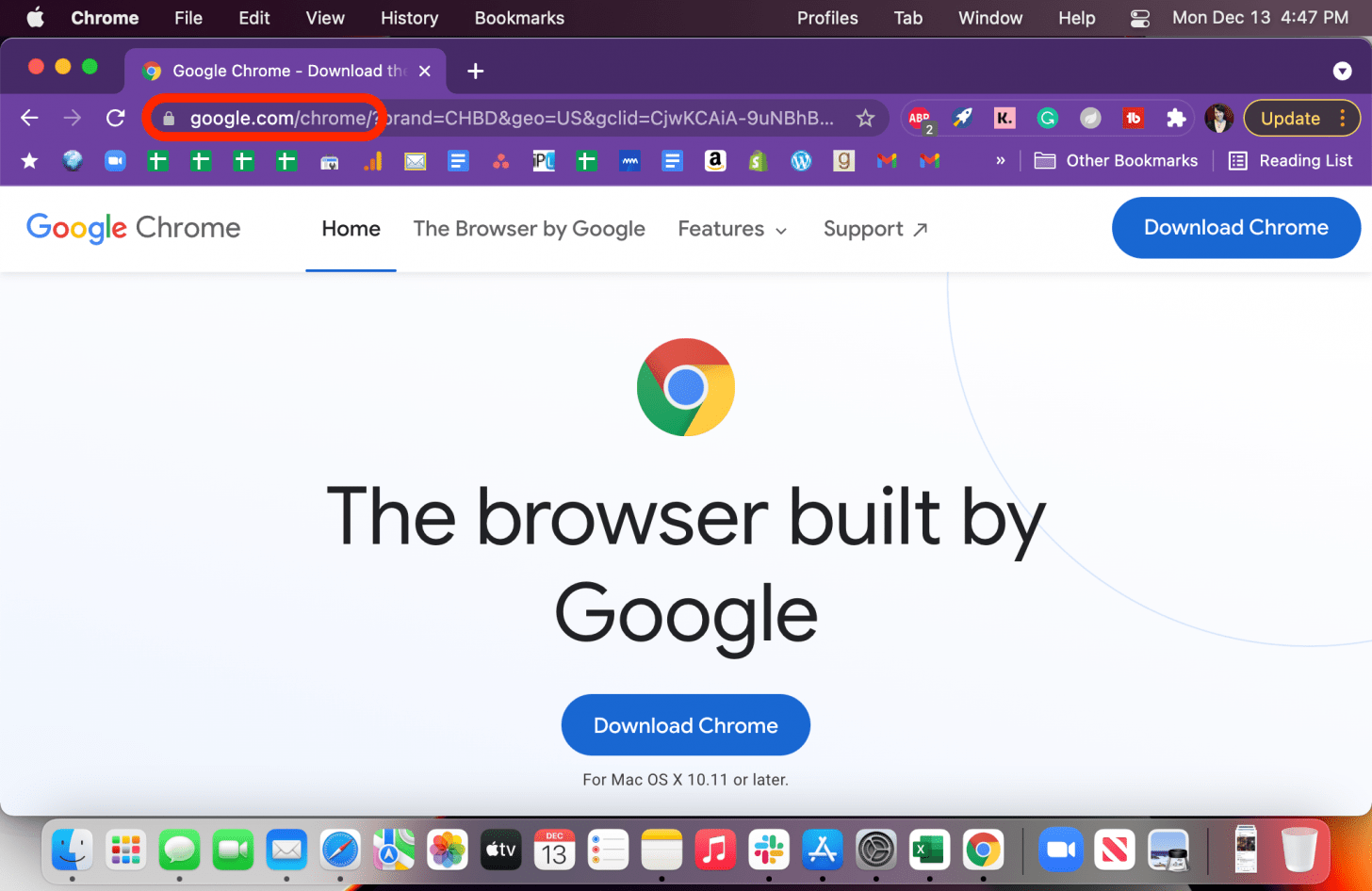
- Follow the on-screen directions to finish the installation.
Once you’ve installed Google Chrome on your Mac, it still won’t be your default browser. Here are two articles that will teach you how to change browsers on MacBook or how to change default browsers on iPhone .
Author Details

Emma Chase is a freelance writer for iPhone Life. She has her Bachelors degree in Communication from the University of Northern Iowa. Emma has worked in many sectors in her professional career, including the higher education, finance, and nonprofit. Emma lives in small-town Iowa with her husband and two children. When she’s not geeking out over the newest Apple product or wrangling her kids, Emma enjoys a good book, crocheting, and trying new foods.

Featured Products
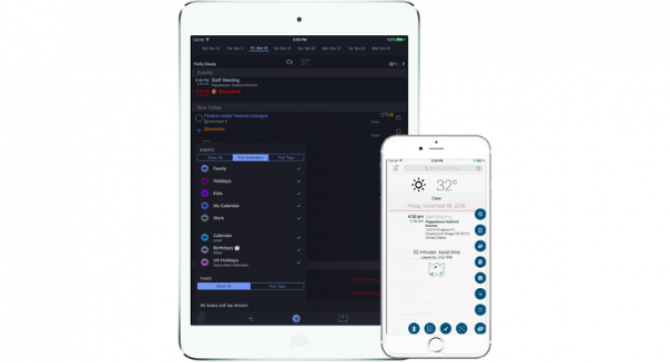
Now you can try Informant 5 for free and experience a productivity boost by managing projects with tasks and notes, syncing your calendar among all your devices, enjoying a user-friendly 30-day calendar view, and so much more. Informant 5 features SmartBar navigation which makes it so much easier to use and master this calendar app. Plus, you can use it almost anywhere thanks to Dark Mode. With a dark background, you can check in on your tasks and schedule anywhere, even the movie theater. Upgrade to the best calendar app and task manager for iOS! Download Informant 5 today and get organized!
Most Popular

How to Tell If Someone Blocked Your Number on iPhone

How Many iPhones Are There? iPhone Model History
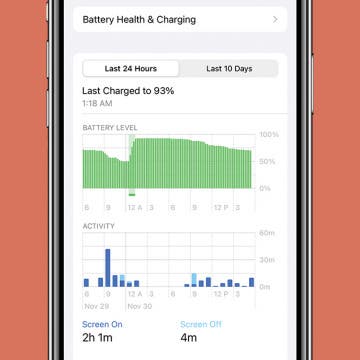
10 Simple Tips To Fix iPhone Battery Drain
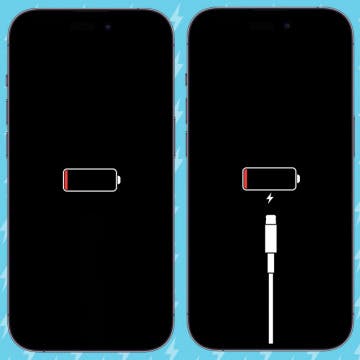
How to Tell If a Dead iPhone Is Charging
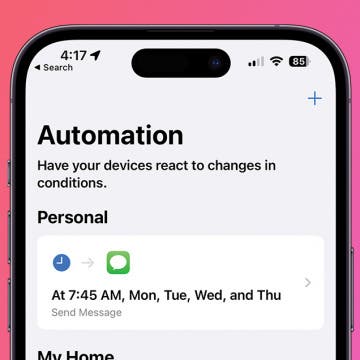
How to Schedule a Text Message on iPhone

How To Put Two Pictures Together on iPhone
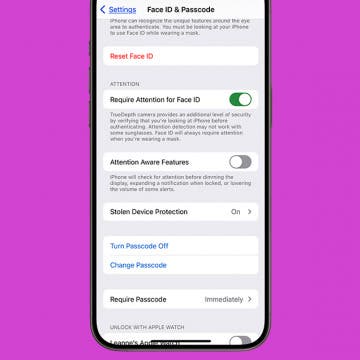
iPhone Alarm Volume Low? How to Make an iPhone Alarm Louder

How to Hide an App on Your iPhone
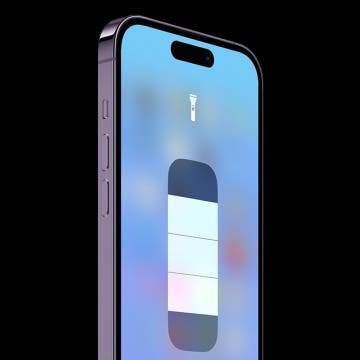
How To Turn Off Flashlight on iPhone (Without Swiping Up!)
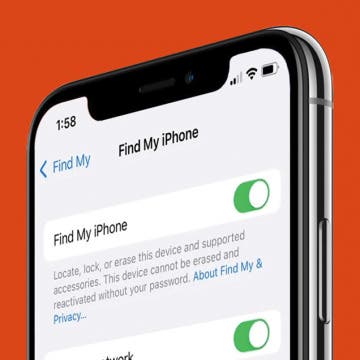
Why Is Find My iPhone Not Working? Here’s the Real Fix
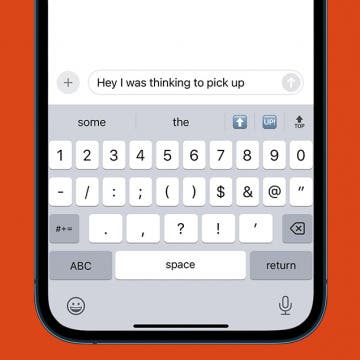
The Fastest Way to Type Numbers on iPhone
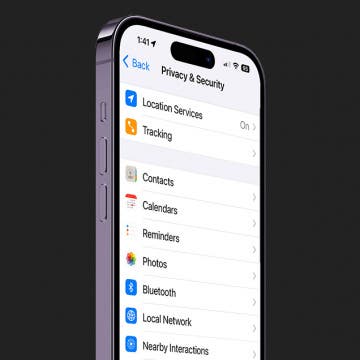
Can iPhones Get Viruses? How to Detect & Remove Malware (iOS 17)
Featured articles, the history of every iphone model from 2007–2024.

How to Find a Lost iPhone, Even If It's Dead or Offline
Symbols on an iPhone & Their Meanings
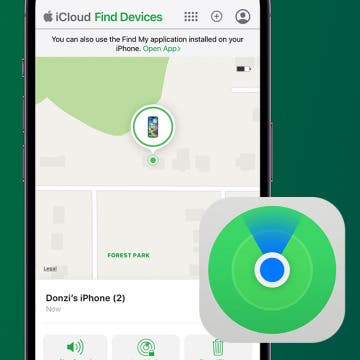
How to Find Someone Else's iPhone When It's Lost
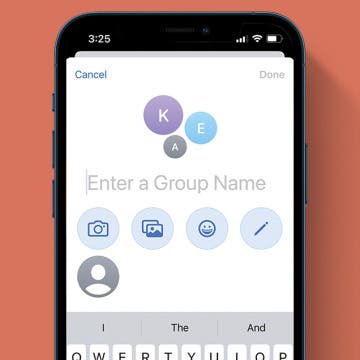
How to Name a Group Text on iPhone (iOS 17)
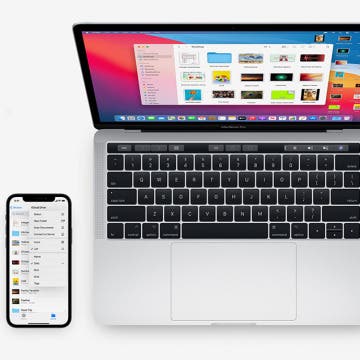
How to Transfer Photos from iPhone to Computer—PC or Mac
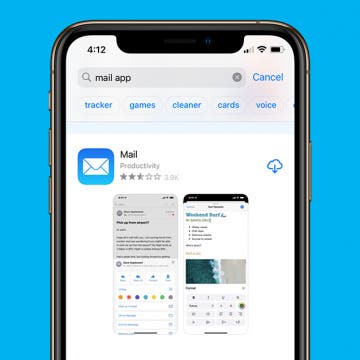
Email App Disappeared from iPhone? How to Find & Restore It (iOS 17)
Check out our sponsors.

- Each email reveals new things you can do with your phone (and other devices) with easy-to-follow screenshots.
- Enter your email to get your first tip immediately!
- Editorial Process
- Why Trust Us?
- Affiliate Linking Policy
- Privacy Policy
- Terms of Service
Weekly Must-Reads View All
7 things to do if you spilled water on your macbook.
Quick steps to save your MacBook from water damage
How to Boot Your Mac Into Verbose Mode: 4 Best Ways
Boot your Mac into Verbose Mode with this step-by-step guide
How to Fix Your Mac Shutting Down Randomly: 16 Fixes to Try
Troubleshoot random shutdowns on Mac with effective solutions
How Much Space Does macOS Take On Your Mac?
Understand macOS size and analyze your Mac's storage usage
Popular Topics
- What to Do With Your Old MacBook? 13 Useful Ways to Reuse an Old Mac
- What Is the MacBook Flexgate Issue and How to Fix It
- What Is the MacBook Flexgate Issue
- Uninstall Java
- Safely Transfer Files from Mac to Mac
- Safari Bookmarks Disappeared on Mac: 10 Best Ways to Restore Them
- Repairing disk permissions
- Old MacBook
Trending Now View All

Safari vs. Chrome on Mac: Which Browser Is Better?
Hashir Ibrahim
Reviewed by
Last updated: September 26, 2023
Expert verified
Safari is optimized for Mac, ensuring fast browsing, lower resource usage, strong privacy features, and seamless integration with the Apple ecosystem. However, it has limited extensions and infrequent updates.
Chrome stands out with its extensive customization options, extensions, and high-speed performance, but it can be resource-intensive and consume more battery.
- Safari is energy efficient, focuses on privacy, and integrates seamlessly with Apple devices: ideal for users prioritizing battery life and data protection.
- Chrome offers versatility with its wide range of extensions, customizable features, and slightly faster speed: suitable for users seeking personalization and performance.
- Both browsers have robust security features, but Safari emphasizes privacy, while Chrome offers customizable security extensions and frequent updates.
- So, Safari is a better choice for light internet browsing in Safari vs. Chrome on Mac, while Chrome excels at running heavy web applications.
Ever wondered which browser is the coolest for surfing the web on your Mac? Is it Safari or Chrome? Chrome is like a Swiss Army knife – super handy and flexible, while Safari is the speedy hometown hero, saving the day by being fast and keeping your secrets safe.
In this Safari vs. Chrome on Mac guide, I’ll compare these big shots and share the cool and not-so-cool stuff about them. By the end, you’ll know which browser is the winner for your Mac!
Google Chrome vs. Safari: A Quick Comparison

Before diving deep into the detailed exploration of Safari vs. Chrome on Mac, let’s glance at a quick comparison. This table highlights some key features and differences between the two browsers, giving you a snapshot of what each brings to the table.
Safari vs. Chrome: Pros & Cons
Here’s a quick rundown of the advantages and disadvantages of using Safari and Chrome on a Mac:
- Optimized for smooth and fast browsing on Mac
- Consumes less battery and system resources
- Strong privacy features and protections
- Seamless integration with the Apple ecosystem
- Enhanced multimedia support
- Infrequent updates can affect performance
- Limited cross-platform synchronization
- Limited availability of extensions
Google Chrome
- Regular updates ensure optimal performance
- Syncs seamlessly across multiple platforms
- Customizable privacy settings
- A wide array of extensions and customization
- Excels in running web applications
- Can be resource-intensive, affecting performance
- Tends to consume more battery life
- Privacy settings can be less robust than Safari
- Not as integrated with macOS as Safari
To sum up, the choice between Safari and Chrome largely depends on individual preferences, needs, and the specific use case.
If you’re someone like me who uses a lot of extensions only available on Chrome, you’ll have to stick with it. And if you’re just using a web browser for light internet browsing, then Safari seems to be a better choice in general.
Safari vs. Chrome on Mac: A Detailed Comparison

Both Chrome and Safari bring their unique strengths to the table. In this section, I’ll offer a detailed comparison of Safari vs. Chrome on Mac, diving into their features, performance, user experience, and more.
1. User Interface

When it comes to user interface, Safari is known for its simplicity and seamless integration with Apple devices. It’s easy on the eyes, and everything feels clean and organized.
Then there’s Chrome, packed with all sorts of goodies – you can open a bunch of tabs, switch between different user profiles, and even decorate it with cool themes.
But while Chrome is full of tasty bits, it can sometimes feel a bit too much. On the other hand, Safari keeps it sweet and simple, ensuring nothing gets in the way of your web adventures.
Verdict : If you’re all about keeping things neat and tidy, Safari is your go-to. But if you’re looking for a browser that’s as unique as you are, with all the bells and whistles, pick Chrome.
2. Features

Safari is like home for anyone using Apple gadgets. It’s super smooth, lets you open tabs across your Apple devices with iCloud, and even has a special Reader mode for a peaceful reading time, away from annoying ads. You can also use Touch ID and Face ID to confirm purchases on Safari.
But here comes Chrome, the adaptable browser that works well with different operating systems, whether you’re Team Android, Windows, or Apple. Chrome works really well with Chromecast and Google apps, like Google Translate, making it a handy buddy for all sorts of tasks.
Now, here’s where Safari really lags in terms of features – extensions. Chrome offers over 175,000 fun extensions, way more than Safari’s 350. Plus, you can make it look just the way you want with cool themes and backgrounds.
Verdict : So, who wins the feature face-off? It’s Chrome! With its endless features and the ability to make it truly yours, Chrome is your best bet for a fun and personalized surfing ride.
3. Speed and Performance

Safari is known for being light on its feet, using less RAM than Chrome. This means it can juggle more tasks at once, like opening many tabs and running heavy websites. Plus, for gaming enthusiasts, Safari promises a smoother ride through the high-res gaming world.
Chrome, on the other hand, is like a techy sprinter with gadgets up its sleeve. It’s tab isolation keeps each tab in check, so if one tab is acting up, it won’t trip the whole browser. And, if Chrome senses a tab is just lazing around, it’ll put it on pause to save energy.
But, with all its gadgets, Chrome can sometimes feel heavy, munching more battery and making other apps slow.
Now, let’s talk speed!
Benchmark Test Results
When browsing the web, speed is key. I put Safari and Chrome to the test to see how they perform in terms of speed and overall performance, focusing on these factors:
- How they handle lots of use
- How they deal with websites full of graphics
For my test, I used three tools: JetStream 2, MotionMark, and Speedometer, running them on a MacBook Air with 8GB of RAM and an Apple M1 processor.
Here are the results:
Several experts have posted the results of the Speedometer 2.0 test for JS/web performance on the MacBook Pro M1 Max on Twitter . The device scored 277 in this test, nearly doubling the speed of the fastest desktop iMac and marking a 20% improvement over the standard M1 MacBook.
- Javascript (JetStream) : Chrome slightly outperforms Safari, but the difference is marginal.
- Graphics (MotionMark) : Safari leads, indicating a smoother user experience for graphically intensive applications.
- Responsiveness (Speedometer) : Chrome significantly outshines Safari, making it a better choice for tasks requiring quick interactions.
Verdict : So, while Safari excels in graphics performance, Chrome has the upper hand in Javascript processing and responsiveness, making it a versatile choice for varied web tasks on a MacBook Air with an Apple M1 processor.
4. Privacy and Security

Safari is all about keeping your data safe and your browsing private. It protects you from unwanted trackers and offers a smooth ride, especially if you’re using Apple gadgets.
On the other hand, Chrome is armed with customizable security features and speedy performance. It’s always looking for online threats, but its knack for collecting data might make some users think twice.
Despite excellent security features, Chrome’s popularity makes it a target for hackers, and its password manager is confined to the browser on Apple devices. Its unclear privacy policy and dependence on advertising might raise concerns about data misuse.
Verdict : It’s a draw! Chrome leads with customizable security, while Safari excels in password management. Apple users may favor Safari for its iCloud integration, but Chrome is a strong contender for more security control.
5. Extensions

Picking between Safari and Chrome is all about what extras you like! Chrome has a huge selection, with over 175,000 extensions. So, if you want to block ads, check your grammar, or change up your themes, Chrome’s got your back.
Safari plays it cool with fewer but top-notch extensions. It’s not about quantity but quality, right? Plus, Safari lets you use extensions on your iPhone and iPad, something Chrome hasn’t mastered yet.
But here’s the twist! More extensions in Chrome can mean slower loading times on some websites. And while Safari keeps it simple and secure, Chrome offers customization for those who love tinkering around.
Verdict : So, Chrome is the clear winner of the extension war! Its vast array of options makes it the go-to for those craving variety. But Safari would do if you’re an Apple fan looking for quality and mobile-friendly extensions.
Should I Use Safari or Chrome on Mac?
If you prioritize privacy and seamless integration with Apple devices, Safari is the way to go on Mac. However, if you value extensive customization, a wide range of extensions, and high-speed performance, Chrome is your best bet.
Choosing the best browser ultimately hinges on your specific needs and preferences. Here are a few more tips for you:
- If you have a slow internet connection on your Mac , it can interfere with your browser’s performance.
- If Safari is crashing on your Mac , disable unnecessary browser extensions , clear Safari cache , and delete Safari history to prevent random crashes.
- You can improve your browser’s performance by regularly clearing the browser cache on your Mac .
Frequently Asked Questions
Is safari better than chrome.
Safari and Chrome both have their strengths. Safari is known for being more energy-efficient and privacy-focused, making it a great choice for Apple users. Chrome, however, offers a vast array of extensions and is slightly faster, making it versatile for those who prioritize customization and speed.
Does Safari use less battery than Chrome?
Yes, Safari is known for using less battery than Chrome. It’s optimized for energy efficiency, especially on Apple devices, making it a preferred choice for users looking to maximize battery life. Chrome, while feature-rich, tends to consume more power, which can lead to faster battery drain.
Is Safari safer than Google Chrome?
Safari and Google Chrome offer robust security features but excel in different areas. Safari is known for its strong privacy protections, especially for Apple users, while Chrome offers frequent updates and a vast array of customizable security extensions.
I'm Hashir, a tech journalist with a decade of experience. My work has been featured in some of the top tech publications like MakeUseOf and MakeTechEasier. I have a bachelor's degree in IT, a master's in cybersecurity, and extensive knowledge of Apple hardware, specifically MacBooks. As the senior writer at MacBook Journal, I write in depth guides that help you solve any issues you have with your mac and unbiased reviews that help you make the right buying decisions.
Hi there! I'm Ojash, a tech journalist with over a decade of experience in the industry. I've had the privilege of contributing to some of the world's largest tech publications, making my mark as a respected Mac expert. My passion lies in exploring, using, and writing about MacBooks, and I enjoy sharing my expertise to help others make informed decisions and get the most out of their MacBook experience. Join me as we delve into the fascinating world of MacBooks together!
You May Also Like

Best RPG Games for Mac: Insights From a Hardcore Gamer
Written by Hashir Ibrahim Reviewed by Ojash Last updated: September 22, 2023

MacKeeper Review: Everything You Need to Know
Written by Pawan Singh Reviewed by Ojash Last updated: September 6, 2023 Expert

Apple’s Public vs. Developer Beta: What’s the Difference?
Written by Hashir Ibrahim Reviewed by Ojash Last updated: September 26, 2023

Best Call of Duty Games on Mac: How to Play
Download Free
Safari vs Google Chrome: A Comprehensive Browser Comparison
It's free and super easy to set up
The internet has become an integral part of our lives, and our choice of web browsers can make a significant difference in how we experience the web. Among the many browsers available, two of the most popular are Safari and Google Chrome.
Introduction to Safari and Google Chrome
Safari and Google Chrome are two of the most popular web browsers available today. While both browsers serve the same purpose of allowing users to access and browse the internet, they have some key differences that set them apart.
Safari was first introduced by Apple in 2003 and has since become the default web browser for all Apple devices. It is known for its sleek design and user-friendly interface. One of the key features of Safari is its integration with Apple's ecosystem, allowing users to seamlessly sync their browsing history, bookmarks, and passwords across all their Apple devices.
Another feature of Safari is its strong focus on privacy and security. Safari has built-in features that block third-party cookies, prevent user tracking, and warn users about potentially harmful websites. This makes it a popular choice for users who prioritize online security.
Safari also has a number of useful extensions and plugins available, allowing users to customize their browsing experience. For example, users can install ad-blockers, password managers, and productivity tools to enhance their browsing experience.
Google Chrome
Google Chrome was first released in 2008 and has since become one of the most popular web browsers in the world. One of the key features of Chrome is its speed and performance. Chrome is known for its ability to handle large amounts of data and complex web applications with ease.
Another feature of Chrome is its integration with Google's ecosystem. Users can sign in to Chrome using their Google account, which allows them to sync their browsing history, bookmarks, and passwords across all their devices. Chrome also has a number of useful extensions and plugins available, similar to Safari.
One of the unique features of Chrome is its ability to run web apps as if they were native desktop applications. This means that users can access web-based tools and services, such as Google Docs or Trello, without having to open a separate browser window.
Both Safari and Google Chrome are excellent web browsers with their own unique strengths and features. Ultimately, the choice between the two will depend on the user's personal preferences and needs. Whether you prioritize speed, privacy, or integration with a specific ecosystem, there is a web browser out there that will meet your needs.
User Interface and Design
When it comes to user interface and design, the two browsers take very different approaches. Safari follows a minimalist design philosophy, with a clean and simple interface that prioritizes content over distractions. Meanwhile, Google Chrome has a more familiar layout, with a unified design across all platforms that is optimized for ease of use.
Safari's Minimalist Approach
Safari's interface is designed to be non-distracting, with minimal chrome and buttons. Its minimalist approach streamlines the browsing experience and focuses attention on the content, making it a popular choice for users who value simplicity and elegance in design.
One of the key features of Safari's minimalist approach is its lack of clutter. The browser's interface is free of unnecessary buttons and menus, which can be distracting and overwhelming for users. Instead, Safari's designers have opted for a clean and simple layout that emphasizes the content of the webpage. This approach is particularly effective on smaller screens, such as those found on mobile devices, where space is at a premium.
Another advantage of Safari's minimalist approach is its speed. By reducing the number of elements on the screen, Safari is able to load webpages more quickly than browsers with more complex interfaces. This can be particularly useful for users with slow internet connections or older devices.
Google Chrome's Familiar Layout
Google Chrome's design is characterized by its familiar layout, which features a search bar, bookmarks, and tabs. The browser's simplistic layout is optimized for ease of use and quick access to features, making it popular among users who prefer a more traditional browsing experience.
One of the key advantages of Google Chrome's familiar layout is its ease of use. The browser's design is intuitive and easy to navigate, even for users who are new to the platform. This makes it a popular choice for users who value simplicity and ease of use.
Another advantage of Google Chrome's design is its consistency across platforms. Whether you're using Chrome on a desktop computer, a laptop, or a mobile device, the browser's interface remains largely the same. This makes it easy for users to switch between devices without having to relearn the browser's layout and features.
Overall, both Safari and Google Chrome offer unique approaches to user interface and design. While Safari prioritizes simplicity and elegance, Google Chrome emphasizes ease of use and consistency. Ultimately, the choice between the two will come down to personal preference and the specific needs of the user.
Performance and Speed
Web browsing performance and speed are essential factors when assessing the efficiency of any browser. In this regard, Safari and Google Chrome have distinct approaches to speed and performance optimization.
Safari's Optimization for Apple Devices
Safari is optimized for use on Apple devices, allowing it to take advantage of their hardware capabilities fully. As a result, Safari is a blazing-fast browser that can handle a vast amount of browsing data with ease, making it a top choice for Mac and iOS users who value speed and performance.
One of the key features of Safari's optimization is its use of the Nitro JavaScript engine. This engine is specifically designed to execute JavaScript code quickly and efficiently, which is critical for smooth web browsing. Additionally, Safari is designed to take advantage of the hardware acceleration capabilities of Apple devices, allowing it to render web pages quickly and efficiently.
Another factor that contributes to Safari's speed and performance is its focus on energy efficiency. Apple devices are known for their long battery life, and Safari is designed to help preserve that battery life by using energy-efficient technologies whenever possible.
Google Chrome's Cross-Platform Efficiency
Google Chrome, on the other hand, is designed with cross-platform efficiency in mind. It features a multi-process architecture that enables seamless and speedy browsing across platforms, making it a great choice for users who utilize multiple devices and operating systems.
One of the key benefits of Chrome's multi-process architecture is its ability to isolate different tabs and processes from one another. This means that if one tab or process crashes, it won't bring down the entire browser. Additionally, Chrome's use of multiple processes allows it to take advantage of modern multi-core processors, which can lead to faster and more efficient browsing.
Another factor that contributes to Chrome's speed and performance is its use of the V8 JavaScript engine. This engine is designed to execute JavaScript code quickly and efficiently, which is critical for smooth web browsing. Additionally, Chrome is designed to take advantage of hardware acceleration capabilities on a wide range of devices, allowing it to render web pages quickly and efficiently.
Overall, both Safari and Google Chrome are excellent choices for users who value speed and performance in their web browsing experience. While Safari is optimized for Apple devices and offers exceptional performance on those devices, Chrome's cross-platform efficiency makes it a great choice for users who utilize multiple devices and operating systems.
Privacy and Security Features
In an age of increasing online threats, user privacy and security are top concerns for any web user. Safari and Google Chrome both offer robust privacy and security features, but the way they implement them differs.
Safari's Focus on User Privacy
Safari is renowned for its focus on user privacy, offering built-in features such as Intelligent Tracking Prevention and strict blocking of third-party cookies. These features make it a top choice for privacy-conscious users who want to keep their online activities and personal information safe.
Intelligent Tracking Prevention is a feature that uses machine learning to identify and block tracking cookies. These cookies are used by advertisers to track user behavior across multiple websites. By blocking these cookies, Safari prevents advertisers from building a detailed profile of a user's online activities.
In addition to blocking tracking cookies, Safari also blocks third-party cookies by default. This means that cookies from websites other than the one a user is currently visiting are not allowed to track the user's activity. This is an important feature for protecting user privacy, as third-party cookies can be used to track users across multiple websites.
Google Chrome's Built-In Security Measures
Google Chrome is known for its built-in security measures, including phishing protection and sandboxing, which isolate potentially harmful code from the rest of the system. These security features make it an ideal choice for users who prioritize online security.
Phishing protection is a feature that helps users avoid phishing attacks, which are attempts to trick users into giving away sensitive information such as usernames and passwords. Chrome's phishing protection feature checks the URL of a website against a list of known phishing sites and warns the user if a match is found.
Sandboxing is a security feature that isolates potentially harmful code from the rest of the system. This means that if a website or extension contains malicious code, it will be contained within the sandbox and not allowed to affect the rest of the system. Sandboxing is an important feature for protecting against malware and other security threats.
In addition to these built-in security features, Google Chrome also offers a variety of extensions that can enhance security and privacy. For example, extensions such as Privacy Badger and HTTPS Everywhere can help protect user privacy by blocking tracking cookies and encrypting web traffic.
Overall, both Safari and Google Chrome offer strong privacy and security features that can help protect users from online threats. Whether a user prioritizes privacy or security, both browsers have something to offer.

Extension and Customization Options
Browser extensions provide users with added functionality, enabling them to customize their browsing experience to their liking. Both Safari and Google Chrome have options for extension and customization.
Safari's Extension Gallery
Safari's Extension Gallery provides users with a wide range of extensions designed to enhance their browsing experience. These extensions can help users perform tasks such as blocking ads, managing passwords, and improving productivity. Safari extensions are curated by Apple and must meet strict guidelines for safety and compatibility, making them a reliable choice for users seeking added functionality.
One popular extension available on Safari's Extension Gallery is AdBlock Plus. This extension blocks ads on web pages, making browsing faster and more enjoyable. Another popular extension is LastPass, which securely stores and manages passwords for users.
In addition to these popular extensions, Safari's Extension Gallery also offers a range of other options, including extensions for social media, news, and entertainment.
Google Chrome's Extensive Web Store
Google Chrome's Web Store is a vast library of browser extensions, offering users a vast selection of options for customization and added functionality. Users can browse and install extensions effortlessly, making it a popular choice for users seeking a high level of customization.
One popular extension available on the Chrome Web Store is Grammarly. This extension checks for spelling and grammar errors in real-time, helping users write better emails and documents. Another popular extension is Pocket, which allows users to save articles and videos to read later.
In addition to these popular extensions, the Chrome Web Store also offers a range of other options, including extensions for productivity, shopping, and gaming.
Overall, both Safari's Extension Gallery and Google Chrome's Web Store offer users a range of options for customization and added functionality. Whether you're looking to block ads, improve productivity, or enhance your browsing experience in other ways, there's an extension out there that can help.
Mobile Experience
Mobile devices are now the primary means of accessing the internet for many users, making mobile browsing experience critical. Here's a look at how Safari and Chrome compare on mobile devices.
Safari's Seamless Integration with iOS
Safari is the default browser on iOS, and its seamless integration with the operating system allows for a smooth and cohesive browsing experience. Safari also offers user privacy features, such as the ability to block cross-site tracking.
One of the most significant advantages of using Safari on an iOS device is the integration with other Apple services. For example, if you have an iCloud account, you can use Safari to access your bookmarks, reading list, and even open tabs from other devices signed in to the same iCloud account. This feature is incredibly convenient, allowing you to pick up right where you left off, no matter which device you're using.
Another feature that sets Safari apart from other mobile browsers is its ability to optimize web pages for mobile devices. This optimization reduces the amount of data required to load a page, resulting in faster load times and less strain on your device's battery. Additionally, Safari's Reader View makes it easy to read articles without the distraction of ads or other clutter.
Google Chrome's Syncing Capabilities on Android
Google Chrome's syncing capabilities make it an ideal choice for users who switch between devices frequently. Chrome users can sign in and sync their bookmarks, passwords, and settings, allowing for a seamless browsing experience across devices.
One unique feature of Chrome on Android is its ability to preload web pages based on your browsing history and frequently visited sites. This feature can significantly reduce load times, making it ideal for users with slower internet connections or limited data plans.
Chrome also offers a wide range of customization options, allowing users to personalize their browsing experience. For example, you can choose to display the home button, enable or disable cookies, and even change the default search engine.
Overall, both Safari and Chrome offer excellent mobile browsing experiences, with unique features that cater to different user needs. Whether you prefer seamless integration with other Apple services or syncing capabilities across multiple devices, there's a browser out there for you.
Developer Tools and Support
For developers, browser capabilities and support are essential factors in choosing a browser. Here is a look at how Safari and Google Chrome fare concerning developer support.
Safari's Web Inspector
Safari's Web Inspector is a powerful tool for developers, providing an array of debugging and profiling features. In addition, Safari supports web standards well, making it an ideal choice for developers who prioritize interoperability and compatibility.
Google Chrome's DevTools
Google Chrome's DevTools are widely regarded as some of the most powerful and versatile developer tools available. Chrome's support for web standards is also excellent, making it a popular choice for developers seeking advanced tools and features.
Market Share and Popularity
Market share and popularity are important indicators of a browser's overall strength and superiority over others. Let's take a look at how Safari and Google Chrome compare in this regard.
Safari's Dominance in the Apple Ecosystem
Safari enjoys a significant market share among Apple device users, due in part to its seamless integration with the operating system. However, it lags behind Google Chrome overall, due to the latter's cross-platform capabilities and broader user base.
Google Chrome's Widespread Adoption
Google Chrome is currently the most widely used browser globally, with an estimated market share of around 60%. Its cross-platform efficiency and vast library of extensions make it a top choice for users across the board and a competitive force in the industry.
Conclusion: Choosing the Right Browser for You
Choosing the right browser can make a significant difference in how we experience the web. While both Safari and Google Chrome have their respective strengths and weaknesses, the ultimate decision comes down to what you value most in a browser.
If privacy and security are a top concern, Safari's focus on user privacy and built-in security measures might make it the right choice for you. If cross-platform efficiency and customization are your top priorities, then Google Chrome's cross-platform capabilities and vast library of extensions might be a better fit.
Ultimately, the choice between Safari and Google Chrome comes down to what you value most in a browser. Both browsers are excellent choices, and which one is the right fit for you will depend on your specific needs and preferences.
Let's set you up !
Working on the web!
Student Tips
Startup Tools
Browser Glossary
Browser Tips
Search results for
Affiliate links on Android Authority may earn us a commission. Learn more.
Safari vs Chrome: Which browser should you use on your Mac?
Published on May 31, 2022
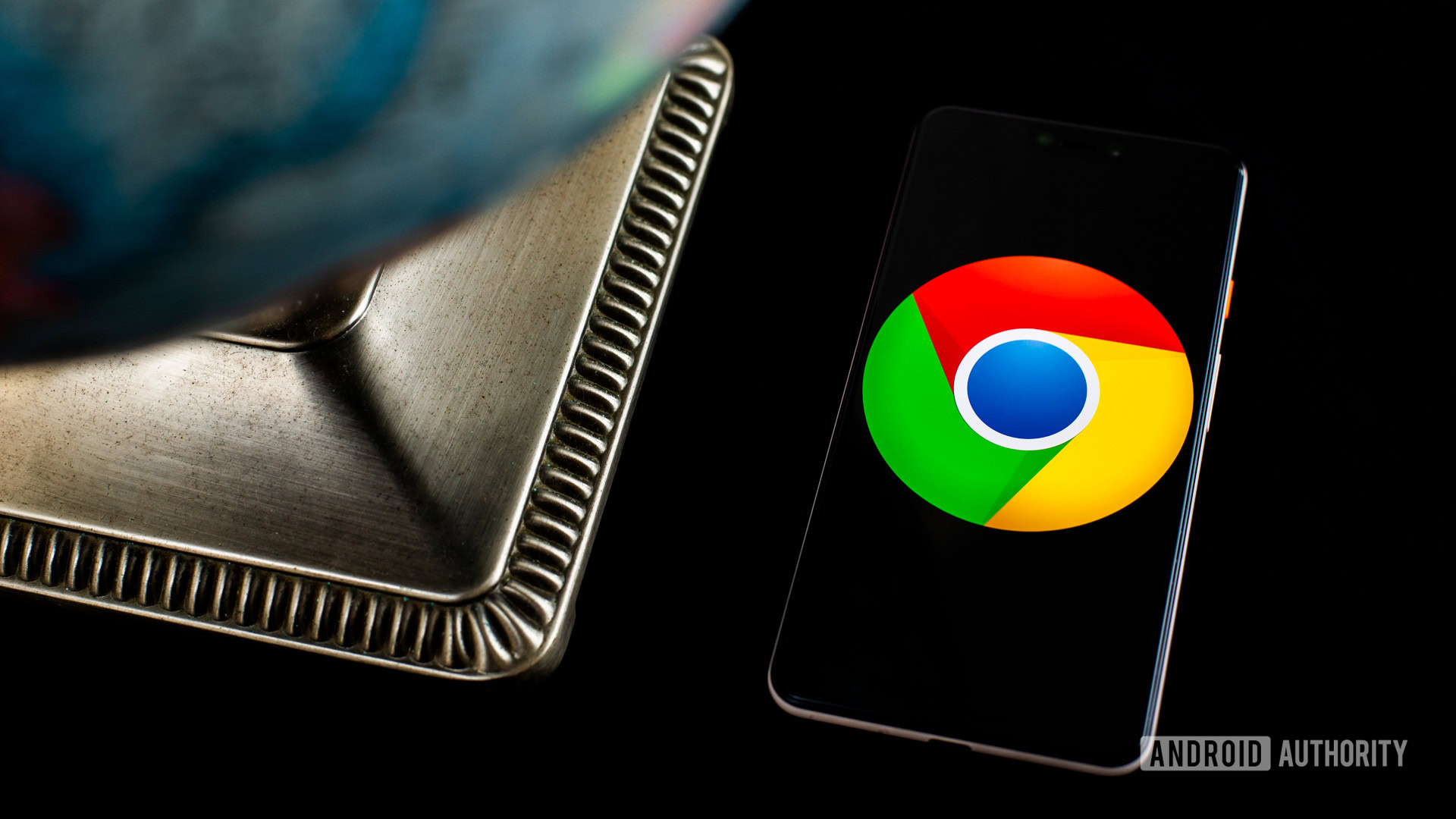
Apple’s Mac computers and its Safari browser have gone hand in hand for years now. It’s a solid app, perfectly tuned for macOS, but what if you want something different? If you have an Android phone, you might be drawn to the dark side of Chrome instead. Let’s stack Safari vs Chrome in the ultimate browser battle and see which is better for your needs.
See also: These Chrome Flags will improve your web-browsing experience
We’ll walk through most of the key features of each browser. After all, you may spend hours working in a browser every day, so you want to pick the best one. Ready to crown a winner? Let’s get started.
Is appearance everything?

We’re not here to argue which browser looks better, but careful design can go a long way. In many ways, this battle comes down to Apple vs Google. You might immediately lean one way or the other based purely on appearances.
Take tab organization, for example. In Safari, you’ll find a grid layout that makes it easy to find any tab in seconds on a desktop. However, Safari turns its tabs into a deck of cards on mobile, requiring you to swipe through an endless list. You can only see the top of each tab, which can be confusing if you have multiple tabs open from one site.
Over on Chrome, you’ll become good friends with the tab bar in a hurry. You can keep adding tabs as much as you want, and they’ll shrink to accommodate new windows. It’s not a bad setup until you can’t read your tabs. Eventually, they’ll be a website logo and an exit button, and you’ll have to cycle through each one.
Chrome can’t seem to make up its mind when it comes to mobile tabs. It’s gone through a few grid layouts, and you can now open new tabs inside tab groups. The idea is to bundle related tabs together, but it’s mostly an easy way to get lost.
How do the Safari and Chrome features stack up?
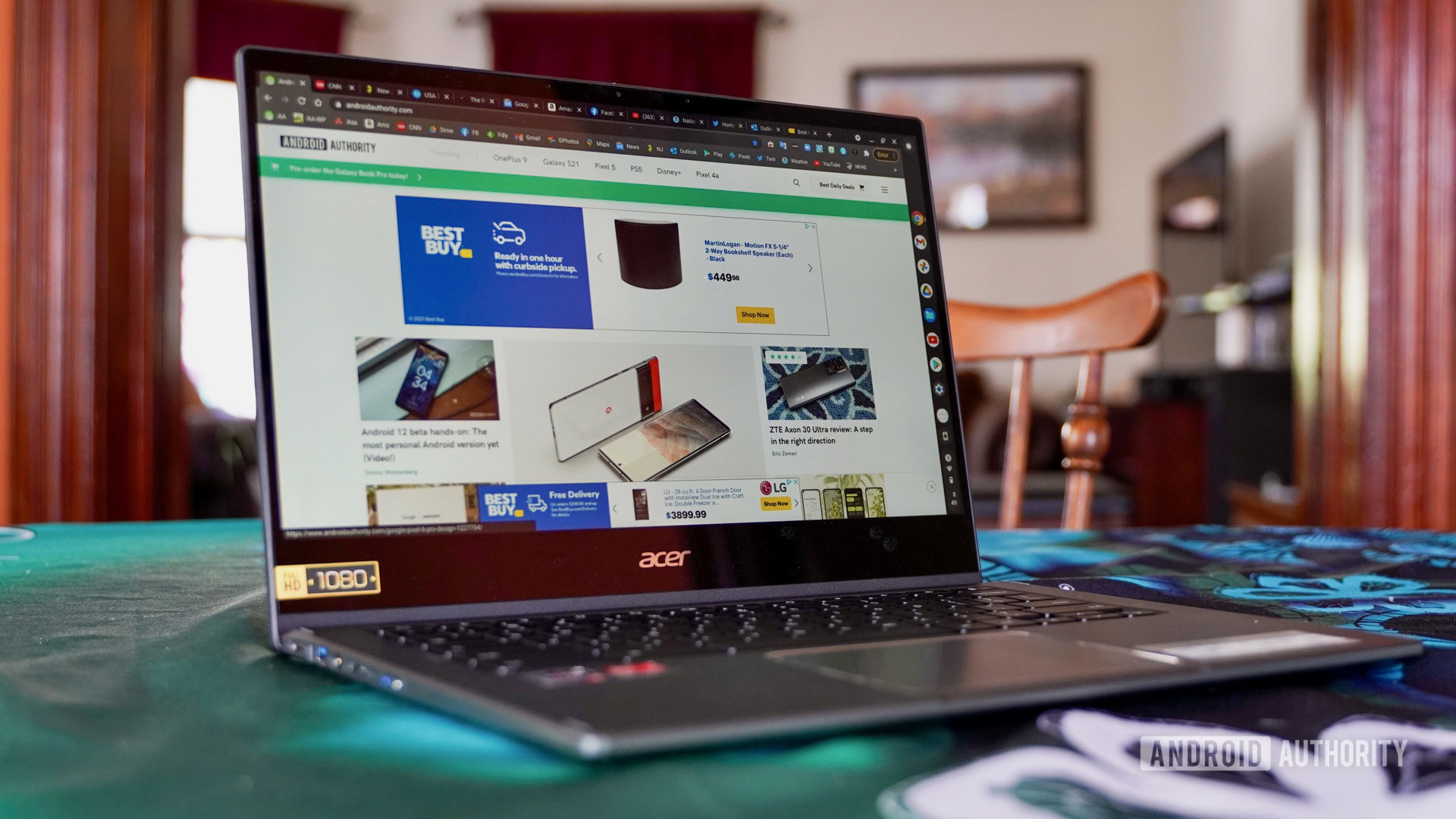
As you might expect, Chrome is the way to go if you’re part of Google’s ecosystem. If you have a Chromecast or some Google Nest devices, getting the most out of them will be far easier. You can right-click just about anywhere in Chrome and look for the Cast option any time you want to put your content on TV, too.
Chrome even comes with Google Translate built right in, so you can translate foreign web pages in seconds. There are thousands of other extensions you can explore as well, and Chrome even has a task manager on board in case you have to halt hefty processes.
See also: The best privacy web browsers for Android
Safari, however, is the king of continuity. If you have an iPad, iPhone , or a Mac, you can easily pass windows and tabs between them. It’s an easy way to take an article with you if you didn’t have time to read it all. Furthermore, you can use your other Apple security measures to verify purchases. Once you check out on Safari, you’ll be prompted for Touch ID or Face ID to protect your purchase.
Unfortunately, it took Apple until Safari 14 to finally introduce extensions. You can now add Grammarly and select password managers to your browser, which brings Safari more in line with features that Chrome has had for a while.
Also, Safari is still unavailable outside of the Apple realm. It’s really only your best bet if you’re all-in on iOS and macOS. If you have a Windows PC or an Android phone, you’ll have to look at Firefox or Chrome for access across all of your devices. It’s not exactly easy to battle Safari vs Chrome when you can only download one of the browsers on half of your devices.
What security and privacy measures are there?
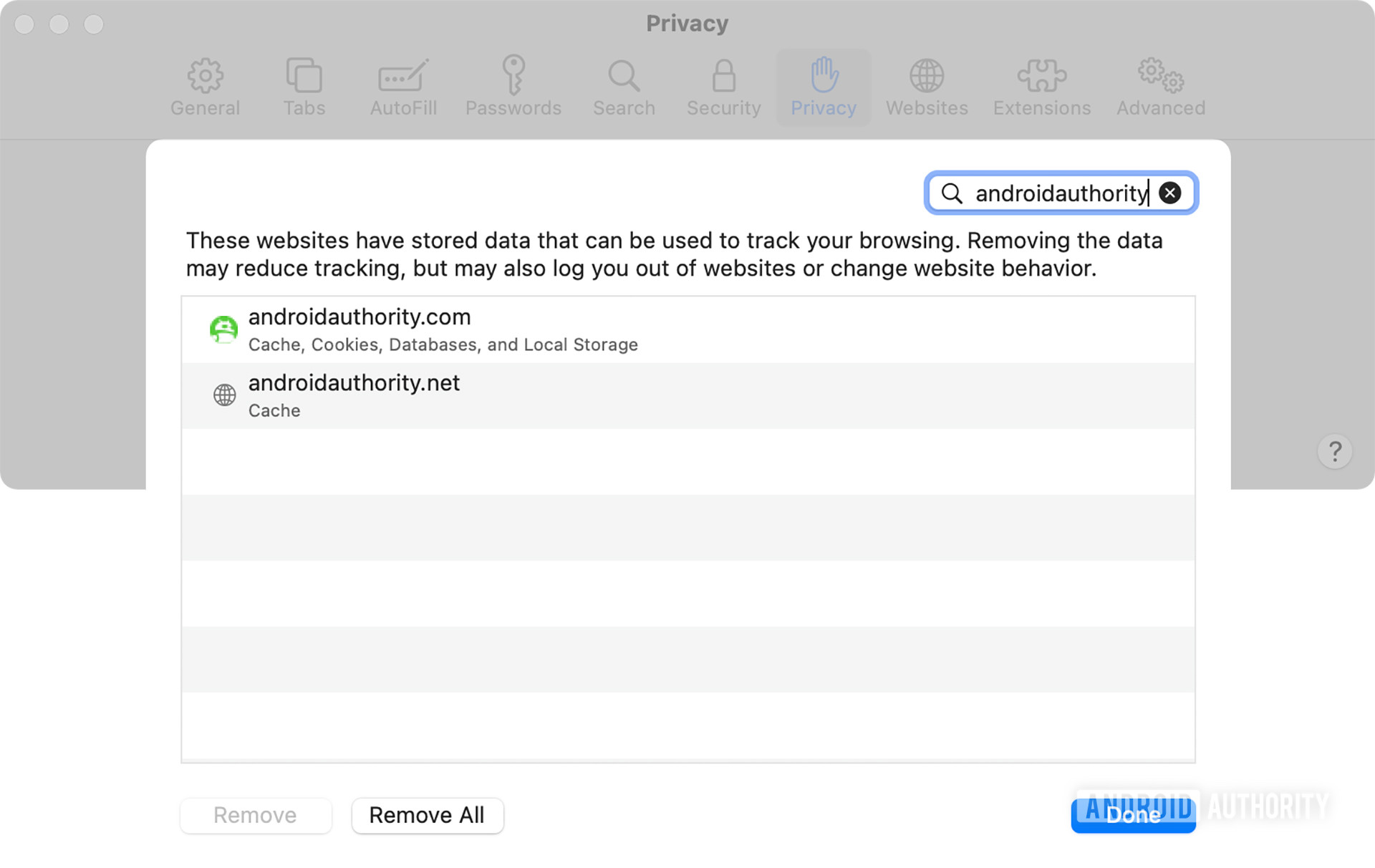
Feeling safe online is an important part of any browser, and it’s a key part of Safari vs Chrome. Both browsers make use of Google’s Safe Browsing database to guard against phishing schemes and other malware. It’s a great way to know that someone is looking out for you while you go about your day, even if you end up sending a lot of data straight to Google.
However, the biggest difference between the browsers comes in update frequency. Updates are an important way to stay ahead of cybercriminals, and Google Chrome has the easy advantage. Safari updates are often tied to macOS changes, but Chrome can push changes whenever it needs to. In fact, you’ll probably get some form of a patch just about every two weeks.
Both browsers block popups by default , but Chrome goes a step further to point out when you venture to an unsafe site. It displays a Not secure warning as well as a small popup window. Safari, on the other hand, indicates safety with a small green lock icon.
While we’re happy to give Google points for security, privacy is another matter entirely. The Mountain View-based company isn’t shy about wanting all of the data it can get its hands on, though it usually explains things away by trying to improve your experience. Common features like website recommendations and predictive search have to come from somewhere, don’t they?
Apple also collects all sorts of information on Safari, including names, locations, and IP addresses. It can share this information as needed, even if it claims not to share encrypted devices with authorities.
See also: How to clear your browser or system cache on a Mac
Is one browser easier to use?
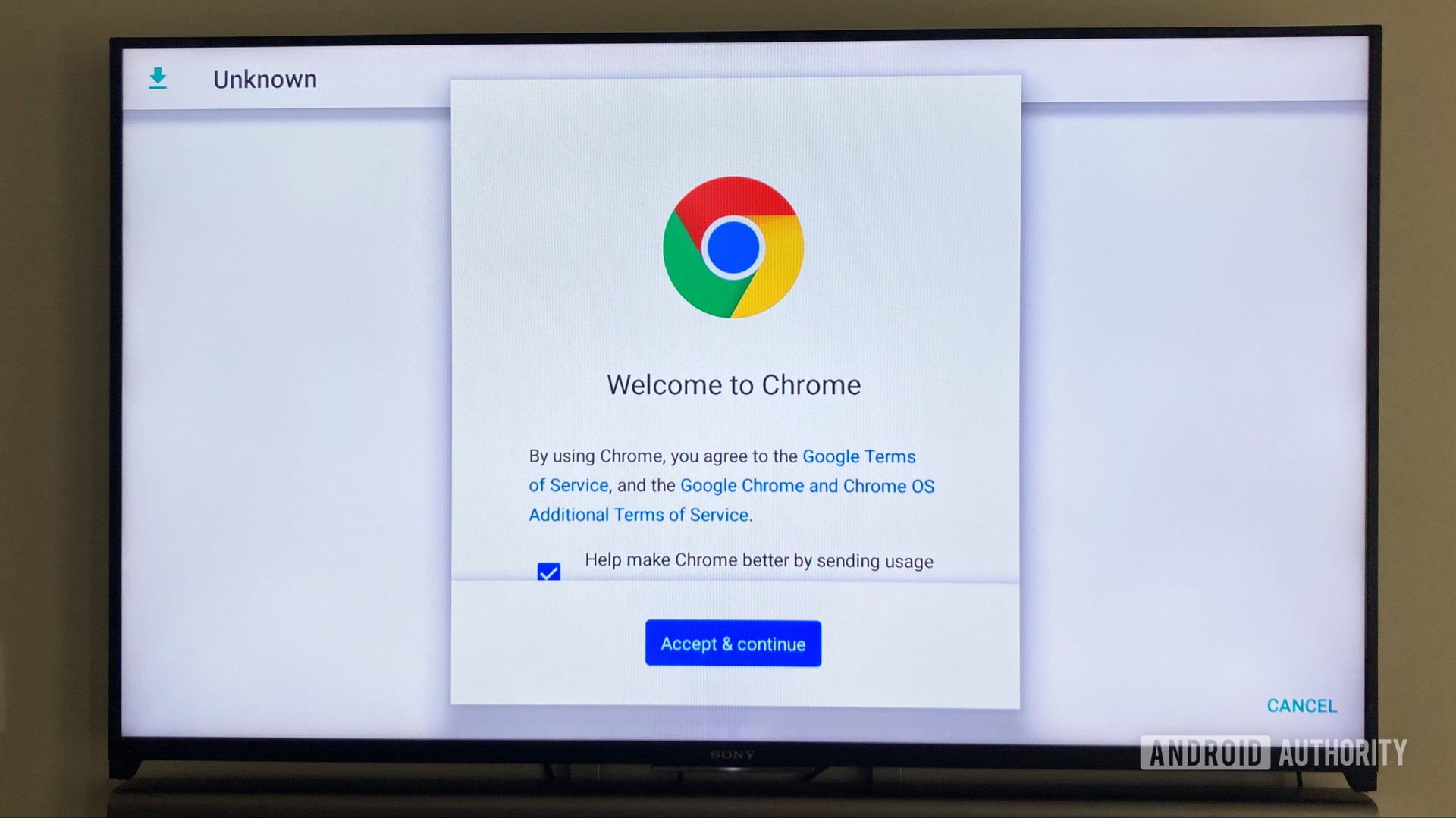
Ease of use in Safari vs Chrome is a fairly subjective point, and it probably depends on your other devices. You’re probably used to Safari if you’re coming from an iPhone, while Android users are probably more comfortable in Chrome. You’ll have to consider which tab setup is easier for your own use, but it’s not hard to adjust between the two.
One of the biggest drawbacks to Safari is that you can’t tinker with settings in the app. You’ll have to head over to Apple’s dedicated settings app if you want to change something. Chrome’s settings — like most browsers — are right in the app, which makes life easy if you want to change on the fly.
Safari vs Chrome: Which browser wins?
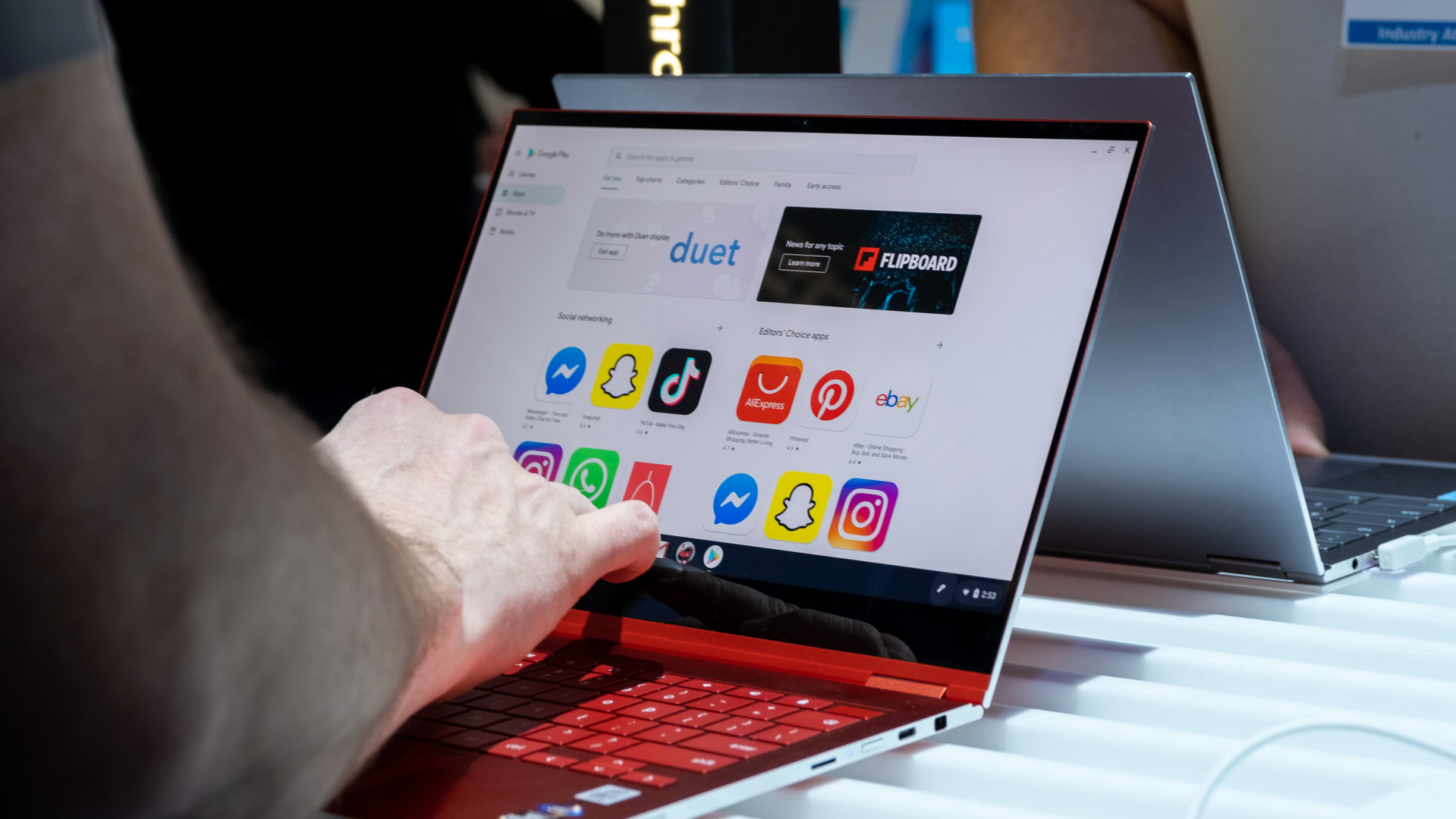
We’ve hinted at it here and there, but the winner of Safari vs Chrome comes down to your needs. If you live completely inside Apple’s ecosystem, you’ll be better off with Safari. The Handoff feature is tough to top, and it’s nice to have some extra security around your purchases. However, you’ll probably want to fire up Chrome if you have other Android or Windows devices in your house. It’s the only way you can still share tabs and login information between devices.
Although we’ve gone pretty deep into Safari vs Chrome, they’re not your only options. If you haven’t been swayed one way or the other, then it might be time to switch things up. There are tons of other browsers to consider, and we’ll touch on a few favorites.
See also: The best Android browsers for surfing whatever website you want
Are there any good alternatives?
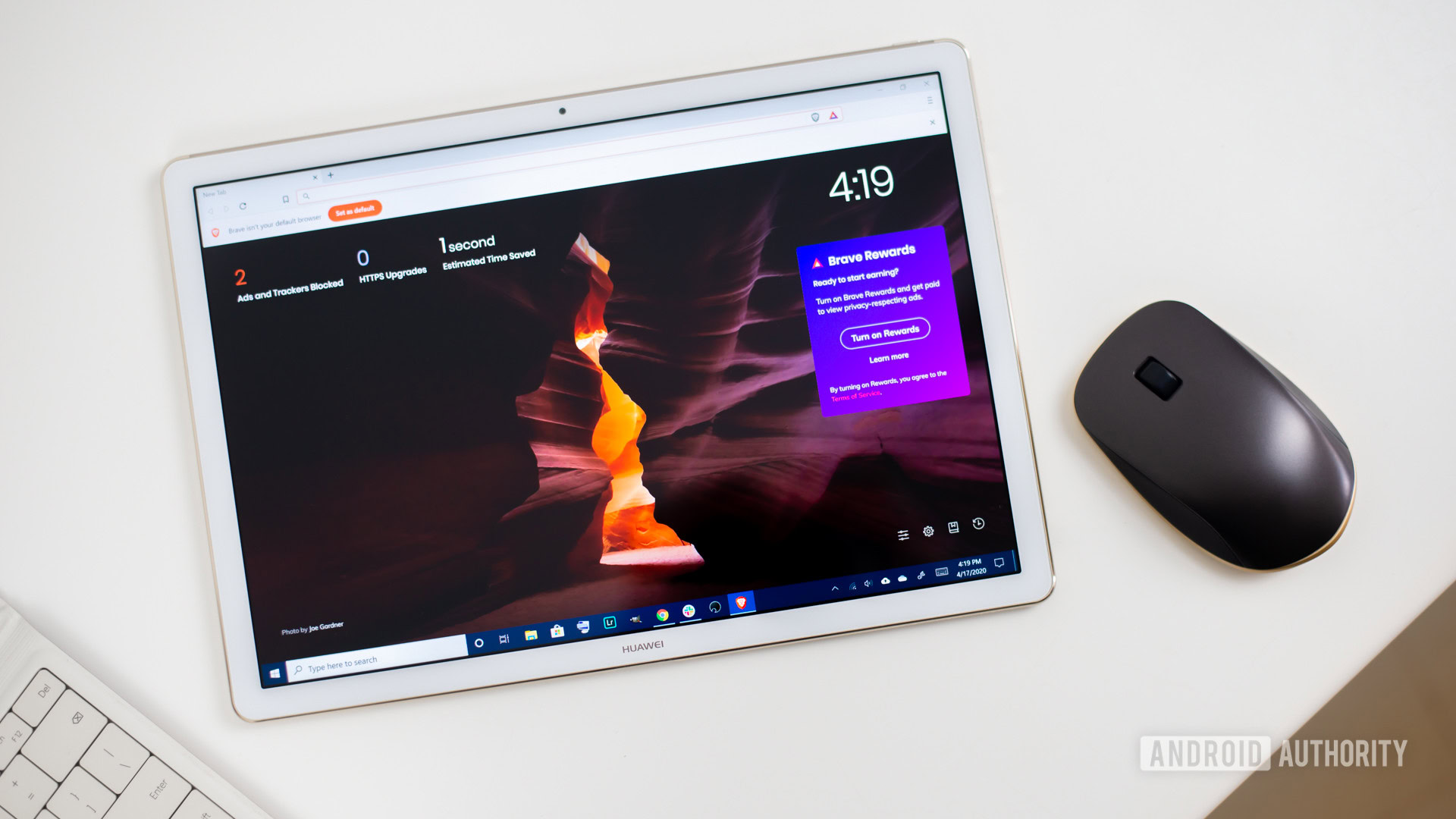
Brave Browser
One of the newer browsers, Brave Browser , launched in 2016 with plenty of features. It packs a built-in ad blocker and features HTTPS just about everywhere you look. Brave offers per-site settings adjustments, and you can even track what you’re blocking. Perhaps best of all is the fact that Brave Browser is free.
See also: Should you switch to Brave Web Browser?
Opera is another good browser alternative, and its messaging feature helps to clean up your overall experience. You won’t have to jump between apps, just open a small message window and keep chats going while you go about your day. Opera also has a built-in ad blocker to keep things smooth and an included VPN if you’re hoping to enjoy geo-restricted content.
If you’re worried about privacy, DuckDuckGo is a good option. Like Brave, it relies heavily on HTTPS and offers a private search mode. It even goes so far as to give each website you visit a privacy rating from A through F. You can’t sync all of your passwords, but the close button wipes your browsing data which is a nice bonus.
- Privacy news
Tips & tricks
- ExpressVPN news
Google Chrome vs. Safari: Which browser is better for iPhone and Mac?
Sonja Raath
Using an internet browser has become an essential part of our daily routine, whether it’s to shop online, stream videos, or read this blog post. But when it comes to choosing a browser for your iPhone or Mac, the decision can be confusing. Should you go with Chrome, the world’s most popular browser known for its versatility, or stick with Apple’s native browser, Safari, for a more seamless Apple experience? We compare two titans of the browser world so you don’t have to.
Jump to… Google Chrome vs. Safari: A quick comparison Google Chrome vs. Safari performance: The pros and cons Google Chrome vs. Safari features: The pros and cons Google Chrome vs. Safari privacy: The pros and cons Google Chrome vs. Safari performance: Which is better? Bonus! Chrome vs. Safari performance: 5 Random facts
Google Chrome vs. Safari: A quick comparison
Google Chrome was developed by Google and released in 2008, quickly becoming the most popular web browser in the world with a current market share of 65%. Safari was developed by Apple and first released in 2003. The latest version of the browser is exclusive to Apple devices .
Read more: Google Chrome vs. Firefox
Chrome vs. Safari performance: The pros and cons
Safari uses less ram than chrome.
While both browsers offer similar features and functionalities, one noticeable difference is the amount of memory they consume. Although Chrome works relatively quickly, it struggles when users have too many tabs open or are running graphic-intensive webpages, leading to drained RAM and slow systems.
Verdict: Safari generally requires less RAM than Chrome and is the better option for Mac users who value battery life, as it is designed to be energy-efficient and uses hardware acceleration to minimize power consumption. However, if you rely heavily on extensions that can quickly consume a significant amount of RAM, Chrome’s tab discarding feature can help improve the overall performance and stability of your devices.
Chrome is slightly faster than Safari
As it’s built by Apple itself, Safari is optimized to work best across iOS and Mac so that it achieves optimal hardware-software integration—it’s also great for conserving battery life on your devices. However, when it comes to speed, how does Chrome stack up?
Google recently made updates to the Chrome browser that have significantly improved its performance on Apple’s devices. And, after running several speed tests on WebSPRT 4 , our results echo that Chrome is slightly faster than Safari on both Mac and iPhone.
But that’s not to say both Chrome and Safari don’t have their highs and lows when it comes to speed.
Verdict: While Safari is known for its optimized performance on Apple devices, Chrome is considered slightly faster. However, the difference in speed is minimal and may not be noticeable to most users.
Chrome vs. Safari features: The pros and cons
Chrome has a clean user interface, but safari’s is more customizable .
A user interface can make or break one’s experience of a browser. While Chrome and Safari have similar functions, they have distinct differences in their designs. Chrome has a more minimalist, modern design while Safari’s is more classic.
Verdict: While Chrome’s clean and minimalist interface is very appealing, Safari offers customizable and flexible features on iPhone, iPad, and Mac that put it ahead of Chrome. Safari’s new tab management features like the webpage hover preview are also a definite win.
Safari supports mobile extensions, while Chrome does not
Extensions can significantly enhance the functionality and customization options of a browser. Chrome has a vast library of extensions, and new ones are added regularly. Safari, on the other hand, has a more curated selection of extensions, but they are generally high-quality and well-maintained. And, while both browsers allow users to install extensions on their desktop or laptop devices, there is a vast difference between the two when it comes to mobile devices.
Verdict: Both Safari and Chrome support extensions on Mac devices. While Chrome has a wider range of extensions available for desktop devices, Safari has a clear advantage when it comes to mobile browsing because of the recent support for web extensions on iOS.
Chrome has more synchronization benefits
Both Safari and Chrome offer syncing features that allow you to synchronize your bookmarks, history, and passwords, and keep your data and settings up-to-date across multiple devices. However, one has slightly better benefits than the other.
Verdict: Google Chrome offers more flexibility when it comes to syncing information across devices.
Chrome vs. Safari privacy: The pros and cons
Is safari more secure than chrome .
From phishing attacks and malware to viruses and hacks—the world of online browsing is filled with online threats. That’s why it’s essential that the browser you use has robust security measures in place to keep your sensitive information safe.
Verdict: Chrome has an edge in terms of customizable security extensions, while Safari has a superior password management system . Apple device users may prefer Safari, however, for its seamless integration with iCloud keychain, while Chrome may be a better choice for those who want more control over their security settings.
Google’s reliance on ads may compromise user privacy
When it comes to keeping your personal data private, is it Chrome or Safari that reigns supreme? While Chrome has a slight edge when it comes to keeping abreast of security threats, Safari has a much better track record of being more transparent than Google when it comes to a private browsing experience .
Verdict: When it comes to user privacy, Safari wins hands-down. Apple is known for prioritizing user privacy and collecting data in a more ethical way than other tech giants.
Chrome vs. Safari: Which is better for iPhone and Mac?
Both Safari and Chrome offer excellent features, and both come with their own set of pros and cons—so, the decision ultimately comes down to what you value most. If you prioritize speed and customization through extensions, Chrome may be the better choice. If you care more about stability and privacy, and you use Apple devices exclusively, then Safari is the way to go.
Read more: Google Chrome vs. Microsoft Edge
Bonus! Chrome vs. Safari: 5 random facts
Google chrome.
- Former Google CEO Eric Schmidt was against the idea of developing an independent browser for many years. Google co-founders Sergey Brin and Larry Page eventually built a demo version which forced Schmidt to change his mind.
- The T-rex in Chrome’s offline Dinosaur Game is named Steve.
- If you open more than 100 tabs on Google Chrome, the tab count on the upper right becomes an old-school smiley “:)” on iOS and “:D” on Android.
- “Facebook” is the most searched word on Chrome, followed by “YouTube”, “Amazon”, “weather”, and “Walmart”.
- The question that Chrome users ask the most is “ What is my IP address? ”
- When choosing a name for its browser, Apple said it wanted it to be a verb. The name “Safari” was chosen because it reflects the browser’s journey through the internet. “Safari” is the Swahili word for “trip.”
- In 2022, Safari became the second browser in the world to have over a billion users. Chrome was the first.
- You have Safari to thank for the many uses of private browsing mode. Three years before Google popularized its Incognito Mode, Safari already had a feature for the temporary suspension of cookies and cache.
- Apple hides “Easter eggs” in its icons all the time. The iOS Maps icon shows the location of Apple in Cupertino, California. Its Calendar icon’s default date is when the app was introduced, and the iOS clock icon shows the approximate time iPhone was announced. However, there is no known symbolism as to why the Safari compass points North East other than it looks aesthetically pleasing.
- The first version of Safari for Windows was released in 2007, but it was later discontinued in 2012 due to low usage.
Do you prefer using Safari or Chrome as your preferred browser? Let us know in the comments below!
FAQ: Chrome vs. Safari
What’s the difference between chrome and safari.
Chrome and Safari are the two most popular web browsers in the world, with some notable differences. Chrome, developed by Google, is available on multiple platforms, including Windows, macOS, Linux, Android. In terms of performance, it is generally considered faster than Safari. Chrome also boasts a larger library of extensions and add-ons compared to Safari, allowing for a more customizable browsing experience.
Safari is developed by Apple and is primarily available on Apple’s devices, including Mac, iPhone, and iPad. It is considered more privacy-focused than Chrome, with features like Intelligent Tracking Prevention (ITP), which blocks cookies from third-party trackers. Safari also integrates with Apple’s services, such as iCloud and Apple Pay.
Overall, while Chrome and Safari offer similar features, they also have unique differences that may make one more suitable for certain users. You can read more about these in the article above.
Is Safari safer than Google Chrome?
Both Safari and Google Chrome are generally considered to be safe web browsers. However, there are some differences in how they approach security.
Safari is known for its strong privacy features and security measures, such as its Intelligent Tracking Prevention (ITP) technology, which blocks cookies from third-party trackers, and its built-in pop-up blocker. Safari also uses sandboxing technology to isolate web content, preventing malicious code from affecting a network.
Chrome has its own set of security features, including built-in malware and phishing protection, as well as sandboxing technology to prevent malicious code from infecting the system. Chrome also provides frequent security updates and patches to address vulnerabilities and threats.
Ultimately, the level of safety you experience on either browser may depend on a variety of factors, including your browsing habits, the websites you visit, and the plugins or extensions you use. Both browsers have their strengths and weaknesses in terms of security. You can read more about these in the article above.
Is it better to use Chrome or Safari on Mac?
Choosing between Chrome and Safari on a Mac depends on your personal preferences and needs.
Safari is the default web browser on Mac and is optimized for Apple’s ecosystem. It integrates seamlessly with other Apple services such as iCloud and Apple Pay, and has strong privacy features such as Intelligent Tracking Prevention (ITP)—which blocks cookies from third-party trackers. Safari is also known for its energy efficiency, which can help improve battery life on Mac laptops, iPhones, and iPads.
Google Chrome, on the other hand, is a cross-platform browser that has a large selection of extensions and add-ons, making it a more customizable option. It also has advanced developer tools, making it a preferred choice for web developers. Chrome is also known for its fast performance and frequent updates.
If you are heavily invested in the Apple ecosystem and prioritize privacy, Safari might be a better option for you. However, if you use multiple devices across different platforms and value customization, Chrome might be the better choice.
Should I switch from Chrome to Safari?
Whether or not you should switch from Chrome to Safari depends on your personal preferences. You can weigh up the pros and cons in the article above to consider if Safari will better meet your needs. It might also be helpful to try using Safari for a period of time and see if you prefer it as a browser to Chrome.
Does Safari have a VPN?
No, Safari does not have a VPN. If you want to increase your online privacy, consider downloading a fast Safari VPN from ExpressVPN that will encrypt all of your internet traffic so your internet service provider and other snoops can’t see what you’re doing online.
Protect your online privacy and security
30-day money-back guarantee
Enjoy a safer online experience with powerful privacy protection
Like what you have read?
Clap for this post. Or share your thoughts!
Subscribe to the weekly blog newsletter
Get the latest in privacy news, tips, tricks, and security guides to level-up your digital security.
- Related posts
- Featured Posts
- More from the author
Google Chrome vs. Microsoft Edge: Which is better in 2024?
Google Chrome vs. Firefox: Which is the better browser in 2024?
Ranked: Best (and worst) browsers for privacy in 2024
Chrome extensions found leaking millions of records
How to remove Safari on Mac and iOS
Dark Web Links: The best .onion and Tor sites in 2024
Tech Friend: 5 great phones under 400 USD
10 signs a shopping website is fake
4 ways to hide from drone surveillance
What is the singularity in AI?
How to track your own luggage
Guide to combat digital stalking and harassment
How to spot (and avoid) listings for jobs that don’t exist
Data for dollars: Beware of cash-incentive deals
Explainer: Google settles class-action lawsuit over Incognito mode
Are age verification laws in the U.S. a threat to digital freedom?
18 interesting and cool things you can do with a VPN app
Slow VPN? Why it can happen & how to fix it
How to reset Chromecast to factory settings
8 reasons to use a VPN for work
Hello sir it’s kind of you help all thank you so much
Unfortunately, Chrome and any other browser on Apple’s IOS is forced to use Safari’s WebKit browser engine. So you really do not get the full experience of another browser like you do on Windows or MacOS. I hope at some point Apple allows browsers to use their native engines but given Apple’s history I think they will have to be forced into allowing this.
I’m recently going back to Safari. I wish there was some way on this planet to totally cut all connection with google due to their massive monopolization of the internet.
I use Safari, Brave, and DDG. I try to never use Google products due to security.
Leave a Comment Cancel reply
Your email address will not be published. Required fields are marked *
You may use these HTML tags and attributes:
<a href="" title=""> <abbr title=""> <acronym title=""> <b> <blockquote cite=""> <cite> <code> <del datetime=""> <em> <i> <q cite=""> <s> <strike> <strong>
ExpressVPN is proudly supporting
Subscribe to the blog newsletter
Choose language.
- Internet Near You
- Cheap Internet
- Fiber Internet
- Rural Internet
- Satellite Internet
- Fixed Wireless
- 5G Internet
- DSL Internet
- Internet & TV Bundles
- Cable TV Providers
- Satellite TV Providers
- Streaming Services
- CenturyLink
Internet Speed Quiz
Compare Providers
Run Speed Test
- Best RV Internet Options
- Best Student Internet Deals
- Best Internet for Remote Work
- Best Smart TV Apps
- GIVE OUR EXPERTS A CALL call 833-481-4463
- Internet Near You chevron_right
- Cheap Internet chevron_right
- Fiber Internet chevron_right
- Rural Internet chevron_right
- Satellite Internet chevron_right
- Fixed Wireless chevron_right
- 5G Internet chevron_right
- DSL Internet chevron_right
- Internet & TV Bundles chevron_right
- Cable TV Providers chevron_right
- Satellite TV Providers chevron_right
- Streaming Services chevron_right
- EarthLink chevron_right
- CenturyLink chevron_right
- Xfinity chevron_right
- Viasat chevron_right
- HughesNet chevron_right
- Frontier chevron_right
- AT&T chevron_right
- Spectrum chevron_right
- Best RV Internet Options chevron_right
- Best Student Internet Deals chevron_right
- Best Internet for Remote Work chevron_right
- Best Smart TV Apps chevron_right
Find Faster Internet Near You
We're here to help you find the best internet based on your needs and location. How we make money
Safari vs. Chrome: Which Browser is Better?

HighSpeedOptions prides itself on providing honest, quality content. While we may be compensated when you make a purchase through links on our site, all opinions are our own. Here's how we make money.
Table of Contents
Safari and Chrome dominate the browser market. But which browser is better? Make the most of your high speed internet experience and compare which of the top two browsers is best for you.
Quick Links
Apple safari, google chrome.
- User Experience
- Privacy and Security
- Device Compatibility
- Performance
- Final Verdict
Baked into Apple’s iOS and MacOS devices, Safari is a robust and feature-rich browser. While it excels at privacy, it does have it’s downsides. Here are a few things to keep in mind when considering Apple’s native browser:
Safari is built from the ground up to work with Apple devices
Exceptionally strong privacy features, seamlessly syncs in the apple ecosystem, performs well on ios and macos, with increased battery life and fast page loading, clean, intuitive user interface, fewer add-ons & extensions compared to chrome, struggles to compete with google’s suite of online services, only compatible with ios and macos devices, fewer customization options.
Google’s Chrome browser dominates in terms of market share , but there are some security and privacy risks to consider. It’s a must-have if you live in the Google ecosystem and its customization is unsurpassed.
Compatible with a range of popular Google services, including Gmail and Maps
Feature-rich user interface, wide variety of native browser apps and extensions, fast, open-source browser, compatible with many devices, google’s data collection raises privacy concerns, the same goes for many chrome extensions and apps, power hungry, which leads to rapid battery drain, uses more cpu and memory than the native safari browser, user experience: chrome.
Side by side, Safari and Chrome check off both of these boxes by sporting a minimalist layout that’s easy to navigate. However, one browser clearly goes the extra mile.
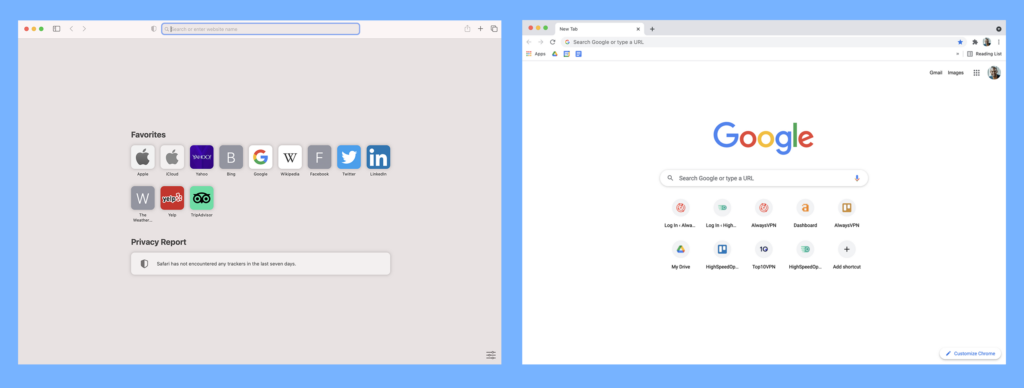
Safari offers a standard tabs organizer, a bookmark manager, privacy settings, and a historical archive. However, the tabs organizer is a little inconsistent across devices. You’ll find a nice grid layout on desktop and a stacked deck on mobile that quickly becomes an endless scroll.
In comparison, Chrome acts as a hub for all Google products. It comes with the same abilities Safari has as well as seamless integrations with Gmail, Google Drive, Google Translate, Google Nest devices, and in-app settings. If you live entirely within the Google ecosystem, Chrome is a must-have.
When it comes to user experience, Chrome takes the lead with its sleek interface, and ease of use.
Features: Chrome
When choosing between Safari and Chrome, features are a significant factor, aside from user experience. Personalizing the browser, merging multiple apps in one window, and performing more actions attract users.
Both Chrome and Safari share common features like bookmarks, reading lists, and history logs across devices. However, the real differentiator is browser extensions. Extensions enhance and modify a browser. While Safari offers only 350 extensions , many of which are pay-to-use, Chrome has over 175,000 extensions in the Chrome Web Store , making it the clear winner for features, along with its Google app integrations.
Privacy & Security: Safari
Chrome and Safari are big on security measures – blocking popups by default, utilizing a Safe Browsing database to prevent malware, and frequently releasing software updates to fix bugs. However, privacy is an entirely different story.
Safari collects data for website recommendations and UX improvements, but offers easy opt-out options. The “Privacy Report” shows trackers blocked weekly, and Private Browsing masks browsing history and blocks cookies. Safari also provides a “Hide My Email” feature to create unique forwarding addresses and Touch ID or Face ID for purchase verification.
Google Chrome isn’t shy about collecting all your data with vague privacy policies and loose tracker practices. Predictive searches, URL suggestions, and even Private Incognito mode becomes a threat to user privacy. It’s hardly surprising since the tech giant’s primary revenue stream is advertising.
Unlike Google, Apple doesn’t rely on ads to keep the lights on, which allows it to put users’ privacy first. If you care at all about your personal pri v acy online , the choice is a no-brainer.
Device Compatibility: Chrome
Chrome works on all major platforms including Android, Linux, iOS, macOS, and Windows. So, whether you’re all-in on Apple products or prefer to mix things up, you can access your Chrome information across devices.
Safari is limited to iOS and macOS devices. Unless you have an iPhone, iPad, or Mac computer, you’re out of luck. The winner here comes down to what hardware you use. Safari is the default browser on all Apple devices, but if you want more flexibility, Chrome will work across all of your devices.
Performance: Safari
If used for general, light browsing, Safari and Chrome perform similarly in terms of speed and power consumption. However, when you start to work in multiple tabs, Safari is far superior.
Google Chrome’s 12-hour power consumption is significantly greater than Safari. Keep this in mind if you travel or spend long hours away from an outlet.
Safari offers better hardware-software integration, which is no surprise since it only works on Apple devices. On average, it loads websites 50% faster than Chrome and lasts 1.5 hours longer when browsing or streaming videos . This is because Safari uses minimal RAM while running compared to Chrome. If you rely on fast internet speeds , we recommend using a lightweight browser like Safari every time.
Safari vs Chrome: Final Verdict
After analyzing both browsers, we found Chrome to be the best choice. It offers seamless integration, advanced features, and compatibility across devices. But for those prioritizing privacy, Safari is your go-to option. It’s equipped with built-in defense mechanisms that you can rely on.
Find providers in your area
Share this post:, featured posts.
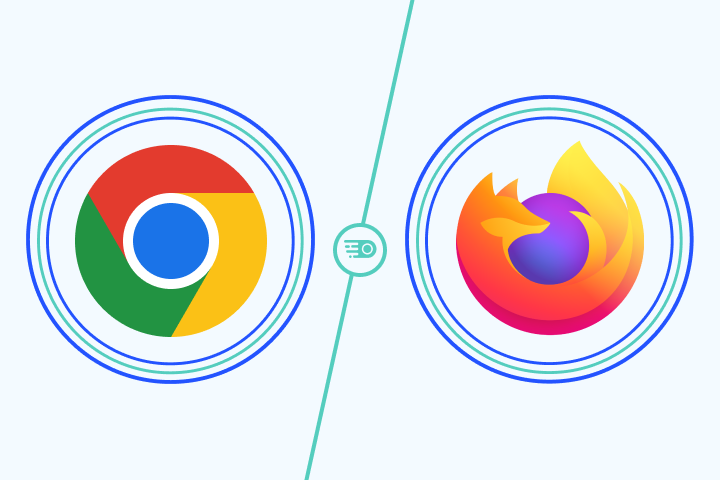
Chrome vs. Firefox: Which Browser is Better?

Is Google Fiber Worth the Hype?

10 Ways to Secure Your Home Network
Privacy overview.
We review products independently , but we may earn affiliate commissions from buying links on this page. Terms of use .
Chrome, Edge, Firefox, Opera, or Safari: Which Browser Is Best for 2024?
Don't take your browser for granted we help you narrow your options by comparing the best web browsers on speed, privacy, and other important features..

Most people browse the web using Google Chrome without really thinking about their options. Gmail or YouTube or some other site once suggested they use Chrome, and perhaps they never questioned it. The truth is you do have options when it comes to your web browser, and you may find another that serves your needs better. Browsers offer varying levels of privacy, security , performance, and power efficiency. They differ even more when it comes to unique and helpful features beyond merely displaying websites.
Here we examine the top five browsers in the US, in order of popularity. That criterion rules out Brave and Vivaldi , with usage rates hovering near or below 1%, even though they are both first-class browsers. If you're interested in those two, check out our article on the best alternative web browsers . Or, if your utmost concern is security, see what makes the best private browsers different.
Below are short reviews of the top five browsers. After that, keep reading for more information about the browser landscape, additional details about our testing, and advice on what you should take into consideration when choosing a web browser.
Google Chrome

Google Chrome Web Browser
Most people need no introduction to the search behemoth's browser, Google Chrome. It’s attractively designed and quick at loading pages. Most website codes now target Chrome, so compatibility is seldom an issue. Chrome is available for all major platforms, and the mobile version offers syncing of bookmarks, passwords, and settings.
Chrome doesn't have many unique browsing features, however, and it's the only browser included here that you won't find in the desktop app stores for macOS and Windows. There’s no built-in VPN, no cryptocurrency locker, no note feature, and no screenshot tool. Google has announced a feeble gesture towards adding a reading mode; feeble because it will only be in a sidebar, with the full, noisy distracting page still displaying in the main central browser window. The lack of a true reading mode makes sense for a company that earns its keep through web ads since reading modes hide them. All the other browsers here have full-page reading modes.
Chrome allows multiple user profiles, meaning different users of the same computer can have their own browser settings, history, and favorites. The browser also finally caught up with others by adding a Share icon to the address bar that eases sending sites via social media or email.
A few years ago, Google controversially announced it would be removing the API function that allowed ad-blocker software to fully block ads. As of now, it seems ad blockers may be limited starting at some point in 2024. Some Chrome development, though, has centered around security and privacy, notably among them a plan to kill off tracking cookies in favor of Google's tracking mechanisms. The company's Privacy Sandbox initiative (in development) tries to cater to both ad targeting and user privacy . Some worry both of these developments will only result in more consolidation of the company's grip on web advertising and user profiling.
Apple Safari

Apple Safari 5
The default Mac and iOS browser is a strong choice, though its interface has some nonstandard elements. Safari was a forerunner in several areas of browser features. For example, it was the first with a Reading mode, which cleared unnecessary clutter like ads and videos from web articles you want to read. That feature debuted in 2010 and has made its way into all other browsers except for Chrome.
Apple has brought up the topic of fingerprinting protection—preventing web trackers from identifying you by your system specs. Unfortunately, the EFF's Cover Your Tracks test site only shows partial protection from trackers in Safari, while several competitors get a result of Strong protection. Other benefits include Apple Pay support and a "Sign in with Apple" feature to replace Facebook and Google as web account authorizers.
In macOS Monterey, the browser gained a compact tab bar with floating tabs like Firefox's and Tab Groups that live in a convenient sidebar, and with Ventura , they become shareable and pinnable. Safari also supports Apple's proprietary Shared with You feature in its proprietary iMessage system. For iCloud+ subscribers, a Private Relay obscures your IP address, similar to a VPN.
If you use an iPhone and a Mac, Safari integration makes a lot of sense, since Apple’s Handoff feature lets you continue your browsing session between devices. Safari trails other browsers on support for emerging HTML features, but we haven’t run into or heard of any major site incompatibilities with it.
Microsoft Edge

Microsoft Edge Web Browser
The latest version of Microsoft Edge uses Chrome’s webpage-rendering code, Chromium, guaranteeing site compatibility and freeing up its developers to add unique features. You won’t run into the site incompatibilities users of the previous incarnation of Edge occasionally encountered, and the browser performs snappily. Edge now runs on Apple macOS and Windows 11 and earlier. Mobile versions for Android and iPhone let you sync history, favorites, and passwords.
Edge is a leader in performance, thrifty memory management, and disk usage. Startup Boost technology reduces the time it takes to open the browser, and sleeping tabs save memory on tabs you're not viewing. Edge's Efficiency mode can extend laptop battery life. The initial focuses for the browser were privacy, the customizable start page, and the intriguing Collections feature for web research. For enterprise customers who still rely on Internet Explorer to run legacy programs, Edge offers an IE Mode .
The Collections feature uses a sidebar onto which you can drag webpages and images, write notes, and then share the whole assemblage to Excel, OneNote, or Word. It's a great organization and planning tool . Edge's Immersive Reader mode not only offers distraction-free web reading, stripping out ads and nonessential eye candy, but it can also read webpage text aloud using lifelike Neural Voices. It's worth trying because it reads with sentence intonation, rather than simply word by word, as we’ve come to expect text-to-speech audio.
Other notable Edge options include built-in web sharing, tabs down the side rather than across the top, a built-in screenshot tool, automatic coupons for shopping sites, and timely themes to dress up your browser. Recent additions include a side panel that integrates the new Bing AI chat search , game controller haptic feedback, and a multitasking side toolbar that lets you access first- and third-party services for social networking, search, messaging, search, and productivity.
Mozilla Firefox

Firefox Web Browser
Firefox, an open-source project from the nonprofit Mozilla Foundation, has long been a PCMag favorite. The browser has pioneered many web capabilities and the organization that develops it has been a strong advocate for online privacy. It’s also notable for its wealth of available extensions. The unique Multi-Account Containers extension lets you sequester multiple logins to the same site on different tabs. Without it, you'd have to open a private browsing window or another browser to sign out of all your web accounts and start a fresh session.
Mozilla’s browser is in the vanguard of supporting new HTML and CSS capabilities, and the company is working on open-source AR and speech synthesis standards. The organization now offers a full password management service called Lockwise, which can generate complex passwords, sync them between devices, and secure everything under a strong master password. That and the organization's VPN offering are paid extras.
The mobile Firefox apps offer excellent interfaces, and you can send a webpage tab from any device to any others that are logged into your syncing account. That’s right: You can be reading a webpage on your desktop PC, and have it instantly open on your iPhone or vice versa. It's a slick and useful feature.
If that’s not enough, Firefox has a Pocket button in the address bar, letting you save a page for later viewing anywhere with one click. The Reader View button declutters a webpage loaded with ads, promos, and videos, so you can peruse it with no distractions. PiP video supports closed captions and HDR and AV1 video formats. The browser is ultra customizable, letting you select and arrange buttons on the toolbar to taste, as well as select from a large number of Theme add-ons that change window border patterns and colors.
Recent additions include PDF editing and the Firefox View feature, basically a pinned tab of recent sites that syncs between the desktop and mobile versions of the browser.

Opera Web Browser
Perennially hovering around the 2% usage level, the Opera browser has long been a pioneer in the segment, inventing basic browser innovations like tabs, CSS, and the built-in search box. Opera can make a bigger privacy claim than the other browsers here—if you’re a believer in VPNs. It includes a built-in VPN (actually an encrypted proxy server) that protects and reroutes traffic from Opera to cloak your IP address. Opera uses the Chromium page-rendering engine, so you'll rarely run into site incompatibilities, and performance is fast. It's available for all major platforms, and the Opera Touch mobile browser is a beautifully designed app that connects (via quick QR scan) to your desktop.
Beyond the VPN, another unique feature in Opera is its built-in ad blocker, which also blocks crypto-mining scripts and trackers. Ad blocking also means less data consumed, especially of interest to those using metered connections or mobile plans with data caps.
More unique features in Opera include its Speed Dial start and New Tab page, as well as its quick-access sidebar of frequently needed services like WhatsApp or Spotify. My Flow lets you send webpages and notes between devices easily. The browser also includes a video pop-out window, a Pinboard feature similar to Edge's Collections, and a Workspaces feature that lets you create function-based tab views. Opera uniquely offers a cryptocurrency wallet as an option, which supports most popular tokens.
Opera offers a gaming version called Opera GX , and the company recently bought a gaming engine , moving into that specialty even further. The company also offers a futuristic secure Crypto Browser for navigating Web3 . And like Edge, Opera is adding AI ChatGPT capabilities to the browser , starting with a summarizer tool for text you highlight or even full sites.
More Inside PCMag.com
- Stop Trackers Dead: The Best Private Browsers for 2024
- Go Beyond Google: The Best Alternative Search Engines
- Has Chrome Lost Its Shine? These Are the Best Alternative Web Browsers
About Michael Muchmore
PC hardware is nice, but it’s not much use without innovative software. I’ve been reviewing software for PCMag since 2008, and I still get a kick out of seeing what's new in video and photo editing software, and how operating systems change over time. I was privileged to byline the cover story of the last print issue of PC Magazine , the Windows 7 review, and I’ve witnessed every Microsoft win and misstep up to the latest Windows 11.
More From Michael Muchmore
- The Best Mobile Video Editing Apps for 2024
- Adobe Acrobat Gets Generative AI in Time for Tax Day
- Adobe Generative AI Tools to Help Editors Add, Remove Objects in Premiere Pro
- Corel VideoStudio Ultimate
- The Best Video Editing Software for 2024

Google Chrome vs. Apple Safari: Which browser is better on Mac
- Cross-platform availability can make the switch from Chrome to Safari seamless, with data and preferences intact across devices.
- Safari's user interface impresses with a clean layout, while Google Chrome offers more customization options in its Material You makeover.
- Safari's memory usage advantage over Chrome on Mac with 8GB of RAM is a key factor to consider if performance is a concern.
As the default web browser on Mac, Safari has received a steady stream of updates over the last few years. Apple releases new builds for all its apps and services with yearly OS updates. While we applaud Safari improvements on Mac, the burning question remains the same: is it good enough to prevent users from switching to Chrome? How does it compare to everyone’s favorite web browser out there? Read our comparison post before you change the default browser on your Mac , iPhone, or iPad.
Google Chrome vs Microsoft Edge: Which browser is better?
Cross-platform availability.
Before we pit Safari against Chrome, let’s check their cross-platform availability first. After all, you won’t want to leave your web bookmarks, history, quick links, and other preferences behind when you switch to another platform.
As expected, alternating is a breeze with Chrome, since the browser is available on most smart platforms you can think of. Whether you use Mac, Windows, iPhone, Android, or ChromeOS, you are ready to surf the web with all of your personal data and a familiar interface. In contrast, Apple’s walled garden approach has limited Safari’s availability to the company’s devices only.
User interface and theme
Being the first-party app on macOS, Apple has nailed the esthetics of Safari. Let’s start with the homepage. It carries all the essential elements you need when you fire up the browser. You can check your favorites, recently closed tabs, reading list, privacy report, Siri suggestions, and even apply minimal wallpaper to the background. If it’s too busy for you, customize the entire homepage from the bottom menu. Overall, it’s not as busy as Microsoft Edge and doesn’t look as bland as Chrome’s homepage. Safari also offers a cool translucent effect at the top when you scroll through webpages. Unlike Chrome, there is no theme store to change the look and feel with a single click.
Google Chrome recently received a neat Material You makeover on the web. While Material You on Chrome matches the rest of Google services, it does look slightly out of place with other Mac apps.
Tab management
Do you often have dozens of tabs open during long research sessions? Managing and switching between them can be cumbersome after a while. Here’s where Chrome and Safari’s tab groups come into play, where you can organize relevant tabs under different groups. Safari does have a couple of additional tricks up its sleeve though.
When you create several tab groups on Safari, you can check the entire list from the vertical sidebar. Safari also lets you create different profiles to keep your browsing data separate, such as tabs, history, cookies and website data.
You can assign a different symbol, color, and separate extension list for Work, School, or Personal profiles. There is also an option to share a tab group with your iMessage contacts.
Chrome vs. Safari: Features
Let’s compare Safari and Chrome based on extension support, reading mode, and other novelty features.
Reading mode
Apple offers a seamless reading mode on Safari that you can customize with different backgrounds, fonts, and sizes. In comparison, Chrome’s reader mode leaves a lot to be desired. It opens the article in a sidebar and doesn’t necessarily hide all the distracting elements. Safari wins hands down here.
While Safari covers the essential extensions from top VPNs, password managers, and other third-party developers like Grammarly, Pocket, Raindrop, and Notion, the overall collection is still slim compared to Google Chrome.
If your workflow depends on dozens of extensions, think twice before switching from Chrome to Safari.
Seamless sharing
Shared with You is a niche Safari feature that is tightly backed in iMessage. Links shared with you in the Messages app automatically appear in the Share with You section in Safari. It is only useful for those who frequently exchange weblinks in iMessage conversations.
Instant conversion and translation
Both Safari and Chrome support instant currency conversion and basic math equations. For example, you can quickly get a final number when you type $1000 to INR or 45*3 in the address bar. Chrome goes a step further with Google Translate integration - you can simply type Hello in French and get results instantly.
Chrome vs. Safari: Password management
Both browsers offer basic password management to save your login credentials. Safari uses iCloud Passwords that can sync with all your devices. It supports autofill, Passkeys, verification codes, notes, and more.
Google Password Manager also supports notes and checkup. Like security recommendations on Safari, Chrome Password Manager’s checkup tool shows your leaked, reused, and weak passwords.
Privacy and security
The built-in standard protection on Chrome warns you of harmful files, extensions, and corrupt sites. Safari is a step ahead with iCloud Private Relay. It’s a privacy add-on for Apple One and iCloud+ subscribers to hide your IP address from websites you visit. The option is enabled by default and works silently in the background. When you visit a website in Safari, no one, including Apple, can see who you are or which sites you are visiting. It’s not as extreme as a VPN connection and doesn’t break your browsing setup. You can check out our dedicated guide if you'd like to learn more about iCloud Private Relay .
Safari also offers a privacy report that shows the number of trackers it has blocked from profiling you in the last 30 days.
Performance
When it comes to performance, you won’t find any major differences between Chrome and Safari on a high-speed internet connection. However, if your Mac has a slow network connection, you may notice that Safari can load webpages faster than Chrome, something that Avast confirmed in their dedicated speed comparison for major browsers.
While we are on the topic of performance, we should also factor in compatibility. Since Google Chrome (built on Chromium) is the most popular web browser out there, developers test and optimize their offerings for it. You may run into performance issues with specific websites (like Photopea, a web-based Photoshop alternative) on Safari.
Memory usage
Safari is a relatively lightweight web browser compared to Chrome. This is expected, since Chrome has been infamous for high RAM usage. We opened a couple of identical tabs on Chrome and Safari and checked their memory usage from the Activity Monitor. We will let the screenshot below do the talking.
Mac users with 8GB of RAM will surely appreciate Safari’s approach to memory usage.
Chrome vs. Safari: Mobile experience
Both Apple and Google have done a solid job with their iOS apps. They use a bottom bar with all the essential options. You can also use Chrome password manager as the default method to autofill login info. Chrome’s default Discover menu with news articles may irritate some users. Interestingly, Google has done a better job than Apple when it comes to widgets, as Chrome offers more widget options than Safari. Most notably, Chrome offers lock screen widgets which are missing from Safari.
Browse the web in style
Are you still unsure about the pros and cons of Chrome and Safari? Allow us to simplify the situation. Safari shines with better UI, low memory usage, and integration with other Apple apps. Chrome strikes back with cross-platform availability, rich extension support, and Google Translate integration. If you notice performance glitches while browsing the web, check CPU usage on Mac .
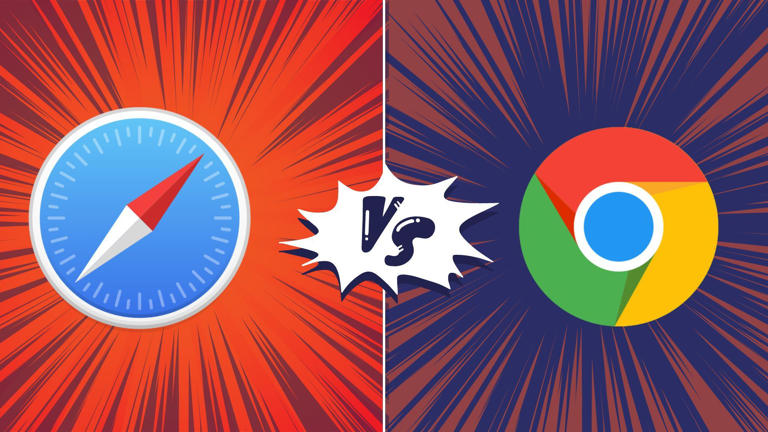
Google Chrome vs Safari
%20500x500.webp)
Google Chrome vs Safari Screenshots
.webp)
Google Chrome vs Safari Video Comparison
.jpg)
Video Chapters
0:00 - Intro
0:15 - Browser Wars
2:19 - Arc Browser
3:06 - Arc Features
5:38 - Chrome Stagnation
7:00 - Safari
8:41 - Switching from Safari to Arc
9:52 - Brave
11:11 - Vivaldi & Firefox
11:43 - How most browsers make money
12:28 - Best Browser Verdict
Google Chrome vs Safari Verdict
Web browsers overview.

Google Chrome
The browser by Google.
What Is Google Chrome?
Chrome is the most popular browser in the world, owning over 60% of the browser marketshare—so chances are, you're reading this site in Google Chrome right now.
Love it or hate it, you should appreciate it. Without Chrome, the Chromium engine wouldn't exist—why does that matter? Well the open-source browser foundation that was built by Google is likely powering whatever browser you're using right now.
All-in-all, Chrome is great. It was our main browser for over a decade. And yes, we tried all of leading browsers on the market ( Safari , Brave , Firefox , Opera , Vivaldi —even giving Edge fair shot when they introduced OpenAI into the mix).
We continued going back to Chrome —it was just familiar and worked well, especially if your personal and work life are tied to Google (as many are).
Well... That was up until Arc (by The Browser Company).
Who Google Chrome is For?
If someone is solely looking for the most stable internet browser on the market.
If you're using Windows, Linux, or an operating system outside of MacOS.
Who Isn't Chrome For?
If you're using MacOS, then there's actually some exceptional alternatives on the market. Now, that doesn't mean that Google Chrome isn't for you if this is the case, but what we are saying is that you have options, and should consider trying the browsers listed on our best browser software & tools list.
Of all the Chrome features, this was one of all the key features that we were most excited about. If you're using Chrome, you've probably experienced first-hand tab overload. And heck, you've probably even experimented with alternative tab management browser tools like Workona or Toby .
Tab management is where Chrome has always struggled, and tab groups were set out to solve this issue:

Rather than describe all of the features you're probably already familiar with like tabs and bookmarks, I think it's time better spent explaining why you shouldn't really expect new features with Chrome.
When you have a product that has billions of users and hundreds of millions of companies relying on it, you need to focus on stability over everything else.
Is that why it took the Chrome team over a year of beta testing "Tab Groups" before publicly releasing it? Oh, and then only leaving it core to the new tab experience for a few months before ultimately disabling it and making it a manual opt-in feature.
Yeah, that's because of inertia. Billions of people are expecting the browser to work one way, you can't have core functionality change one day without pissing off potentially hundreds of millions of people .
Okay, okay, so all of that is totally fair... But also sorta a boring answer 😅 okay, you win—let's ruffle some feathers!
Ah good-ol bookmarks! Tried, true, and tested. Do they actually work well for referencing back what you saved? Nope! But they are familiar, so don't touch them!
Wait... You said they don't work well —let's dive into that for a moment. Hear me out—bookmarks weren't actually created to make finding pages you're looking for to be easier.
The more you use bookmarks, the less you search Google to find what you are looking for, and the less ads that Google can serve you. Ah! Misaligned incentives! Get overwhelmed with all your open tabs? Google wants this! It results in you closing the overwhelm of tabs, only to later search Google to find back what you're looking for.
What if bookmarks and tab management could be rethought and reinvented 🤔 well they can be, that's why much of Chrome's team have left Google to join Arc Browser to actually build out all the ideas that they had at Google but were killed because releasing them would actually hurt Google's Ad business. 🤯
Rating: B+
The best part about Chrome for mobile is that it works cross-platform, from iOS to Android, and everything in-between. That said, it's quite standard with what you'd expect (for better or worse).
Things counting against it though are that they don't have the address bar at the bottom of the screen (which makes it far more reachable on mobile). Even Apple put the address bar at the bottom of the screen with Safari on iOS because it just makes sense.
This is where we feel the mobile app is lacking. It just hasn't changed much, just like the desktop app. But that's also what people love about it, so I suppose that's what you get with Chrome. At least they're consistent with who they are and what they're trying to accomplish.
Competition
Before Arc, I've have just told you that the major competitors on the market were pretty much the same thing, with slight opinionation. Take Brave , the privacy-focused opinionation. Looks and feels almost identical to Chrome, but you don't need to sign up with an email address to use it (you instead have a hash key).
Final Verdict
If you're on MacOS, give Arc Browser a shot—it's essentially what Chrome could have been if they didn't rely on an ad business (although it's coming soon to Windows as well). It genuinely rethinks from the ground up of what a browser is, and could be. They bake in delight into every interaction, and it just does more.
Native Integrations
Custom integrations.
There is currently no promo code for this app but we are close partners , so if you use the link above to visit the site and then let their team know that Efficient App sent you, you may just get a little something... extra 😉
There is currently no promo code for this app—we'll update it here if that changes in the future!
The battery optimized browser built by Apple.
Safari Comparison Summary
This is the default browser that comes with mac devices, and has existed for over a decade.
With Safari, you're not going to get anything too cutting-edge or innovative, because they, like Google Chrome are focused on stability for their 1+ billion users.
For a further breakdown in understanding the negatives that come with browsers that have hit major scale, refer to our Chrome vs Safari comparison.
Features & Differentiation
Since Apple is a hardware company at the end of the day, the whole point of Safari is that you're going to get a great cohesive experience if you're using all Apple products (Mac + iPad + iPhone).
The largest benefit to be had here, in our eyes, comes from Apple owning both the hardware and software layers. This allows them to go above and beyond with optimizations like battery life and cross-device syncing.
While they have baked in password management
We don't really see much major innovation or differentiation coming to Safari though. Why? Because this isn't Apple's core business. Not only that, but Apple has zero interest in going after the B2B and collaborative browser space. When comparing Arc Browser vs Safari , you'll see first-hand that Arc has a lot more going on in the features and differentiation space as they ultimately want to be the browser for teams and collaboration.
Tab Management
We do applaud Apple for adding tab groups, and allowing for them to be on the side of the browser window. There's some small similarities when comparing Safari vs Brave in the recently released sidebar tab management in Brave and Arc .
User Interface (UI)
With Safari, you get a familiar and safe UI. It looks like a browser, it looks pretty much the same as it has the past decade, and it's relatively bland in terms of how it looks.

There's just not much to mention here, but the truth of the matter is some of this is by design. Their focus is to be stable, functional, and to let the content of the website you're currently on, shine.
User Experience (UX)
Rating: b-.
This is where we can give Apple some props on the user-experience, if of course you're also using other Apple products. Take for example you visit a website on your iPhone, you get a prompt in your MacOS dock that shows a website was just opened on mobile. Want to open it up on your desktop? Simply click the Safari icon in your software dock.
In actually using the browser though, there's nothing in particular that stands out as an exceptional UX. This category in particular is where Arc shines. They have the smallest UX details, that just makes using the browser on the day-to-day so incredibly enjoyable.
Final Thoughts
Are you a huge Apple fan? Do you only care about getting the best possible battery performance on your MacBook and nothing else matters to you? Do you absolutely despise change? If so, Safari is probably fine for you.
If you're on the other hand sort of bored when looking at the existing browser market and wish you could get a bit more enjoyment and productivity out of your browser, then that's where you should definitely be giving Arc a shot.
Genuinely, give Arc a shot for a week straight as your daily driver, and I'm willing to bet you that you never come back to Safari again.
Arc Browser is genuinely what Apple could have made, had they re-thought the browser from the ground up, without all the baggage that currently exists with Safari. And for that reason, that's why we rank Arc at the top of our best browser apps list. Genuinely wouldn't be surprised if Apple one day acquired Arc and replaced it with Safari as the default browser for MacOS.
Best Web Browser 2024? Arc vs Chrome vs Safari vs Brave
Google chrome & safari alternatives.
Curious how this app compares to others?
Google Chrome + Safari Alternatives
.webp)
Google Chrome vs. Safari: Which Is the Most Secure macOS Browser?
Whether you've got a Mac or MacBook, you need to know which is the better browse to use. Safari vs. Chrome: which is the best for you?
Safari and Google Chrome are two of the most popular browsers today. But if you're using macOS, does one browser outweigh the other in terms of safety? Which of these two world-renowned browsers is more secure for macOS?
Google Chrome vs. Safari: Background
Safari and Google Chrome were developed and launched by two tech giants: Apple Inc. and Google, respectively. Both browsers were launched in the 2000s, though Safari came five years before Chrome, in 2003. Apple's incredibly popular smartphones, tablets, and laptops have popularized the use of Safari, which is a favorite for many who own iOS-based devices.
Google, on the other hand, was already a widely used search engine 10 years before the launch of the Chrome browser. So Chrome gained a lot of notoriety from its recognizable name.
Today, Safari and Google Chrome have billions of users around the world, but there is an evident gap in the popularity of the two. While Safari has around a billion users worldwide (as reported by Apple Insider ), Chrome has over 2.65 billion (according to BackLinko ). The latter certainly takes the cake in terms of worldwide usage, but this doesn't necessarily mean it's a better fit for macOS devices.
Google Chrome vs. Safari: Accessibility
While Google Chrome is a cross-platform browser that can be used on an array of operating systems, Safari is designed solely for Apple devices, which run on iOS and macOS. You can download and use Chrome on Linux-, Android-, Windows-, and macOS-based devices, making it far more accessible to users.
But there is a glaring flaw associated with cross-platform: it can be less secure. Cross-platform apps tend to be more exposed to security vulnerabilities than native apps, as the latter uses native security features designed specifically for a certain operating system.
On top of this, cross-platform apps can also be more limited in terms of features, as they cannot offer specialized options for a specific OS. You may find this to be a bit of an inconvenience if you use Chrome on macOS over Safari. But we'll discuss macOS suitability in more detail a little later.
Google Chrome vs. Safari: Security Features
When it comes to security, it's crucial that we take a look at the features offered by Chrome and Safari that can keep you safe.
What Security Features Does Safari Have?
Let's start with Safari.
Apple is known for offering users high-quality security measures, and Safari is no exception to this rule. Safari offers some great security features, starting with its Intelligent Tracking Prevention. Introduced in 2017, this feature blocks cross-site tracking via machine learning without affecting the way in which the sites you visit operate.
Safari also offers fingerprinting protection, which prevents third parties from developing a profile based on your activity. What's more, Safari's sandboxing feature stops third-party apps from making any unauthorized changes on your device.
Additionally, Safari's Incognito Mode allows users to surf the web without having their activity saved. In other words, you can browse online without having your search history saved if you activate this feature. This is great for privacy, though it's worth noting that this is not the same as a VPN.
In fact, Safari does not offer any kind of built-in VPN, which may be a deal-breaker for those who want to stay anonymous online. Of course, you can download a separate VPN service to use when browsing with Safari, but there are browsers out there that offer a built-in VPN for convenience.
What Security Features Does Google Chrome Offer?
So, what about Google Chrome?
Like Safari, Chrome also has a sandboxing feature, but things don't stop there. Chrome also provides users with advanced phishing and malware protection. This keeps you safe against suspicious attachments, links, and external images. You'll also be protected against spoofing with this feature, and be warned of unauthenticated email addresses so that you know when you may be dealing with a suspicious sender.
You can also make use of Chrome's HTTPS First Mode, which warns you if a given HTTPS address is suspicious or known to be dangerous. This feature can be invaluable in protecting you from malicious sites designed to steal your data.
Google Chrome vs. Safari: macOS Suitability
Because Safari is specifically designed for macOS and iOS devices, one would assume that it's better suited to macOS than Google Chrome. And, if this is what you've guessed, you'd be right! Safari is a better fit for macOS overall for a number of reasons.
Firstly, Safari can operate more efficiently on macOS than Chrome, meaning it doesn't drain your device's battery as quickly. This is particularly important if you're using your device on the go without access to a charging point.
What's more, if you're using a macOS version that's earlier than El Capitan , you won't even be able to download Google Chrome, whereas Safari is available for all versions.
As we already know, Safari is tailored to macOS. But Google Chrome is also somewhat tailored to ChromeOS, an operating system launched in 2011 used by Chromebook laptops. So, if you're using a Mac or MacBook, which are both powered by macOS, you ideally want a browser that's designed for your device. In this case, it's Safari.
Google Chrome vs. Safari: Hacks and Vulnerabilities
Chrome and Safari are both software applications, meaning they're built on code that may contain flaws. These flaws can give way to security vulnerabilities, which cybercriminals are always eager to exploit. But are these two browsers particularly prone to security issues?
Let's begin with Google Chrome. This browser has fallen victim to various attacks and exploits over the years, often due to security vulnerabilities. However, Google's security team is often quick to patch such vulnerabilities once they're discovered and keeps users updated on attacks and possible risks.
Safari, on the other hand, has never been hacked as a whole. This obviously bodes well for this browser's security integrity, but it's worth noting that security vulnerabilities are still a problem for Apple's software, as is the case with many software providers. Safari works to patch its vulnerabilities quickly, but they do still occur. Cybercriminals have also exploited Safari-based vulnerabilities in the past, so the risk of attacks evidently exists on both browsers.
Google Chrome vs. Safari: The Verdict
Overall, Safari is likely the better fit for macOS. This browser offers a range of useful security features and a number of perks over Chrome due to its streamlined suitability for macOS devices.
But if you're not a fan of Safari, you can still rely on Chrome on your macOS devices for useful features and adequate protection. Just make sure you activate all the relevant security options on both browsers to keep yourself as safe as possible.
Chrome and Safari Are Great Browsers, but One Comes Out on Top
If you're using a macOS device, you're likely better off using Safari, which is molded to fit your specific operating system. While Google Chrome is by no means a shoddy browser, it is not designed for Apple devices alone, and therefore misses out on certain specifications.
Safari vs Chrome: Which One Is Better for Mac/iPhone/iPad/Android
Both Safari and Chrome are famous browsers. Some users want to know the differences between them and wonder which one to choose. Now, this post from MiniTool provides details about Safari vs Chrome.
Safari and Google Chrome are both popular browsers on the Mac, but which is better? Does it make sense to use Google Chrome on a Mac? Should you use the default Safari web browser? This post will provide details about Safari vs Chrome in 4 aspects – user interface, features, performance & speed, and security & privacy .
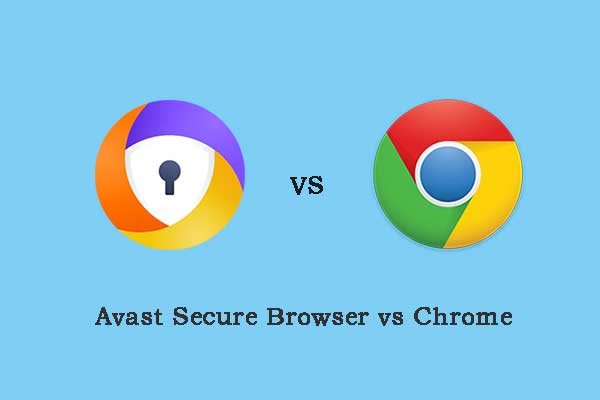
If you want to learn information about Avast Secure Browser vs Chrome, this post satisfies your demands. Keep on your reading.
Safari vs Chrome: User Interface
The first aspect of Safari vs Chrome is the user interface. Both Safari and Chrome are beautiful and easy to use. Their differences mainly come from their respective ecosystems.
In Safari, you’ll find a grid layout that makes it easy to find any tab on the desktop in seconds. However, Safari turns its tabs into a deck of cards on mobile, requiring you to swipe through an endless list. You can only see the top of each tab, which can be confusing if you have multiple tabs open from one site.
Google Chrome is designed to be the centerpiece of ChromeOS and generally handles more tasks. It works better with a lot of tabs open and can manage a lot of bookmarks efficiently. You can even quickly switch between work and home profiles (or others in your house), and all preferences are automatically adjusted.
This, in this aspect, they make a tie. Users who don’t like clutter will find Safari more appealing, while power users will find Chrome easier to manage.
Related post: How to Switch Tabs in Chrome | Switch Tab Shortcut
Safari vs Chrome: Features
The second aspect of Safari vs Chrome is the feature.
One of the great things about Safari is its integration with the Apple ecosystem. If you have an iPhone, you can instantly open the same tabs on your Mac through iCloud tabs. You can also confirm online purchases in Safari using your Mac’s Touch ID and Face ID technology. One of Safari’s best features is its Reader Mode, which lets you define your own reading experience with custom backgrounds, fonts, and text sizes.
If you have an Android device or use a Windows OS (Windows doesn’t have Safari), Chrome is a better fit. It also works seamlessly with Chromecast, so you can easily stream anything from your computer to your TV. Additionally, Chrome is tightly integrated with other Google apps like Google Translate, allowing you to translate any webpage into any language in seconds.
In short, Apple users may prefer Safari, while international Android users prefer Chrome.
Safari vs Chrome: Performance & Speed
Then, let’s see Google Chrome vs Safari in performance and speed. With each release of macOS, Apple has integrated Safari more deeply into its system, making it faster and more resource-efficient. If your device is underpowered, Chrome may not run smoothly. Due to its huge resource-intensive nature, it not only slows down the device but also drains the battery.
Safari vs Chrome: Security & Privacy
This part is about Safari vs Chrome on Mac of security & privacy. Both Safari and Chrome use Google’s Safe Browsing database to protect users from phishing and malware. They also both offer password management capabilities.
If you use Google’s Password Manager or Safari’s iCloud Keychain, you’ll also benefit from Dark Web Monitoring, which uses data analytics to alert you to data breaches and exposures of your passwords and email addresses.
Google Chrome, on the other hand, does have strong phishing and malware protection and gets security updates almost every week, while Safari is usually updated annually, with the occasional mid-term patch.
Safari vs Chrome: Which One to Choose?
After knowing the differences between Safari and Chrome, you may wonder which one to choose.
Safari is limited to Apple devices, so it’s the best option for those who use multiple Apple devices for a great cross-device experience. However, if you have one Apple device and another Windows or Android device, then Chrome may be a better choice as it works on all platforms. While Safari is Apple’s default browser, you can change it on iPhone and Mac.
Notably, Safari is better optimized for iOS, iPadOS, and macOS. It consumes fewer resources and optimizes the battery life of Apple devices. Plus, a customizable start screen that syncs between your devices, support for iPhone extensions, and a focus on privacy make it my go-to when working in the Apple ecosystem.

How to free download Chrome Enterprise 32/64 bit for Windows and Mac? This post provides a step-by-step guide for you.
Final Words
Safari vs Chrome: what’s the difference between these two web browsers? This post is helpful for you and you can know much information. Just choose a proper browser based on your needs to use.
About The Author
Position: Columnist
- Home New Posts Forum List Trending New Threads New Media Spy
- WikiPost Latest summaries Watched WikiPosts
- Support FAQ and Rules Contact Us
Which one is better for Safari or Chrome?
- Thread starter mikezang
- Start date Apr 3, 2024
- Tags browser chrome safari
- Sort by reaction score
macrumors 6502a
- Apr 3, 2024
I am using Sonoma 14.4.1 by OCLP on my Mac mini (Late 2009), I use Chrome as my default browser, do I have to use Safari in my case? Is Safair faster than Chomre?
Contributor
“Faster” to do what? Render specific web pages? Execute JavaScript? There are browser benchmark tests if question is academic.
I want to know which one is better in general...
It is preference. Using browser like having opinion.
arinamichel911
Macrumors newbie.
- Apr 4, 2024
Privacy matters most for me, yeah safari is better than Chrome
macrumors demi-god
I avoid Google products, so I use Firefox and Safari. But, to be fair, probably all web developers make sure their code works on Chrome since its market share is so large. So, if you have a problem with a website, switching to Chrome will usually fix it. But, I certainly wouldn't use Chrome full time since Google is such a reprehensible company.
coffeemilktea
Chrome might be a better browser overall, if for no other reason than it has proper extensions support, unlike Safari. That said, you might be better off with Firefox, which runs better on older hardware (and also has amazing extension support).
macrumors member
mikezang said: I want to know which one is better in general... Click to expand...
macrumors 68000
Neither, I prefer Firefox. Better privacy than chrome, better compatibility with websites than safari, less of a memory hog as compared to chrome, well maintained, and great compatibility with plug-in.
macrumors regular
- Thursday at 12:28 AM
Yep, Firefox all the way for me as well. Brave is also a nice alternative nowadays. Opera has some interesting features. Chrome I only use for development testing. Personally I wouldn't touch Safari with a 10-foot pole. And I never do if I can help it.
Chrome Vs. Edge: Which Chromium Browser Is Best In 2024?
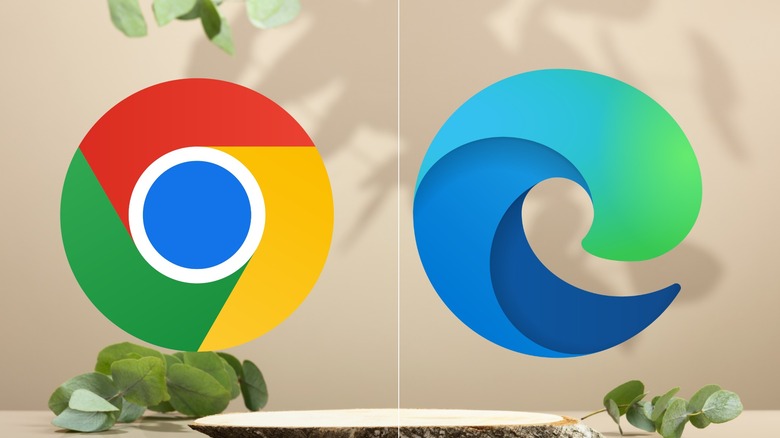
Most people who use the internet are familiar with Chromium — at least in passing. The Chromium project is one of the most impactful code bases in computer history, as it became the platform for Google's Chrome browser. But as Chrome skyrocketed in popularity, other browsers followed suit, adopting Chromium as well. Today, browsers from Arc to Vivaldi are based on Chromium, making it the closest thing to a universal standard for web browsers.
The latest browser to make the jump to Chromium was surprisingly Microsoft Edge, which soft relaunched in 2020 as essentially a brand-new product. It was based on Chromium, but with additional features from Microsoft. While the upgrade didn't move the needle for Edge's market share very far, those who do use Microsoft's browser have come to love the "best of both worlds" approach, with many claiming Edge is now superior to Chrome. However, when we polled our readers in 2022 on their browser of choice , only 6% preferred Edge, whereas 56% said they regularly used Chrome.
Many believe the strong dislike of Edge is due to aggressive OS-level advertisements from Microsoft that push users toward its product, and invokes the bitter history of Microsoft's past attempts at web browser dominance.
So, is Edge the browser you should use to download Chrome, or the one you use day-to-day? Comparing both browsers reveals quite a lot about where the internet is headed, and the real reason Microsoft decided to join the competitor it couldn't beat.
What is Google Chrome?
Since 2013, Google Chrome has been the world's most popular web browser. While it is built atop open-source code from The Chromium Project, Chrome is Google's proprietary software, with Google-specific features developed and maintained by the company. By now, Chrome's dominance is so widespread that its standards have increasingly become the default for web application design. Today, a great many webpages render best on Chrome, and some even warn against using other browsers to access them. Google's browser commands 65% of the worldwide market, and aside from Apple's Safari, none of its competitors surpass about 5%.
Chrome's success is even more incredible when you consider the uphill battle Google had to fight against Microsoft and Apple in the push for mass adoption. The two companies effectively form a duopoly on the desktop OS market, and each has its own proprietary browser: Safari for macOS, and Internet Explorer, and later, Edge, for Microsoft. Even Firefox, currently with only a 2.8% browser share, had 30% of the market in 2011. But people flocked to Chrome for a slew of features previously confined to niche browsers — such as the omnibox that combined search and URL functionality, and a modular tab system that made the competition look dated.
But a decade after it beat the odds to win the hearts and minds of Internet citizens everywhere, is Chrome still king, or is it starting to show its age? No longer is Google's browser the only one to run Chromium, either, and it has powerful competition from a longtime player in the browser wars: Microsoft.
What is Microsoft Edge?
For years after it unseated Internet Explorer as the people's browser of choice, Microsoft pushed against the tide of Chromium. The Redmond giant had been the villain of the browser wars since the late 1990s, when Microsoft drew the ire of the Department of Justice for anticompetitive behaviors alleged to have caused the untimely demise of Netscape. But their efforts hardly mattered. Internet Explorer was so reviled that Chrome had an open lane down center court. In an effort to right ship, Microsoft released a new browser called Edge alongside Windows 10 in 2015. Despite its marked improvements, it was still built on a proprietary engine, and most users continued to distrust or disregard it.
In 2018, a defeated Microsoft made an uncharacteristic announcement: Edge would be redeveloped from the ground up using Chromium, with Microsoft developing extra features for the relaunched browser. It's probably not coincidental that, around the same time, the company was putting Windows Phone out to pasture and beginning to develop Android phones. Early in 2020, the stable build of the new Edge was released.
Since updating to Chromium, those who have switched to Edge have praised it, and many even stick with it. But it hasn't drastically moved the needle for adoption, with only 5% of the global browser market at the time of writing.
Nonetheless, many browser enthusiasts see Edge as the best competitor to Chrome and will even claim that Edge outperforms Chrome on several key metrics. Is Edge secretly supreme, or is Chrome the champion for a reason? Let's dive in and find out.
User interface
Because both Chrome and Edge are built on Chromium, they have similar user interfaces by default. Across the top are your tabs, under which lies the omnibox in line with navigation buttons, extensions, and overflow menus. Below is the bookmark bar. Taking up the majority of the screen is the content window in which webpages are displayed. Both Edge and Chrome get cluttered quickly if extensions aren't properly managed.
Microsoft has clearly put a lot of work into its version of Chromium, and that affects the UI for better or worse. You can enable vertical tabs to move all your pages from the top of the browser to the left-hand side. Once you get used to them, vertical tabs can make horizontal tabs feel clunky. On the downside, Microsoft stuffs Edge full of UI elements that often feel like bloat. Most of these, like the right-hand toolbar that lets you run mobile versions of websites alongside tools like a calculator, can be disabled in settings.
Then there's Copilot, Microsoft's ChatGPT-powered chatbot, and how you feel about it will depend on whether you're someone who finds AI useful. The Copilot button is scaled larger than other icons, and is aesthetically jarring, plus, it takes a central place at the top right of the browser, exactly where you'd expect the overflow menu to be. If you're clicking the Copilot button a lot, maybe you'll find the implementation convenient. If not, you'll want to disable it in settings.
Chrome and Edge are to the Chromium user interface as Coke and Pepsi are to cola: essentially identical, but just different enough to be distinct.
You can build a feature-packed and easy-to-use browser, but none of that will matter if it can't render a webpage quickly. According to research from Google , more than half of users will give up on a website that takes more than three seconds to load. Three seconds may seem like a trivial amount of time, but when staring at a slowly rendering webpage, it feels like ages. Google is well aware of these dynamics, but over the years, Chrome has become something almost like a second operating system for your computer. It runs a host of webapps, and has developed a lot of baggage that slows it down. Is Edge any leaner and meaner, or does it perform like Chrome wearing a Microsoft trench coat?
While the two were almost neck and neck, Edge did generally outperform Chrome in our BrowserBench benchmark tests. In Speedometer, Chrome averaged a score of 15.2, while Edge scored an average of 17.5. In JetStream, Chrome scored its big win: 269.59 against Edge's 262.342. But in MotionMark, which tests graphical performance, Edge pulled out far ahead with a score of 912.6 against Chrome's 806.4. Chrome appeared to use more RAM than Edge in our tests, which hands Microsoft's browser the overall edge-vantage, most notably for those who want to run other programs alongside the browser in their workflow.
Looking at tests from other outlets, results are consistently close. What's clear is that both browsers are among the fastest on the market. While Edge was, for a time, faster than its elder sibling, the two now trade places frequently as they get updated. It's safe to say the two are tied for performance.
When it comes to features, Edge seems designed to flex on the competition, and this is the category in which Chrome takes the biggest backseat to Microsoft's efforts. From shortcuts to tabs, Edge has extra bells and whistles. It appears that Microsoft's strategy is to beat Chrome by making it look comparatively paltry.
Let's start with Edge's greatest strength: tab management. Chrome and Edge both let you rearrange, group, and pin tabs, but Microsoft takes things a step further by letting you switch to vertical tabs, which places them along the left-hand side to free up browsing space. It's one of those features you don't realize you can't live without until you try it because it seems so obvious once you experience it. But whether vertical or horizontal, Edge has more options for tab management, including an AI grouping tool that will sort them all into categories based on content. Chrome offers a similar tab organization feature , but it got things wrong more often than Edge in our tests.
Edge's reading mode also bests Chrome's. Chrome's reader is inexplicably relegated to a sidebar on Chrome's right-hand side , whereas Edge's takes center stage and includes an AI text-to-speech feature that turns any article into an impromptu podcast. And split-screen mode , another Edge-only feature, is helpful for the odd product comparison or research session.
Both browsers have password management, and here, Chrome is far better simply because it syncs more reliably to mobile. Change a password on desktop Edge, and, based on my own experience, there's a coin flip of a chance it'll show up on your phone next time you need it.
Security and privacy
The unfortunate truth is that both Microsoft and Google love to gorge themselves on user data. However, Google is currently in the process of implementing some potentially game-changing adjustments to the way Chrome collects data. That's because the search giant is doing away with cookies — the ubiquitous tracking files that websites install on your browser — in favor of a system it calls Tracking Protection. In simple terms, Google will collect data from you, then dole it out anonymously to websites you visit. Critics have claimed it's an attempt to further leverage Google's dominant position in data-based target advertising, embedding Google even deeper as an intermediary between users and advertisers, while proponents say fewer entities in total will have access to your data. If Tracking Protection is successful, don't be surprised to see Edge implement a similar system. For now, most Chrome users do not have Tracking Protection. It is being rolled out in batches.
Edge may not be shifting the way Internet privacy works, but it does come with more granular privacy controls and extra security tools. There's a VPN client, which is great for those who don't already have a preferred VPN service, though Microsoft will still see your traffic. Also built in is some protection from malicious sites with Microsoft Defender SmartScreen. Of course, both browsers can be further enhanced with privacy and security extensions from the Chrome Web Store.
While both browsers are about as secure as possible, neither are great recommendations for the truly privacy conscious.
Customization
Because everyone's web browsing habits are different, there's no such thing as a one-size-fits-all browser. The more customizable a browser is, the more likely it is that you'll be able to find a configuration that fits your workflow. But the trade-off to customizability is confusion, as having too many options has the potential to overwhelm new users.
Both Chrome and Edge keep the most technical customization options hidden away in Flags , where the average user won't find them, and both browsers have so many flags that it's safe to call things even — especially since many are meant for the most nerdy edge cases. What really matters is the more surface-level customization, and that's where Edge takes the, um, edge. The Appearance section of Edge's settings is granular compared to Chrome's, allowing nearly every UI element to be shown or hidden.
Many Chrome users love its endless extensions, which are available via the Chrome Web Store, and because Edge is also built on Chromium, it can run nearly all the same extensions without any friction. Both browsers also let you manage those extensions, enabling and disabling them or rearranging which ones display their shortcuts alongside the omnibox.
Knowing Microsoft, you also might expect for Edge to lock users into Bing. But while Bing is the default search engine, it's easy to switch over to Google or DuckDuckGo with a few clicks in settings. Of course, Google is the default on Chrome, but that's also easily changeable.
Both browsers have themes, although Chrome has far more options through the web store. Again, Edge supports these as well.
Mobile apps
If it's not the app you use most across desktop and mobile, your web browser is certainly among the most used. That's why both Chrome and Edge offer mobile apps to complement their desktop offerings, so you can keep your bookmarks, web history, passwords, and more synced across devices.
When it comes to Chrome, the mobile version is a no-frills app that still includes the most necessary features like Incognito Mode, page search, and tab management. On the other hand, Edge takes a more maximalist approach on mobile, bringing over some of its most innovative desktop features. Reading mode is here to save you from playing Whack-A-Mole with advertisements, and Drop lets you send text and files between your devices. Additionally, the Edge app can scan pages for downloadable files or add them to collections. Oh, and Microsoft Copilot is also on board for anyone who's into AI features. But the Edge app's most welcome surprise is that it has Adblock Plus built in.
There's no doubt that the Edge app can feel a bit cluttered at times, but it's definitely the better option for people who don't mind mastering interfaces. With that said, Chrome is an extremely clean experience on mobile, making it appealing for those who simply want to browse the web without much fuss.
Odds and ends
Finally, let's address a few odds and ends that don't fit neatly in another category, beginning with the new tab experience.
Microsoft's impulse to treat any blank space as a place to shove junk unfortunately cannot be curtailed, and the default Edge home page is a cluttered mess of spam news. Thankfully, this can be cleaned up quickly by disabling the news feed in settings. Additionally, every time Edge adds a new feature that's more invasive than useful — such as the built-in e-commerce coupon tool, which may actually be a reason not to use Edge at all — you'll have to take time to disable it, which can grow frustrating over time.
Meanwhile, Chrome's general apathy toward meaningful change makes it feel comparatively stale. Microsoft's approach may be occasionally annoying, but at least it consistently adds new features to Edge, some of which are useful. It's hard to recall the last time Chrome got an update that made the user experience significantly better. If you love what Chrome already offers, that's fine. If not, you'll probably feel wanderlust for a change of pace.
Verdict: Edging out the competition
In a showdown between browsers from two of the most mammoth tech companies on the planet, the slight advantage goes to Microsoft Edge, reifying our findings from the same comparison in 2022 . While Chrome remains a reliable, stable, speedy, and secure browser, Edge's efficiency and more robust feature set across desktop and mobile, along with its better implementation of AI, make it the champion for the majority of those choosing between the two in 2024.
Edge shortfalls are in its sync capabilities, which can be spotty when it comes to keeping passwords updated across devices, and it also falls behind in the privacy category. Although neither browser scores well on privacy, Google is trying new ways of managing user data, while Microsoft continues the same old data sponging. And the two browsers tie when it comes to security. Truly, it's the slightly speedier performance, better memory efficiency, and innovative feature additions that give Edge the edge in this head-to-head.
With enthusiast features like vertical tabs, split-screen, Collections, and Drop, Edge simply provides more value than Chrome out of the box. Additionally, Microsoft's GPT-4 powered Copilot is better at features like AI tab grouping and webpage summary compared to Chrome's lackluster AI tools, which the browser still labels as experimental. And since you can use all your Chrome extensions on Edge, it's hard to find a deal-breaker for Microsoft's Chromium implementation. It essentially presents as "Chrome on steroids," which is a hard deal to pass on.
Testing methodology
This comparison was conducted after extensive lifestyle testing of both Google Chrome and Microsoft Edge, each of which was used as my exclusive browser across all my devices for one week. For speed comparisons, both browsers were tested with Speedometer 3.0, JetStream, and Motion Mark. Tests were run under identical conditions, and each test was run multiple times, with the average of those tests used to calculate an overall score.
More From Forbes
Google issues new chrome security update for desktop users.
- Share to Facebook
- Share to Twitter
- Share to Linkedin
If you’re one of Chrome’s billion-plus users on Windows PCs, then another update warning has just been issued to update your browser as soon as you can...
Chrome update now warning issued for Windows users
While Microsoft tries to push its Edge browser, it’s Google’s Chrome that continues to dominate the desktop market, as the default for a billion-plus Windows users. And those users need to ensure Chrome is updated, after the latest warning this week.
Stable channel 123.0.6312.122/.123 includes three fixes for high-risk memory safety vulnerabilities; you might have seen an acknowledgment earlier in the week that all serious Chrome vulnerabilities seen in the wild “started out with a memory corruption vulnerability.” And so no surprises here.
The three vulnerabilities were all found by external researchers, with each receiving a modest $10,000 to $20,000 payout. This is business as usual, not the highly sophisticated zero days that generate bigger headlines and rewards. One of the vulnerabilities is a use after free vulnerability—where freed up memory can still be addressed, the others relate to graphics rendering, one via the GPU.
Best High-Yield Savings Accounts Of 2024
Best 5% interest savings accounts of 2024.
These are interesting times for Chrome on the security front. In warning of those expansive memory threats, Google has introduced a beta V8 (JavaScript engine) Sandbox which, it says, should “prevent memory corruption in V8 from spreading within the host process... a necessary step towards memory safety.”
Very welcome. And equally welcome was the news earlier in the month, that Google has found a way to address cookie theft, an increasingly well used means to bypass 2FA by hijacking authorized sessions. My colleague Davey Winder reported on some of the attacks emanating from this vulnerability earlier today.
This is also mainly a Chrome on Windows issue, and the proposed solution is so-called Device Bound Session Credentials (DBSC), which means linking those session cookies to a device ID. Stealing the cookies will be pointless, unless you’re lifting the PC at the same time. “DBSC aims to disrupt the cookie theft industry since exfiltrating these cookies will no longer have any value,” Google explains.
It’s only two weeks since Google issued its last critical security fix for Chrome, along with a serious warning that users could be vulnerable to maliciously constructed webpages exploiting (another) memory vulnerability on their PCs
Google has not provided any indication that the latest vulnerabilities have been exploited in the wild, but users should still update their browser as soon as it’s available to them—if not already. I always take the view that once such issues are made public, even in a limited fashion, the risks increase. Threat actors know how long some users will take to update their platforms. Don’t be one of them...
- Editorial Standards
- Reprints & Permissions
How-To Geek
How to permanently disable incognito mode in your browser.
Deactivate private browsing mode.
Quick Links
Turning off vs. disabling incognito mode, how to disable incognito mode in chrome for windows, how to disable incognito mode in chrome for macos, how to disable private browsing in safari on iphone and macos, how to disable inprivate mode in edge for windows, can you disable private browsing in firefox, key takeaways.
- You can turn off private browsing in Chrome on Windows and macOS by running a command in Command Prompt and Terminal.
- In Microsoft Edge, you can turn off private browsing through Registry Editor. Unfortunately, there's no native way to turn it off in Firefox.
- You'll need to adjust content restriction settings to turn off private browsing mode in Safari on macOS and iOS.
If you share your phone or computer with children or minors and want to monitor their browsing activity, consider turning off the private browsing mode. Let's explore how you can turn it off in Google Chrome for Windows and macOS, Microsoft Edge for Windows, and Safari for iPhone and macOS.
If you've opened private browsing mode and only want to leave it, turning it off is simple in all major browsers on desktop and mobile devices . Just exit the browser completely, and you'll be out of incognito mode the next time you open it.
However, if you want to completely disable incognito mode to prevent others from using it on a device, you'll need to turn it off permanently, and that has a few more steps involved.
To turn off private browsing mode in Chrome on a Windows device, type CMD into the Windows Search bar, right-click the "Command Prompt" app, and select "Run as Administrator." Ensure you run the Command Prompt utility with administrative privileges to avoid encountering errors while turning off private browsing mode.
Once you've opened Command Prompt as an administrator, copy and paste the following command into the window, and then press the Enter key:
After executing this command, exit the Command Prompt window. You should now see that Incognito mode has been disabled (grayed out) in Chrome.
If you decide to re-enable private browsing later, use the above command again in Command Prompt, but replace the "1" with "0," like so:
To turn off private browsing in Chrome on a macOS device, first launch Terminal . Press Command+Space to open the Spotlight search window. Then, type Terminal and double-click "Terminal" in the search results to open it.
In the Terminal window, enter the following command:
Press Enter after typing the command.
After executing the command, close the Terminal window. You'll find that private browsing mode has been turned off in Chrome.
Safari doesn't offer a direct option to turn off private browsing mode. However, by adjusting content restrictions for web content, you can disable Safari's private browsing mode on both iPhone and macOS.
Disable Private Browsing on an iPhone
To adjust these permissions on an iPhone, open your device's settings and tap "Screen Time." If Screen Time isn't enabled, tap "Turn on Screen Time," then tap "Continue" on the following page to activate it.
Next, set up a passcode for Screen Time to prevent your child from making unauthorized changes. To do this, tap on "Use Screen Time Passcode," set a passcode, and confirm it on the next page. This will protect Screen Time with the passcode.
Now, navigate to "Content and Privacy Restrictions." Enable the toggle next to "Content and Privacy Restrictions" and tap on "Content Restrictions." You may need to enter the passcode to access the content restrictions settings.
In this menu, tap "Web Content" and select "Limit Adult Websites" from the available options. Once done, exit this menu, and you'll notice that the private browsing option is no longer available in Safari.
Disable Private Browsing on a Mac
To turn off private browsing mode on a macOS device, open System Preferences from the Dock, navigate to "Screen Time" in the left sidebar, and, under Restrictions, open "Content and Privacy" settings.
Enable the toggle next to Content and Privacy. Then, open the "Content Restrictions" settings and select "Limit Adult Websites" from the Access to Web Content menu. Once selected, click "Done" in the bottom-right corner.
Upon returning to Safari, you'll notice that the "New Private Window" option has now been grayed out, indicating that the private browsing mode has been successfully disabled.
If you use Microsoft Edge as your default browser on a Windows device, you can turn off private browsing mode via Registry Editor.
To open Registry Editor, press Win+R, type regedit , and press Enter. Then, click "Yes" in the User Account Control (UAC) window.
In the Registry Editor, navigate to HKEY_CURRENT_USER > Software > Policies > Microsoft > Edge.
If some of these keys don't exist already, you can create them by right-clicking and selecting New > Key. Then, rename the key accordingly.
Select "Edge," right-click in the right pane, select New > DWORD (32-bit) Value, and name it InPrivateModeAvailability . Double-click the value, set the Value Data to "1," and click "OK."
Now, close the Registry Editor and restart your Windows PC.
Misconfiguring Registry Editor can lead to severe consequences. Make sure to follow the above steps carefully when tweaking the keys. For added safety, you can make a backup of the Registry. .
Unlike other browsers, there's no browser or operating system-level solution to turn off private browsing in Mozilla Firefox. The only available method involves using an extension that turns off private browsing. However, due to the associated risks with third-party extensions, we strongly advise against using them.
If you use Firefox as the default browser, remove it from your computer, set Chrome or Edge as your default browser, and turn off private browsing for them. If you have a Windows laptop, you can use Microsoft's Family Safety app to restrict access to any browser other than Edge. Also, you can implement content filters within Edge to disable access to inappropriate content.
You can now prevent your child or other users from browsing privately.
While the above methods will turn off private browsing in browsers, keep an eye on your child whenever they browse the web. They may find ways to work around these restrictions.

IMAGES
VIDEO
COMMENTS
Chrome maintains its longtime lead on this test with a score of 528. Edge, Opera, and other Chromium-based browsers hew closely to Chrome. Firefox and Safari bring up the rear, at 515 and 468 ...
Safari and Chrome are two popular choices on Apple devices, each with strengths and weaknesses. In this blog, I will compare Safari vs. Chrome to help you decide which browser is better for your iPhone and Mac. Let's dive into the differences! Safari vs. Chrome - User Interface. Safari is designed to blend seamlessly with Apple's ecosystem.
Click to open the app in the menu bar. Select Google Chrome. Check "Slow down this app if it uses more than". Choose the percentage (e.g. 10%) Verdict: Safari is definitely the speedier and more lightweight browser of the two. But if you need to use Chrome, its desire for more RAM and CPU can be mitigated with App Tamer.
Safari vs Chrome in 2024: Performance, Speed and Features Compared. Safari and Chrome are two of the biggest players in the browser world. While Safari comes ready-to-go on Apple devices, that ...
Safari vs. Chrome: Final Thoughts. We looked at four main comparison areas in our Safari vs. Chrome review. In conclusion, each browser won on two sections, making for an overall tie. This is reflective of our experience with Safari and Chrome. Both are good web browsers that offer a great user experience and strong privacy and security features.
When it comes to smooth JavaScript execution, Chrome is in the top spot with Safari a close second. Safari, according to the MotionMark testing, handles complex web pages better than any other ...
Using Safari vs Chrome on Mac: how to choose? Now, let's proceed with the comparison between the two browsers to help you decide which one is better. Main benefits of each. Safari's biggest benefit is that it's tightly integrated into macOS. That means that it works really well with features like Handoff, Share Sheet, iCloud Keychain, and ...
Google Chrome leads the web browser market with a 64.68% share, according to Statcounter. Apple Safari follows with 18.29%, Edge at 4.23%, Mozilla Firefox at 3.01%%, and Opera at 2.25%. Internet ...
Pros: Google Chrome for Mac Computer. Google Chrome has significantly more extensions than Safari; these can help improve privacy, save you money online shopping, and more. Google Chrome can run on all operating systems, while Safari is not an option for Linux users. Chromecast or Google TV users can enjoy direct casting from Google Chrome.
The browser has a Reader mode, which removes ads and other distractions from web pages for a more immersive reading experience. Safari also has a Private Browsing mode, which prevents the browser from saving browsing history, cookies, or other data. In conclusion, both Google Chrome and Safari offer user-friendly interfaces that prioritize ease ...
Yes, Safari is known for using less battery than Chrome. It's optimized for energy efficiency, especially on Apple devices, making it a preferred choice for users looking to maximize battery life. Chrome, while feature-rich, tends to consume more power, which can lead to faster battery drain.
This makes it easy for users to switch between devices without having to relearn the browser's layout and features. Overall, both Safari and Google Chrome offer unique approaches to user interface and design. While Safari prioritizes simplicity and elegance, Google Chrome emphasizes ease of use and consistency.
Both browsers block popups by default, but Chrome goes a step further to point out when you venture to an unsafe site. It displays a Not secure warning as well as a small popup window. Safari, on ...
Safari RAM: Pros. Faster performance: With more RAM to spare, Safari can store more data in memory, making it faster to access and load websites and web applications. Better multitasking: By using less RAM, Safari can handle more open tabs and processes at the same time without slowing down. Improved stability: Safari is less likely to crash or freeze when running memory-intensive applications ...
Safari offers better hardware-software integration, which is no surprise since it only works on Apple devices. On average, it loads websites 50% faster than Chrome and lasts 1.5 hours longer when browsing or streaming videos. This is because Safari uses minimal RAM while running compared to Chrome.
3.0 Good. The default Mac and iOS browser is a strong choice, though its interface has some nonstandard elements. Safari was a forerunner in several areas of browser features. For example, it was ...
Safari's user interface impresses with a clean layout, while Google Chrome offers more customization options in its Material You makeover. Safari's memory usage advantage over Chrome on Mac with ...
Safari Comparison Summary. This is the default browser that comes with mac devices, and has existed for over a decade. With Safari, you're not going to get anything too cutting-edge or innovative, because they, like Google Chrome are focused on stability for their 1+ billion users. For a further breakdown in understanding the negatives that ...
Google Chrome vs. Safari: The Verdict. Overall, Safari is likely the better fit for macOS. This browser offers a range of useful security features and a number of perks over Chrome due to its streamlined suitability for macOS devices. But if you're not a fan of Safari, you can still rely on Chrome on your macOS devices for useful features and ...
Safari Is Better Than Chrome, Actually. It's better than Arc, too. Sorry. Justin Pot. April 12, 2024. Credit: Apple. Mac users tend to overlook Safari, which I understand: It seems, at first ...
Safari vs Chrome security showdown. Security is paramount for all internet users. Safari and Google Chrome recognize this and have implemented robust measures to ensure a safe browsing environment. Google Chrome boasts a suite of security features designed to shield users from various online threats. A key component of Chrome's security ...
However, if you have one Apple device and another Windows or Android device, then Chrome may be a better choice as it works on all platforms. While Safari is Apple's default browser, you can change it on iPhone and Mac. Notably, Safari is better optimized for iOS, iPadOS, and macOS. It consumes fewer resources and optimizes the battery life ...
Safari is the default browser on all iOS devices as it's optimized for Apple's hardware and software, but nothing is stopping you from using Chrome. Safari is more secure and privacy-friendly than Chrome, but Chrome is faster and offers enhanced performance. It's the security showdown: Chrome vs. Safari. We compare features and ...
Nov 25, 2022. 827. 3,383. Apr 4, 2024. #7. Chrome might be a better browser overall, if for no other reason than it has proper extensions support, unlike Safari. That said, you might be better off with Firefox, which runs better on older hardware (and also has amazing extension support).
In Speedometer, Chrome averaged a score of 15.2, while Edge scored an average of 17.5. In JetStream, Chrome scored its big win: 269.59 against Edge's 262.342. But in MotionMark, which tests ...
And those users need to ensure Chrome is updated, after the latest warning this week. Stable channel 123..6312.122/.123 includes three fixes for high-risk memory safety vulnerabilities; you might ...
Press Command+Space to open the Spotlight search window. Then, type Terminal and double-click "Terminal" in the search results to open it. In the Terminal window, enter the following command: defaults write com.google.chrome IncognitoModeAvailability -integer 1 z. Press Enter after typing the command.